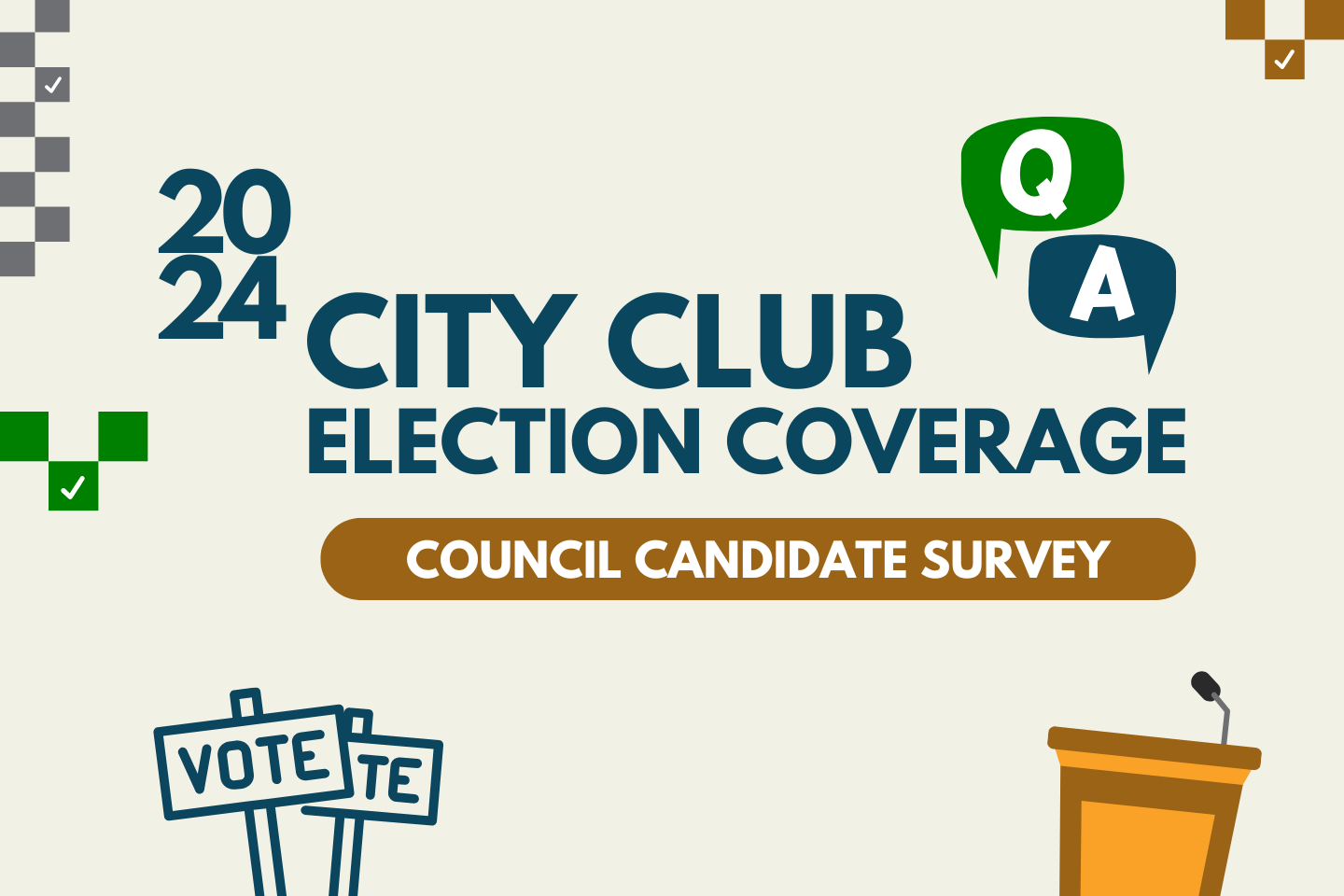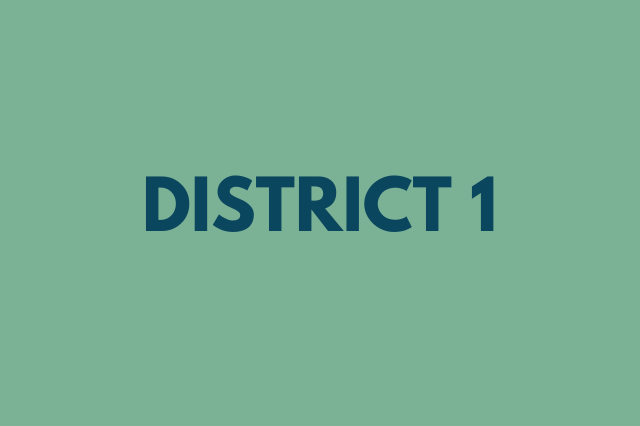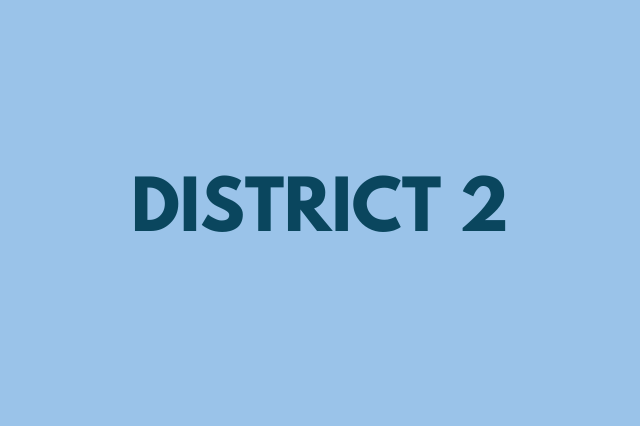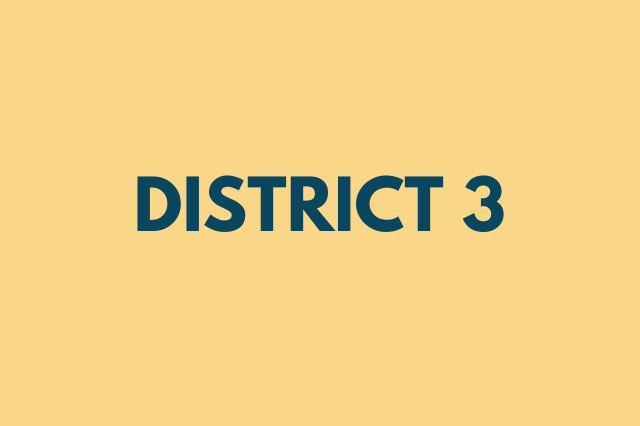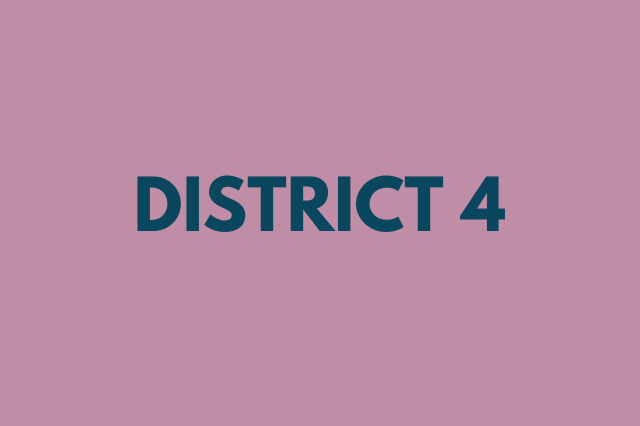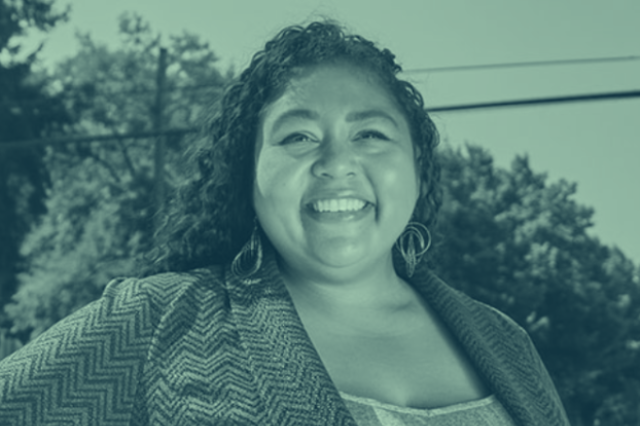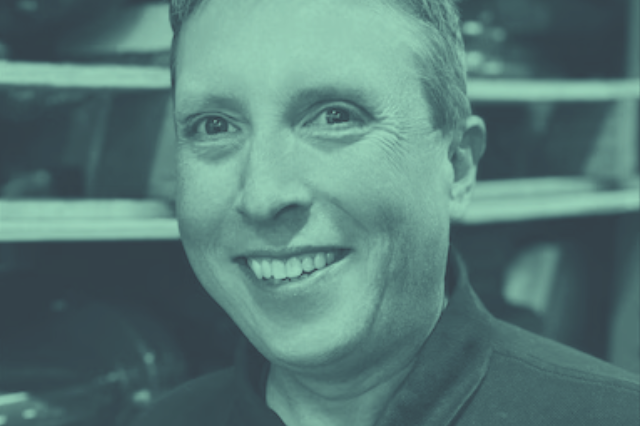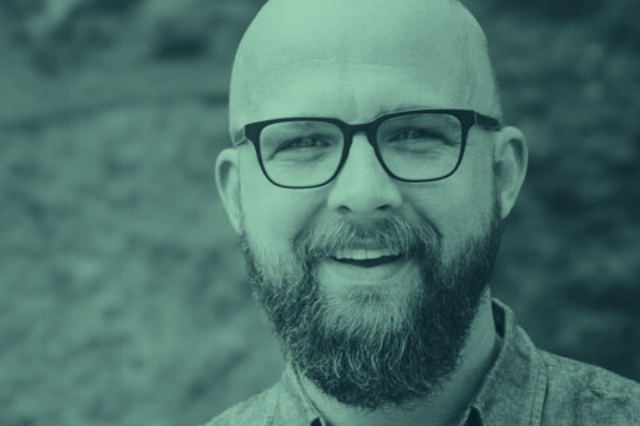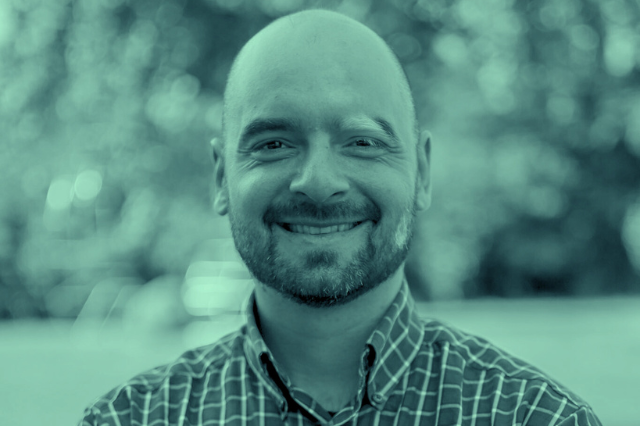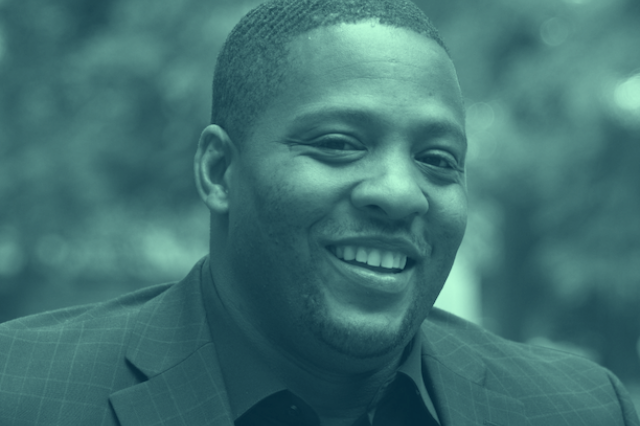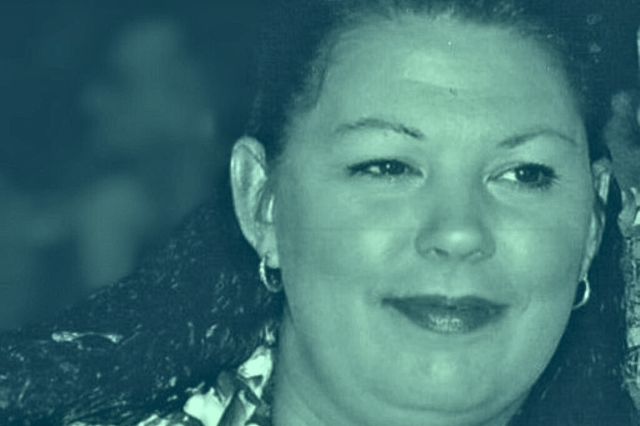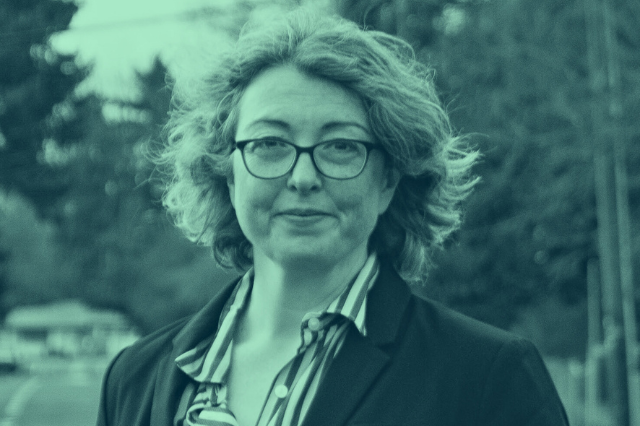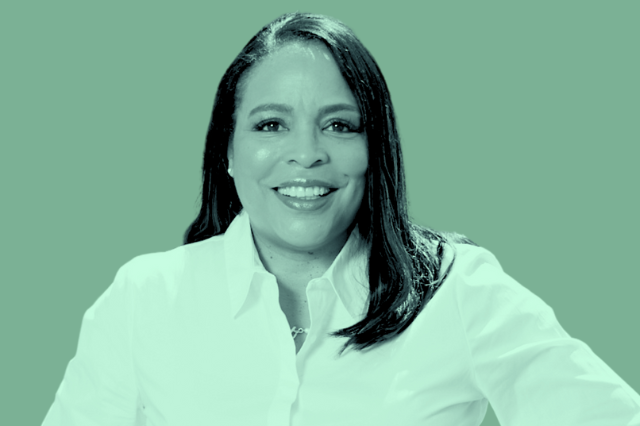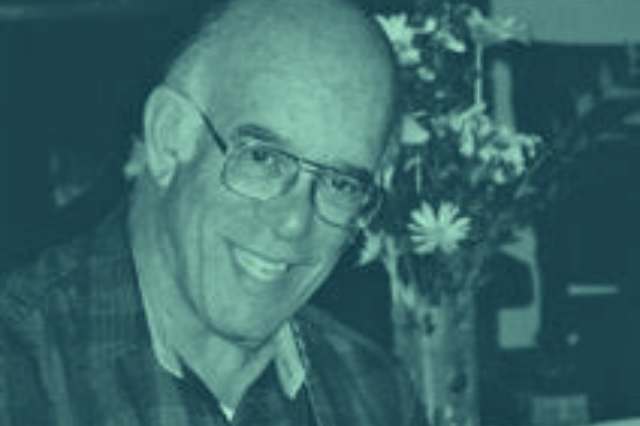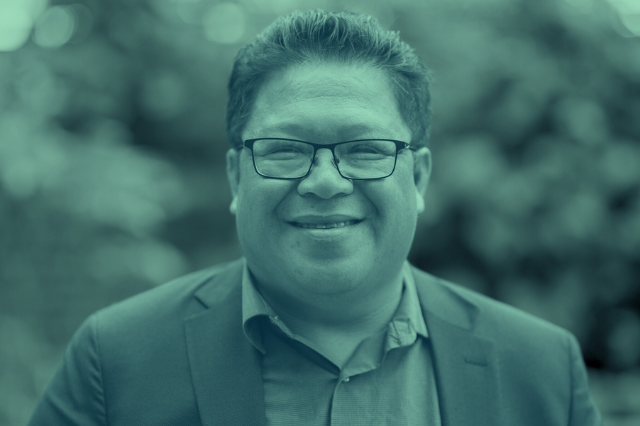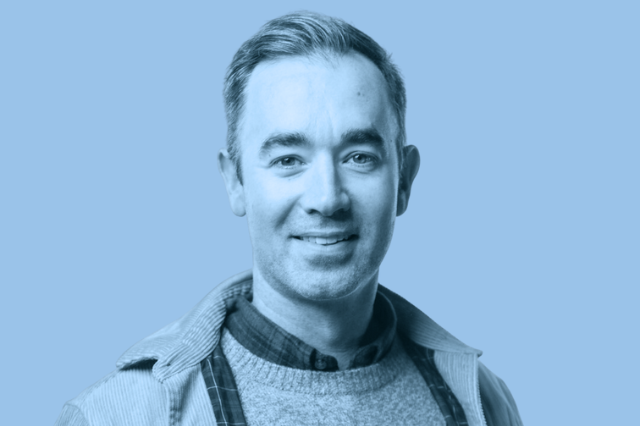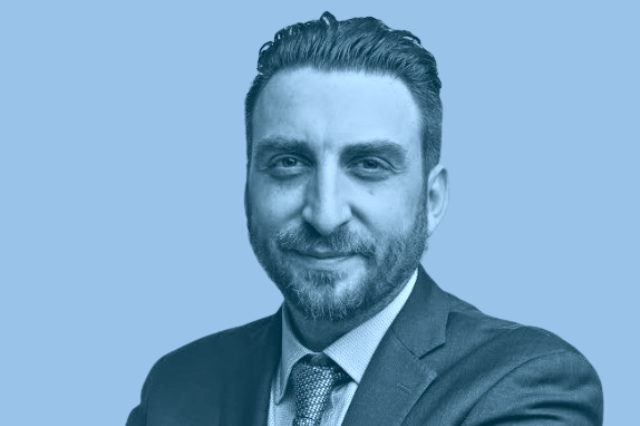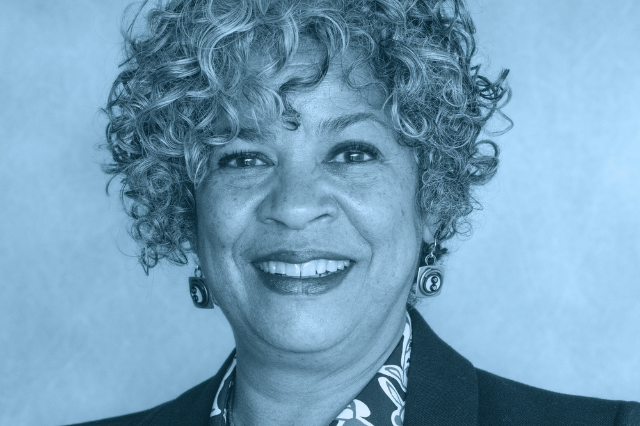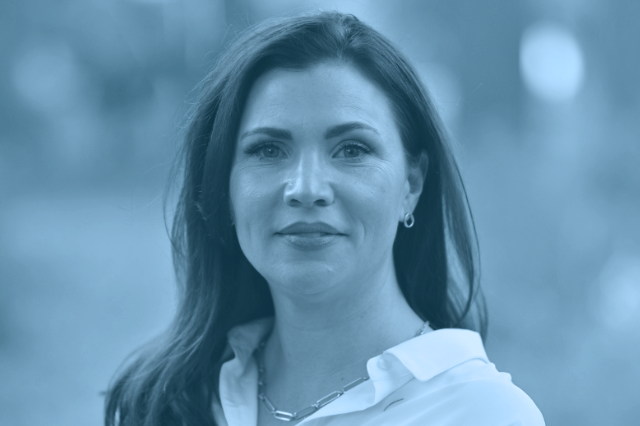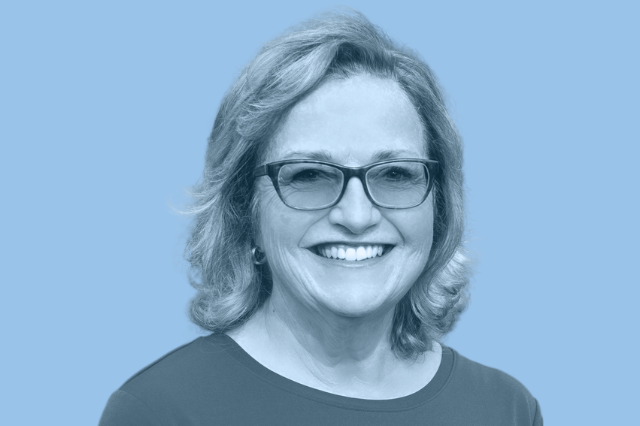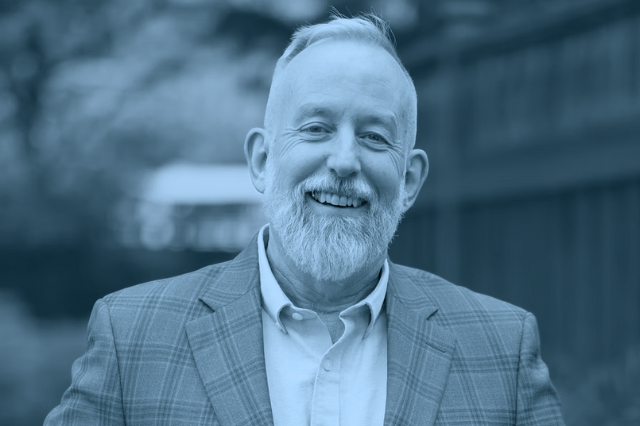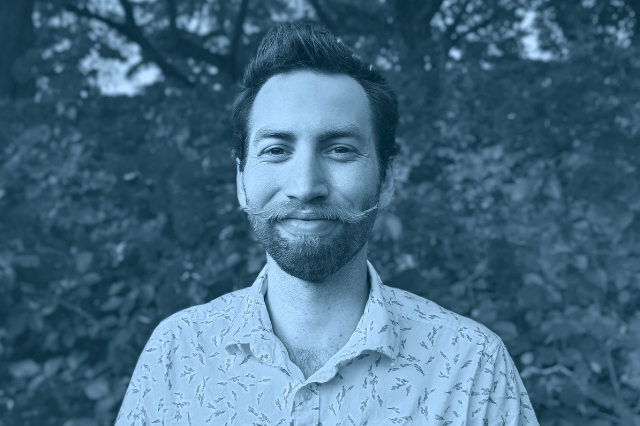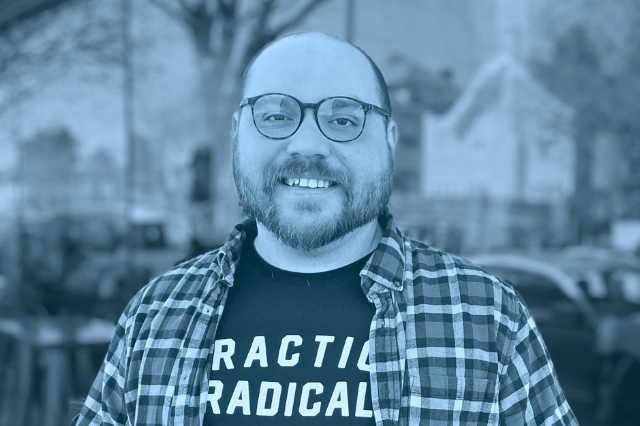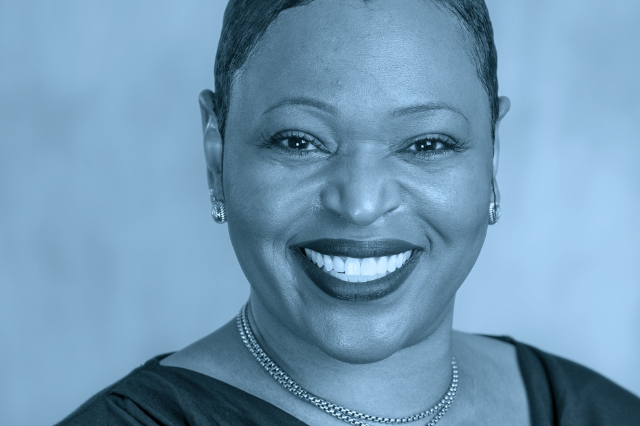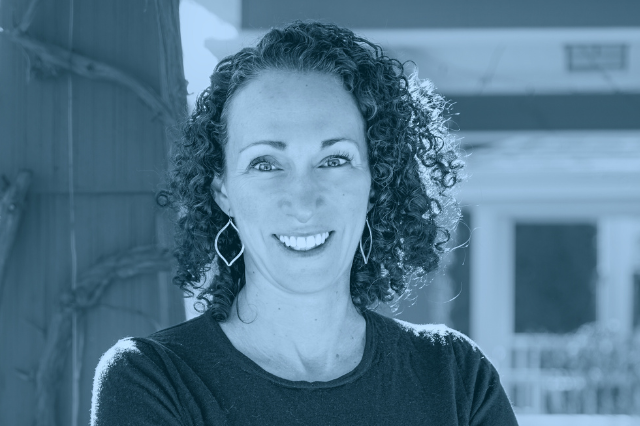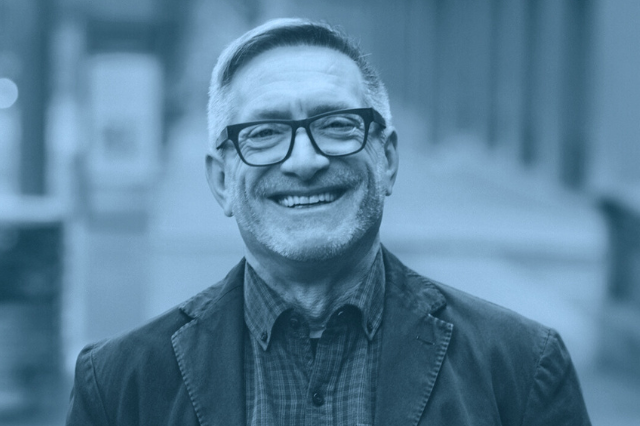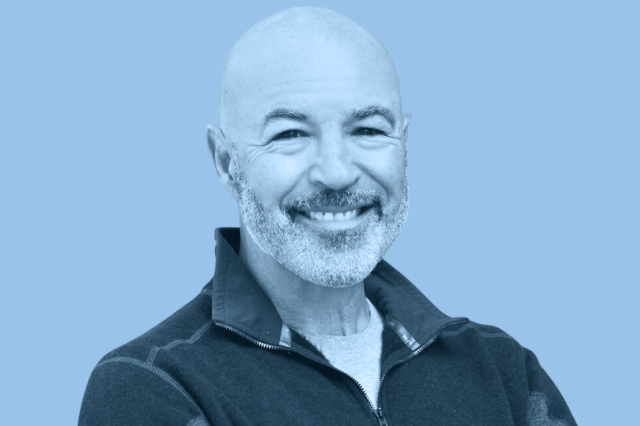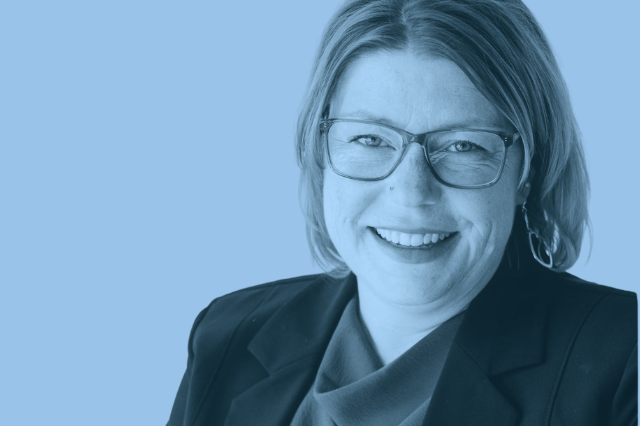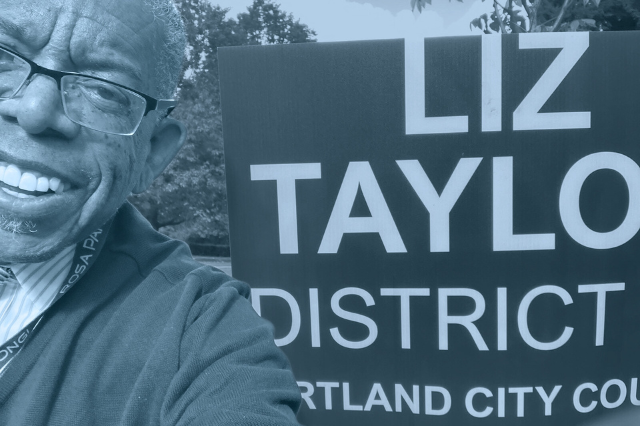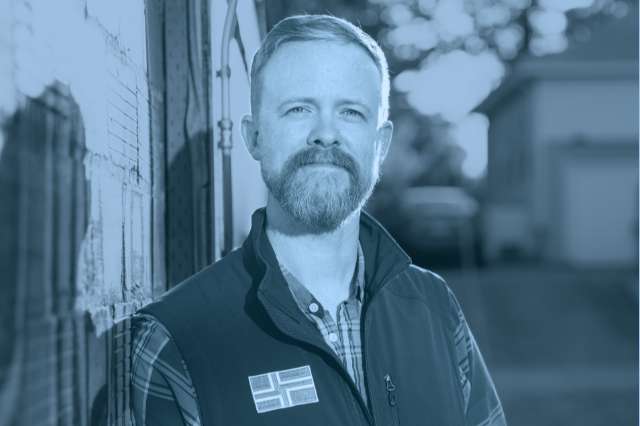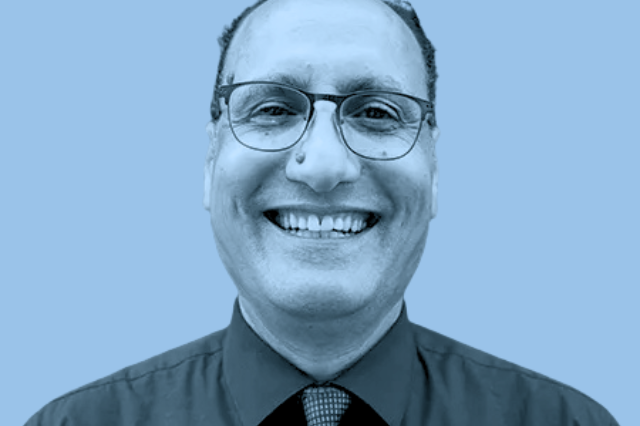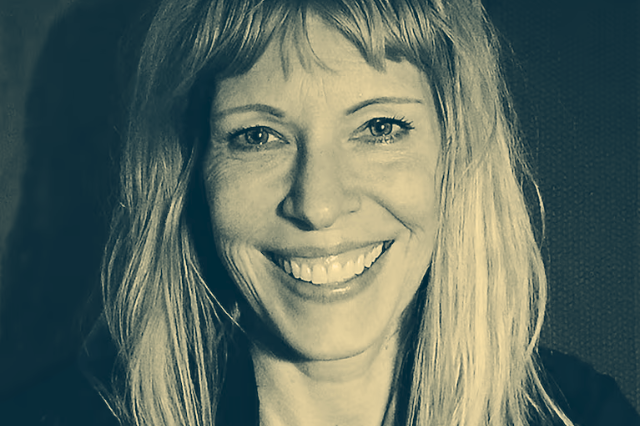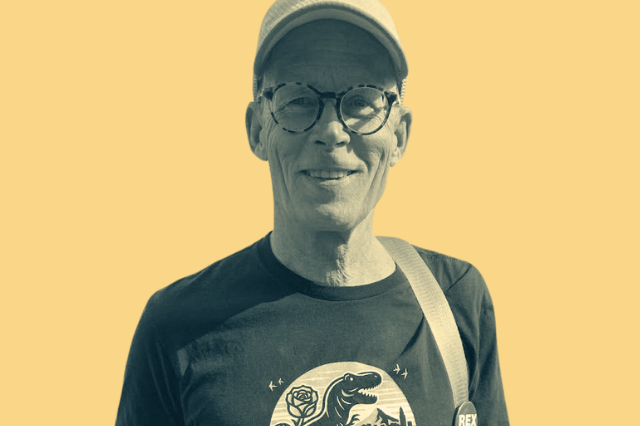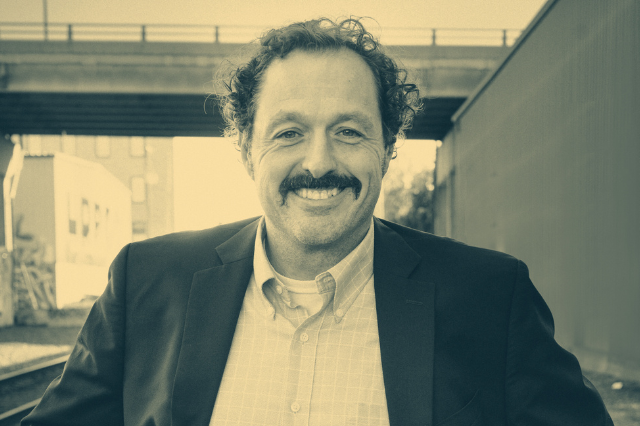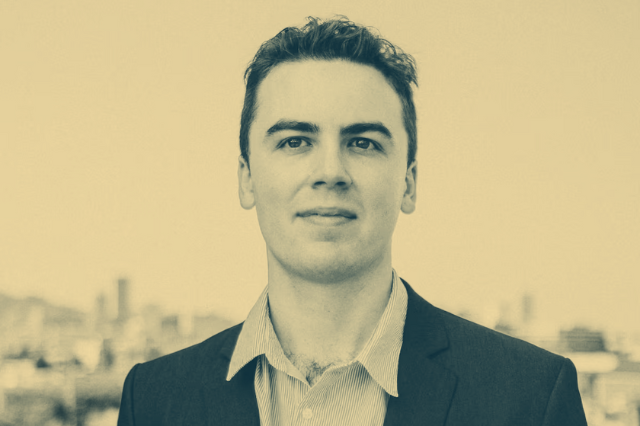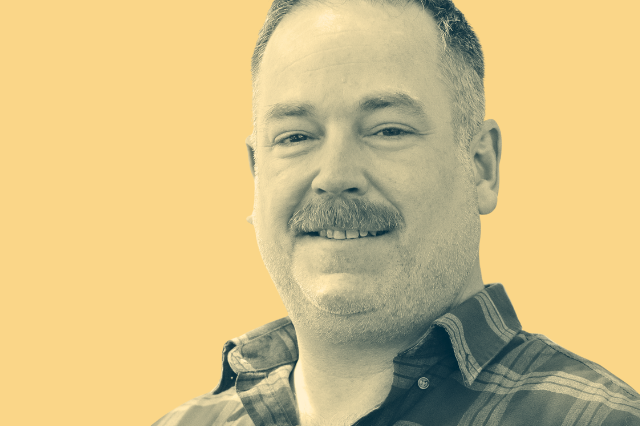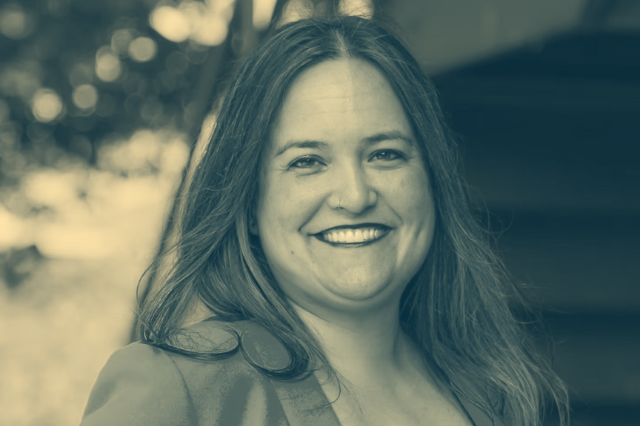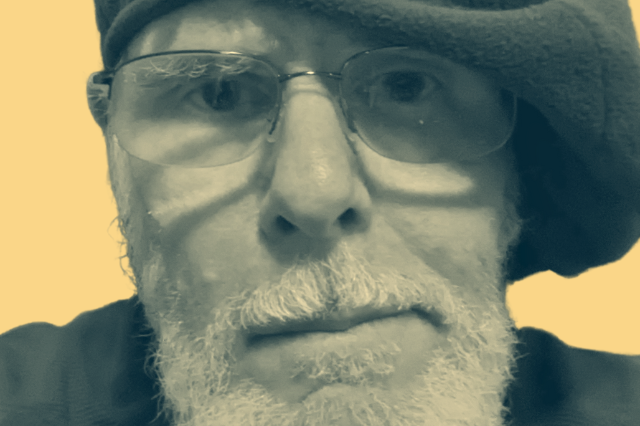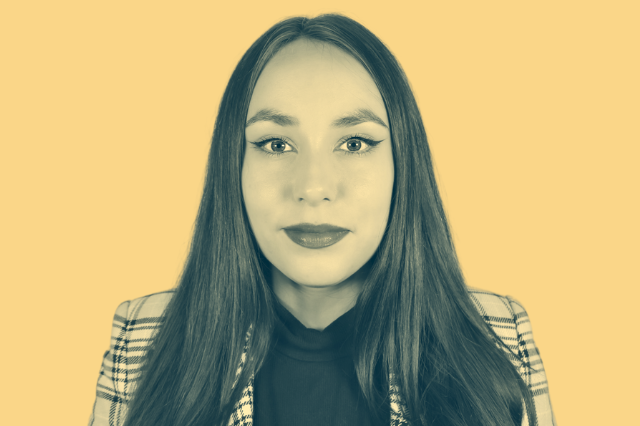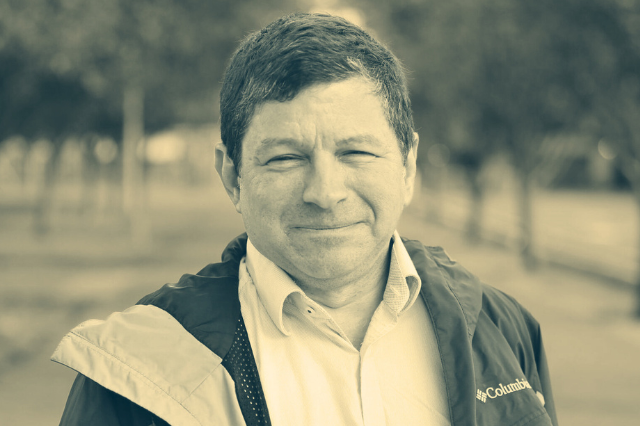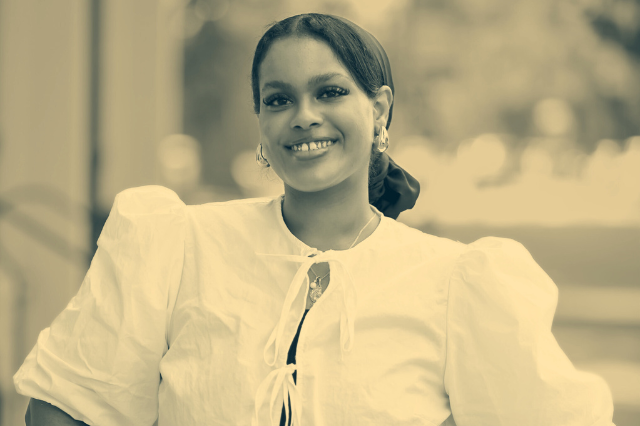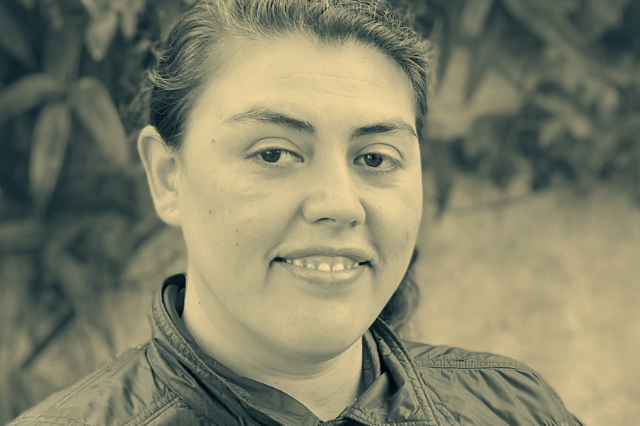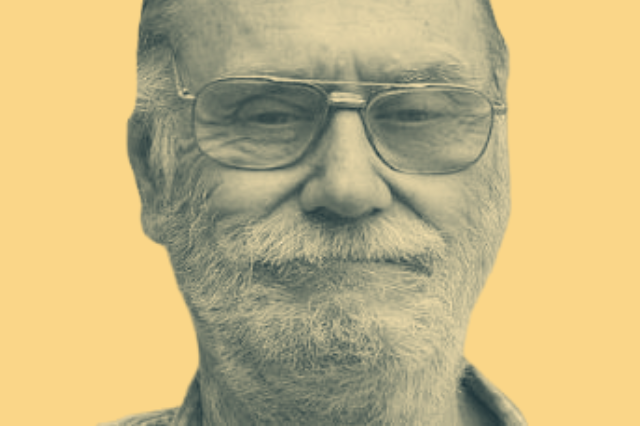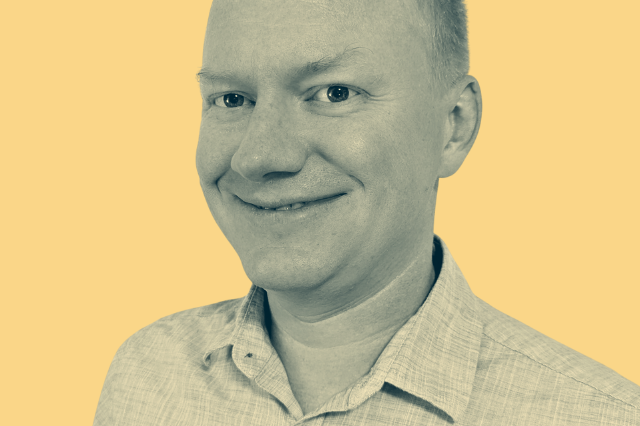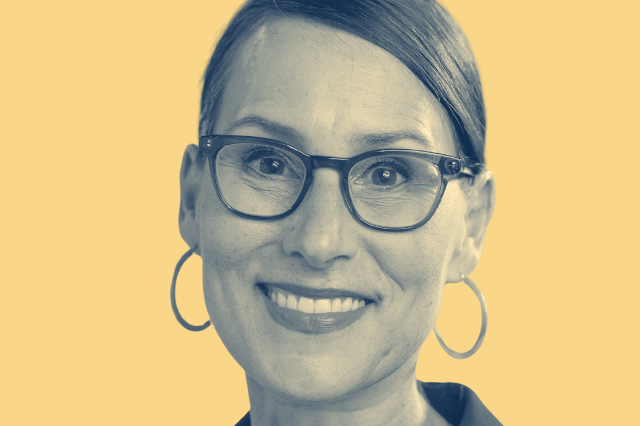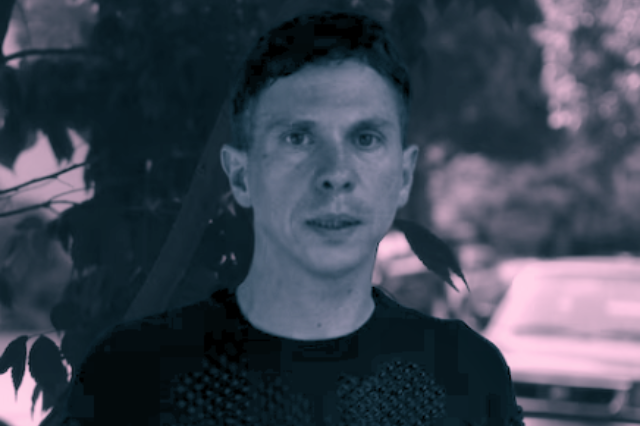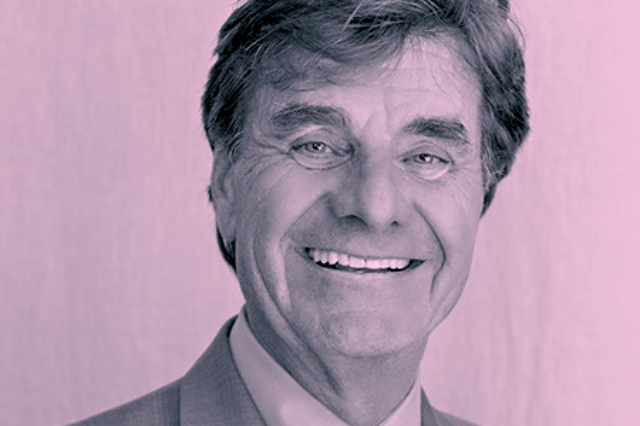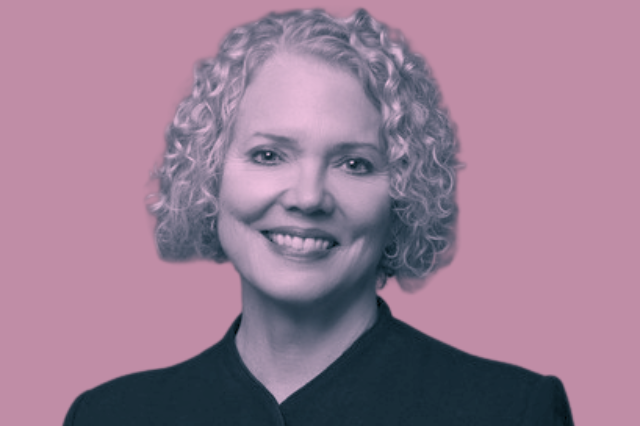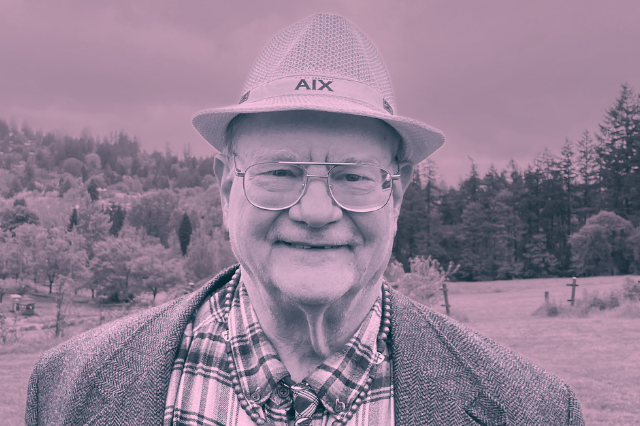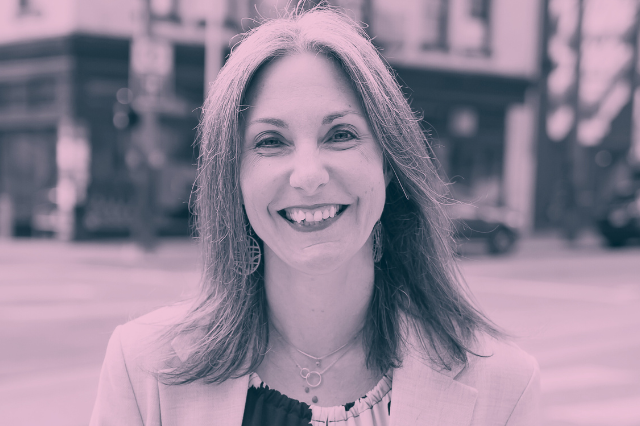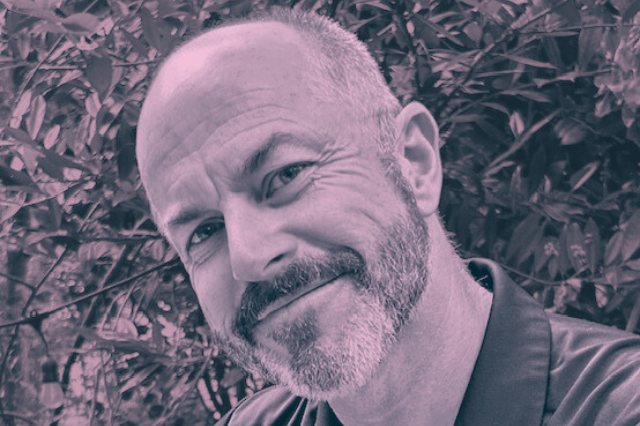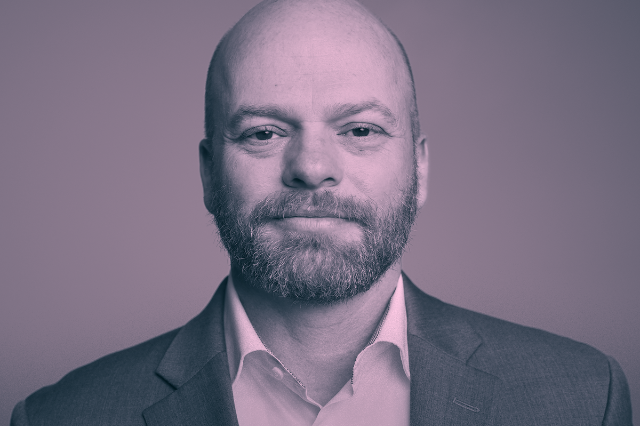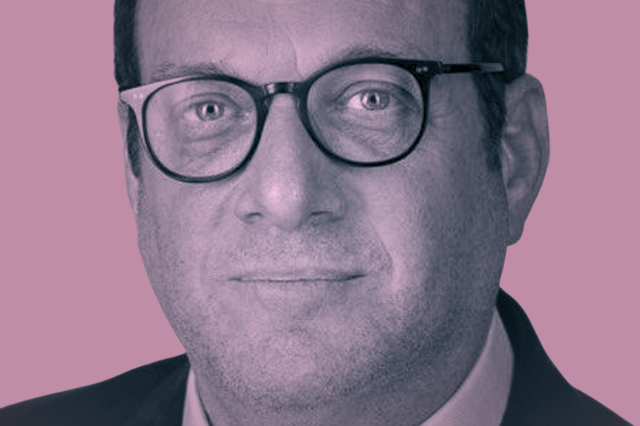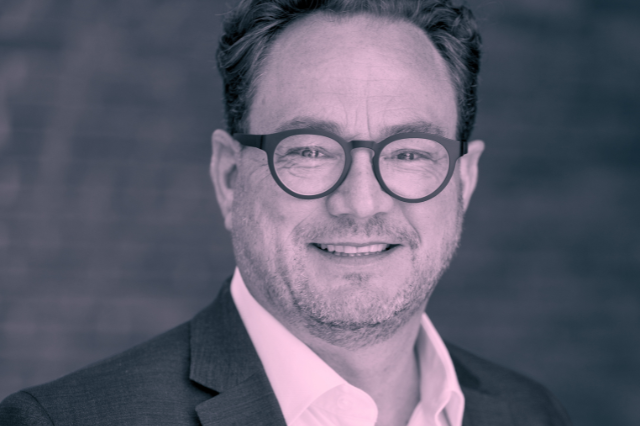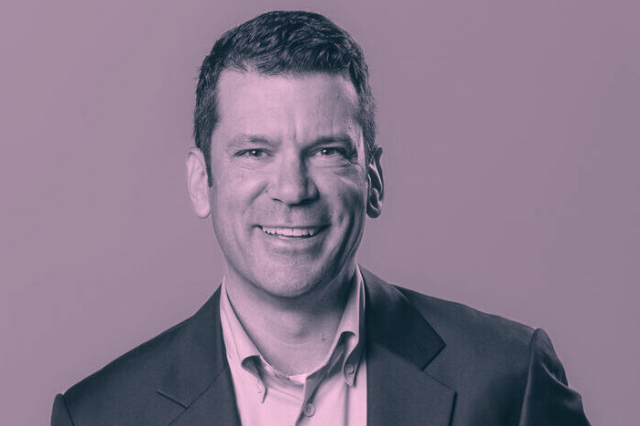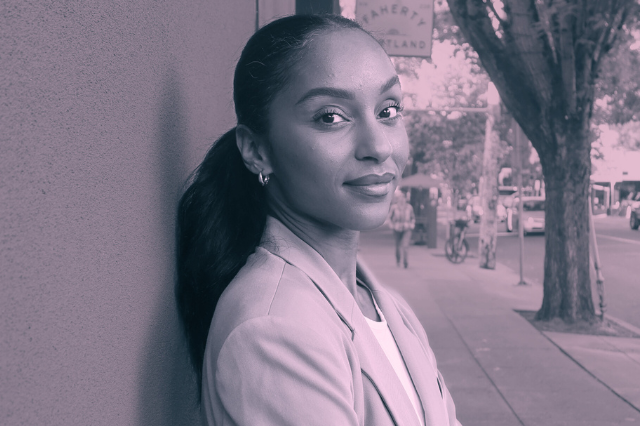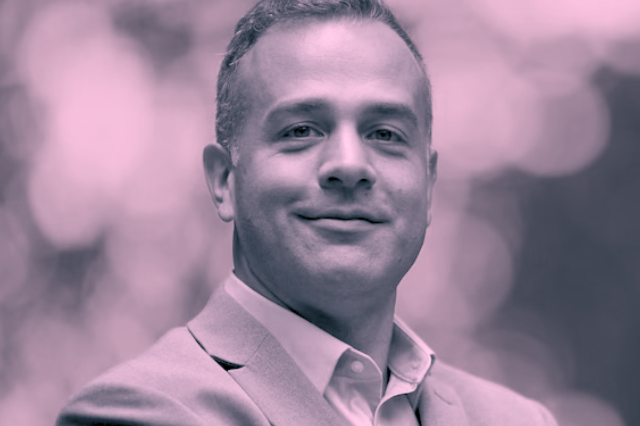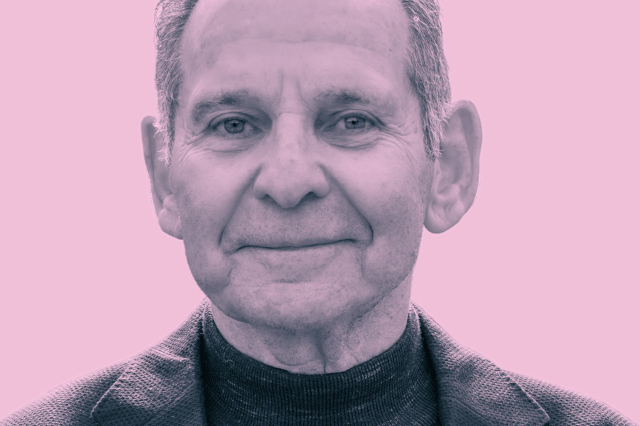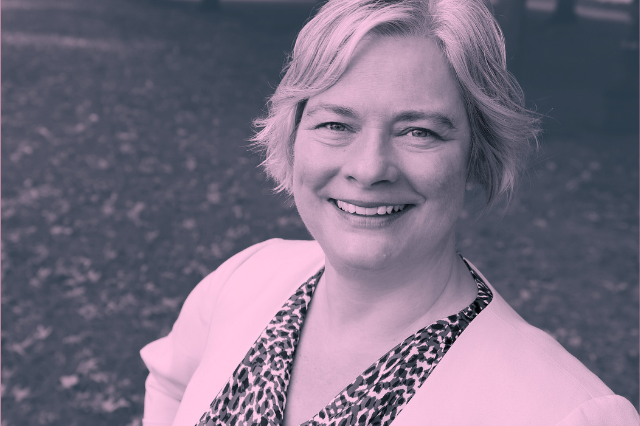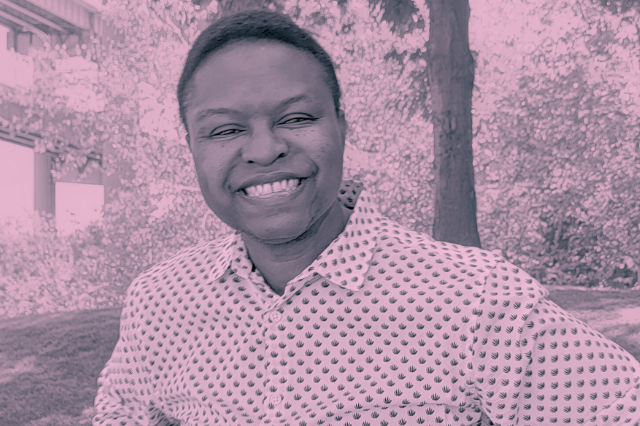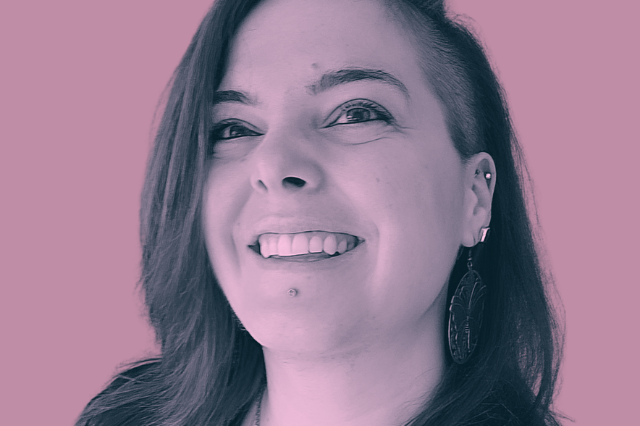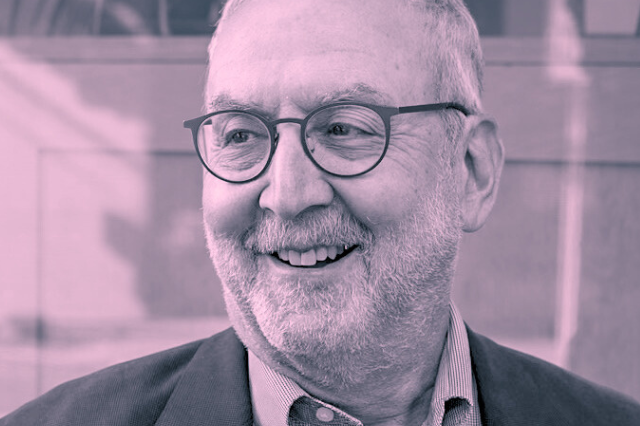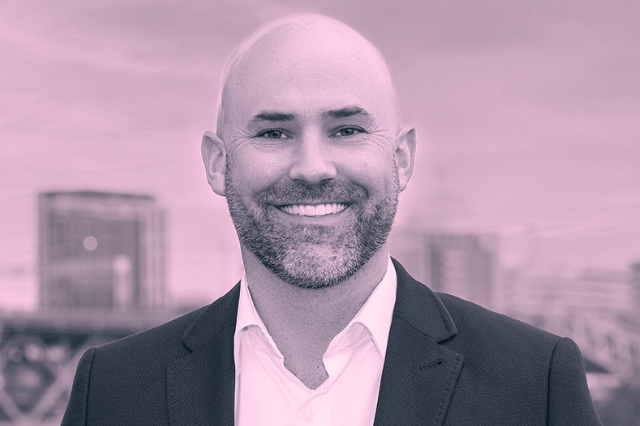About this Project
Fifty-eight candidates running for Portland City Council took the time to respond to our candidate survey, which was crafted by City Club’s board and staff, with input from our members, event attendees, and email subscribers.
We reached out to all candidates using the email addresses provided in their filings, inviting them to participate. Four reminder emails were sent between October 4 and October 21.
If you’re a candidate not listed below and think we might have contacted you at the wrong email, we’d love to hear from you! Feel free to reach out at info@pdxcityclub.org. We’ll keep adding new responses as they come in.
DISTRICT 1 IS THE MOST EASTERN DISTRICT.
The district includes all neighborhoods east of Interstate 205, ranging from Parkrose to Centennial to Pleasant Valley. It also crosses I-205 to include the Lents Neighborhood in Southeast Portland and the Sumner Neighborhood and Portland International Airport area in the north. It’s home to the East Portland Community Center, Powell Butte National Park, Leach Botanical Garden, Gateway Discovery Park, Lents Park (and the Portland Pickles stadium) and other city parks facilities. It includes five school districts: Portland Public Schools, Parkrose, Reynolds, David Douglas and Centennial.
Source: OPB | Learn more about District 1
Candidates
Joe Allen – Did not respond to City Club’s survey
Candace Avalos
Doug Clove
Jamie Dunphy
Timur Ender
Noah Ernst – Did not respond to City Club’s survey
Joe Furi – Did not respond to City Club’s survey
Terrence Hayes
David Linn – Did not respond to City Club’s survey
Peggy Sue Owens
Steph Routh
Mike Sands
Thomas Shervey – Did not respond to City Club’s survey
Loretta Smith – Did not respond to City Club’s survey
Cayle Tern
DISTRICT 2 IS THE MOST NORTHERN DISTRICT.
District 2 includes nearly all Portland neighborhoods north of Interstate 84, east of the Willamette River, and west of Interstate 205, ranging from Cully to St. Johns to the Lloyd District. It’s home to many important civic landmarks like the Moda Center, Peninsula Park, Charles Jordan Community Center, Cathedral Park, Woodlawn Park and Matt Dishman Community Center. The entire district lies within Portland Public Schools’ district boundaries.
Source: OPB | Learn more about District 2
Candidates
James Armstrong
Reuben Berlin
Michelle DePass
Marnie Glickman – Did not respond to City Club’s survey
Mariah Hudson
Sameer Kanal – Did not respond to City Club’s survey
Debbie Kitchin
Mike Marshall
Will Mespelt
Chris Olson
Jennifer Park – Did not respond to City Club’s survey
Tiffani Penson
Antonio PettyJohnBlue – Did not respond to City Club’s survey
Elana Pirtle-Guiney
Dan Ryan
Sam Sachs – Did not respond to City Club’s survey
Bob Simril
Laura Streib
Jonathan Tasini – Did not respond to City Club’s survey
Liz Taylor
Nat West
Nabil Zaghloul
DISTRICT 3 IS THE INNER SOUTHEAST DISTRICT.
District 3 includes most Portland neighborhoods west of Interstate 205 and south of Sandy Boulevard. There are some exceptions: It excludes Hollywood, Lents, Reed, Sellwood, Eastmoreland and Ardenwald-Johnson neighborhoods. It also includes a few neighborhoods that cross Sandy Boulevard, like Rose City Park, Roseway, Kerns and Buckman. It’s home to Laurelhurst Park, Mt. Tabor Park, Montavilla Community Center, Mt. Scott Community Center, Rose City Golf Course and other city facilities. The schools in this district are largely part of Portland Public Schools, but some slivers of the district are included in Parkrose and David Douglas school district boundaries.
Source: OPB | Learn more about District 3
Candidates
Matt Anderson – Did not respond to City Club’s survey
Sandeep Bali – Did not respond to City Club’s survey
Melodie Beirwagen
Christopher Brummer – Did not respond to City Club’s survey
Rex Burkholder
Brian Conley – Did not respond to City Club’s survey
Jesse Cornett
Daniel DeMelo
Chris Flanary
Dan Gilk – Did not respond to City Club’s survey
Theo Hathaway Saner
Clifford Higgins – Did not respond to City Club’s survey
Patrick Hilton – Did not respond to City Club’s survey
Kelly Janes – Did not respond to City Club’s survey
Harrison Kass – Did not respond to City Club’s survey
Philippe Knab – Did not respond to City Club’s survey
Tiffany Koyama Lane
Kent R Landgraver III
Angelita Morillo
Steve Novick
David O’Connor – Did not respond to City Club’s survey
Ahlam K Osman
Cristal Azul Otero
Terry Parker
Heart Free Pham – Did not respond to City Club’s survey
Jaclyn Smith-Moore – Did not respond to City Club’s survey
John Sweeney – Did not respond to City Club’s survey
Jon Walker
Kezia Wanner
Luke Zak
DISTRICT 4 IS THE MOST WESTERN DISTRICT.
The district isn’t limited to westside neighborhoods. To ensure each district’s population was about the same size (around 163,000), the committee that mapped the city’s new districts was forced to include some eastside residents. Which means that, along with Downtown, Multnomah, the Pearl District and Linnton neighborhoods, District 4 will include the Southeast Portland neighborhoods of Reed, Eastmoreland, Sellwood-Moreland, and Ardenwald.
The sprawling district is home to Portland landmarks like Forest Park, the Oregon Zoo, the Keller Auditorium, Pioneer Courthouse Square, and Oaks Bottom Wildlife Refuge. District 4 is represented by two school districts: Portland Public Schools and Riverdale.
Source: OPB | Learn more about District 4
Candidates
Joe Alfone
Eli Arnold – Did not respond to City Club’s survey
Bob Callahan
Patrick Cashman – Did not respond to City Club’s survey
Olivia Clark
Raquel Coyote – Did not respond to City Club’s survey
Mike DiNapoli – Did not respond to City Club’s survey
Kelly Doyle
Brandon Farley – Did not respond to City Club’s survey
Lisa Freeman – Did not respond to City Club’s survey
John J Goldsmith
Kevin Goldsmith – Did not respond to City Club’s survey
Mitch Green
Chris Henry
Ben Hufford
Chad Lykins
Chloe Mason
Tony Morse
Lee Odell – Did not respond to City Club’s survey
Stanley Penkin
Christopher Regis – Did not respond to City Club’s survey
Moses Ross – Did not respond to City Club’s survey
Tony Schwartz – Did not respond to City Club’s survey
Sarah Silkie
Ciatta R Thompson
John Toran – Did not respond to City Club’s survey
Michael Trimble – Did not respond to City Club’s survey
Andra Vltavín
Bob Weinstein
Eric Zimmerman
CANDACE AVALOS / COUNCIL DISTRICT 1
Environmental and Criminal Justice Advocate
What is your top priority for the City Council? Why?
My top priority is ensuring community safety. This means making sure people can expect the right responder, at the right time, for the right reasons. I’ll also prioritize expanding Portland Street Response, a highly successful program that assists people in crisis without the intervention of an armed police officer. In addition, we need to prevent crime, not just respond to it. Community-based violence intervention programs work in communities susceptible to crime to defuse situations and connect people with resources. We also know that mental health and addiction treatment services make our communities safer, and holding law enforcement accountable is critical in building trust with residents.
How will you coordinate City, County, Metro, and State resources to create affordable housing?
We need to do that by investing in the full spectrum of housing opportunities, from shelter options that are proven to work in Portland, to permanent supportive housing, affordable housing, a variety of homes to meet different people’s needs, and homeownership. We also need to preserve the affordable homes we already have, so people can stay in their homes. Our region’s leaders and voters have agreed we need resources to work together. The State has more money for affordable housing than it ever has before, and we have an opportunity to extend and strengthen Metro’s supportive services measure. The City has a key role to play in working with other jurisdictions.
What will you do to provide more services and improve safety for people experiencing or at risk of homelessness?
First, we need to address homelessness by preventing it in the first place. I would direct the City to fully fund rental assistance, which is key to keeping people in their homes. We also need real and effective ways to support people experiencing homelessness, from mental health and addiction resources, to job training and placement, to housing vouchers, to living wages for social service workers. In the meantime, we must treat every neighbor in our community with dignity and respect. We cannot continue the inhumane and costly sweeps that only push vulnerable people out of sight. I would direct investments in basic sanitation, water, and trash services to ensure our community is healthy and safe for every member.
What is your vision for the future of downtown Portland? What initial steps should the City Council take to achieve that vision?
Downtown is Portland’s economic driver and deserves special consideration. We also need to remember that Portland’s housing and homelessness crisis downtown impacts the rest of the city. My district, East Portland, is where most people go when they are priced out or swept out of other parts of the city. This is why I served on the Governor’s Central City Task Force. Addressing our housing crisis with more affordable housing, rental assistance, and the supportive services people need will serve downtown and the rest of the city. In addition, our small businesses are the backbone of our economy, and we have a great opportunity to match these entrepreneurs with empty retail and office spaces downtown.
What steps will you take to reduce gun violence in our city?
My seven years on the Citizen Review Committee have shown me the importance of fostering trust between law enforcement and residents — and the responsibility the city has to foster this trust. This includes helping the community create alternatives for safety that meet the needs of the residents to address issues like gun violence. Community violence intervention programs work with communities most susceptible to be victims and perpetrators of violent crimes to defuse situations and connect people with resources. In addition, safe neighborhoods have parks, good schools, safe streets, shops, and services. I will lead the charge to finally make sure the needs of our communities are addressed by our city government.
How do you plan to implement your campaign promises to deliver additional city services within a budget that is already straining to fund existing programs?
The City faces billions of dollars in deferred maintenance backlogs that past leaders have left unaddressed. We also face challenges in housing, parks, and infrastructure that require serious resources. We need to take a hard look at our budget and make sure we are capitalizing on opportunities to both respond to immediate needs and proactively funding upstream solutions. For example, currently, City policy dictates that 50% of unanticipated revenues be set aside for infrastructure maintenance—but this applies only during the Fall Budget Monitoring Process (not the overall budget or the Spring Budget Monitoring Process). We need to come up with a holistic plan for unexpected surpluses that meets our challenges throughout the budget cycle.
How will you ensure that Portland’s streets and public spaces are safe and accessible for people of all ages and abilities, especially those who cannot or choose not to drive?
More than two-thirds of the people who died on Portland streets in recent years were killed east of 82nd Avenue, and 28 of the 30 highest-crash intersections are located in East Portland. We must aggressively fund safety projects, like more lighting, better crosswalks and ramps, and barriers to protect bikers. We also need to slow down our streets — the rate of injury and death decreases drastically as driving speeds decrease. We must ensure that every resident can make safe, easy trips on connected, well-maintained sidewalks, especially in East Portland. Finally, I would push TriMet to invest in more frequent buses, dignified stations, and more north-south connections, and fully funded transit for our youth.
What are the best strategies for the City Council to support Portland’s arts communities?
Our vibrant arts scene is a big part of what makes Portland, Portland. But things have changed, and it’s expensive to live here. City Council plays a role in creating an environment where artists can thrive, and I’m focusing my campaign on addressing our housing crisis so artists from all backgrounds can afford to live here. The City has long standing partners in the arts, like RACC, and dedicated funding sources, like the Percent for Arts Fund. We must ensure our funding supports the growing diversity of our artists, by creating specific opportunities for people of color, immigrants, artists with disabilities, and youth. We must expand access to the arts in East Portland, and ensure that performances and exhibitions reflect our community.
Do you support a means for citizens to participate in directing a percentage of the municipal budget to projects of their choosing?
Yes, I believe in participatory budgeting. Participatory budgeting is a democratic process that gives real people the power over real money. Models have proven successful across the world, including in Boston and New York. I advocated for this while on the Charter Commission, and we recommended a charter amendment for participatory budgeting with at least 1% of the general fund. In addition, the City should consider directing all or a portion of unexpected surplus revenues toward participatory budgeting. For example, the city saw a $62 million surplus in fall 2021, largely from business license tax revenue. Dedicating these funds for participatory budgeting would make a real difference in everyday Portlanders’ participation in government.
What sets you apart from the other candidates running in your district?
As a first-generation “Blacktina” with roots in Black American and Guatemalan immigrant communities, my experiences growing up in a multiracial family and working in advocacy have made me a leader who understands the issues facing all Portlanders. I’m running to bring a much-needed voice that reflects our city’s diversity and values. What sets me apart is my track record of bridging gaps and creating equitable policies. From my time as an educator mentoring students, to my role as Executive Director of an environmental justice nonprofit, and my service on many boards and commissions, I have a deep understanding of the challenges our city faces. Over 150 organizations, elected officials, and individuals have endorsed my campaign.
DOUG CLOVE / COUNCIL DISTRICT 1
Public Servant
What is your top priority for the City Council? Why?
My main priority is to make East Portland a safe haven for our families. Our kids are the heart of our community, but they’re also the most vulnerable. It all starts with cleaning up our streets and removing those unsafe and unsanitary homeless encampments. Kids should be able to walk to school on the sidewalks we pay for without having to dodge needles or human waste. They should feel safe riding their bikes on our roads and playing in our parks without the fear of violence. Families deserve to feel at ease in their own neighborhoods. As we work on increasing police presence, I’ll make sure our city starts tackling the crimes that impact the daily lives of East Portland residents.
How will you coordinate City, County, Metro, and State resources to create affordable housing?
I’ll keep in contact with these policymakers as often as necessary to figure out how to handle these resources. This is a big issue, and we really need to start holding the agencies accountable for making the most of what they’ve got.
What will you do to provide more services and improve safety for people experiencing or at risk of homelessness?
Let’s start by examining what we’re currently up to. Our city has poured a ton of money into this problem, but honestly, things just keep getting worse. Clearly, this cash is going somewhere, so it’s high time we redirect it to groups that can actually drive real change. This is the top priority for Portland, and we need to allocate funds properly. Not one person in Portland should feel unsafe. It’s not what our city is about.
What is your vision for the future of downtown Portland? What initial steps should the City Council take to achieve that vision?
My goal is pretty straightforward: I want to restore downtown Portland to its former glory. This is the ‘Rose City,’ arguably the most stunning city in the U.S., and I genuinely believe that. Do you remember how it used to be? It’s disheartening to see how much we’ve fallen. The NY Times article really hit hard, shining a light on what Portland has turned into, while our elected officials have just stood by and watched it happen. Now, many of these same leaders are running for office again, hoping to keep their jobs. We need to start by addressing the issues downtown, like the open drug use and the homeless situation. If we can make downtown a safe place again, people will return, and that will help revive local businesses.
What steps will you take to reduce gun violence in our city?
The Portland Police Bureau has recently brought on more officers, with even more expected soon. I’m all for boosting the numbers in the Focused Intervention Team. Folks in east Portland just want to feel safe. It’s crazy that someone can’t wait for a MAX train without worrying about getting shot. And kids shouldn’t have to avoid playing in parks because of the risk of gunfire. We’ve been pretty lucky so far, but it’s only a matter of time before a stray bullet hits a child, and we’ll have no one to blame but ourselves. Being an elected official means taking on real responsibilities. The choices we make can literally mean the difference between life and death for the Portlanders we serve. Too many politicians seem to forget that.
How do you plan to implement your campaign promises to deliver additional city services within a budget that is already straining to fund existing programs?
I’ll team up with my fellow elected officials to shift some funds around and tackle the biggest issues I talked about during my campaign. I’m not taking a huge risk by pushing for every Portlander to feel safe in their daily lives. This should matter to everyone, and if it doesn’t, I’ll make sure Portlanders are aware. Sure, cleaning up homeless camps and fixing potholes might not be as sexy as dropping $250 million on a Keller renovation, but it’s necessary work.
How will you ensure that Portland’s streets and public spaces are safe and accessible for people of all ages and abilities, especially those who cannot or choose not to drive?
Let’s start with putting in some sidewalks for kids to use. There are spots in East Portland that really need them. Right now, kids, seniors, and people with disabilities are trudging through muddy puddles along the roads. We need to make sure these sidewalks stay clear of homeless camps and tents. Our parks should be safe, which means we need more police around. Plus, we should boost police presence near MAX platforms and other public transit spots. Ultimately, it all comes down to the fact that folks in East Portland should be able to go about their lives without worrying about becoming victims.
What are the best strategies for the City Council to support Portland’s arts communities?
The City Council has to ensure these neighborhoods feel secure and aren’t worried about break-ins, vandalism, or arson. It really boils down to taking care of the little things, like stepping up enforcement on minor offenses. By doing this, we can make these areas safer, and in turn, our arts communities will thrive
Do you support a means for citizens to participate in directing a percentage of the municipal budget to projects of their choosing?
I do support this. The more input we can get from Portlanders, the better off we’ll be. As the representative for District 1, my views shouldn’t be the main focus. What really counts is what the people I represent think. My role is to gather their ideas and suggestions and turn them into proposals that reflect what my East Portland neighbors want.
What sets you apart from the other candidates running in your district?
What makes me different is that I’m not a politician or someone from city hall who’s helped drag Portland down, especially East Portland. I’ve lived here my entire life and have seen this once-great city fall apart right before my eyes. With nearly 26 years at the Water Bureau, I’ve been out in the community, listening to my neighbors and their worries about how things are being managed. I don’t have any endorsements from special interest groups or political insiders. I’m an outsider who isn’t tied to anyone and genuinely wants to make a difference in East Portland. I’m ready to take action, and I’m not concerned about what critics might say. It’s time to stop the empty promises.
JAMIE DUNPHY / COUNCIL DISTRICT 1
Music Advocate, Policy Director
What is your top priority for the City Council? Why?
Basic Livability, including housing, homelessness, addiction: Portland faces intertwined crises of homelessness, mental health, and fentanyl addiction, creating inhumane conditions and unsafe public spaces. We need comprehensive solutions, including providing essential services to the unhoused, addressing mental health needs, and tackling the fentanyl crisis to ensure safety and support for all residents. We also need to recognize that people do not feel safe sending their kids to the park for fear they’ll step on a needle. We need to clean up public parks and plazas and business districts and activate those spaces with music and art and opportunities for community to build, and to discourage bad behavior.
How will you coordinate City, County, Metro, and State resources to create affordable housing?
I believe that the core issue of affordable housing is that we simply don’t have enough homes available for those who want them. We need to build more housing of all types. We need to continute the work on permitting reform to ensure our projects are permitted in the same timeline as neighboring cities, and to look at our zoning code and affordable housing programs to ensure we are incentivizing development of the right scale and right location. We need to hold corporate landlords accountable for holding properties vacant by instituting a vacancy tax. And I would urge the Housing Bureau and Prosper Portland to aggressively bid on foreclosed downtown office towers for intensive housing conversion.
What will you do to provide more services and improve safety for people experiencing or at risk of homelessness?
My old boss Nick Fish used to say that if the President called and said that 4,000 Haitian refugees were coming to Portland, we’d find them a safe place to stay. Yet we don’t have that same urgency toward our own neighbors. The fragmented, expensive, and unaccountable system has failed to deliver results. We need a unified definition of success across the government types, coupled with urgent leadership. An ounce of prevention is worth a pound of cure: keeping people from falling into homelessness in the first place will actually stop this crisis from continuing. I will bring the urgency and demand tangible results to getting people off the streets and into safe, stable housing.
What is your vision for the future of downtown Portland? What initial steps should the City Council take to achieve that vision?
Downtown has received lots of attention. East Portland has been ignored for decades. Downtown will be fine, and they will have three of their own amazing new City Councilors to fight for them. My fight will always be for East Portland. However, the opportunity for artists live/work space, activation of vacant storefronts with arts and music and culture and community, is unparalleled. We need something positive and proactive to invite people back downtown in a positive and community-focused way. We should look for opportunities for active reuse, converting existing office space into different kinds of housing wherever possible.
What steps will you take to reduce gun violence in our city?
Gun violence is an issue that is always on my mind. I worked in the David Douglas School District doing gang prevention in a middle school. I made meaningful impacts on the lives of at-risk youth and helped them make decisions to turn away from violence. But three of my students died, six of my students were shot and lived, and one of my students is serving a long sentence because she was involved in the violent beating death of her classmate. There are real and scary situations that exist in our community, and we need adequate police resources to respond. We also need to invest in resources and opportunities for young people, including teens programs, apprenticeships, and ways our young people can envision a future for themselves.
How do you plan to implement your campaign promises to deliver additional city services within a budget that is already straining to fund existing programs?
The new system of government will inherently streamline service delivery in ways that I believe will free up budgets. There’s no reason to have 20 different Public Information Officers writing variations on the same press release. The lack of accountability and deliverable outcomes by City bureaus over the decades is deeply unacceptable, and there is an enormous amount of waste and duplication. I look forward to the new City Manager finding efficiencies and cost savings to allow additional budget to address the serious crises happening in our community that require urgent attention.
How will you ensure that Portland’s streets and public spaces are safe and accessible for people of all ages and abilities, especially those who cannot or choose not to drive?
First, there’s the historic disinvestment in infrastructure in East Portland. We have miles of unpaved roads, roads without sidewalks, and wildly inadequate lighting. Our major arterials are not safe for bike riders, and much of the transportation infrastructure we have received in recent decades has not resulted in lower rates of death.
Secondly, we need to urgently respond to the homelessness crisis, and get folks into housing and off sidewalks and parks and public spaces. It’s deeply inhumane to allow our neighbors to sleep on the street. It’s also deeply unfair that our failure to address these challenges has meant that families don’t feel safe sending their kids to the park for fear they’ll step on a needle. We MUST address both.
What are the best strategies for the City Council to support Portland’s arts communities?
Liking the arts is not the same thing as supporting the arts. Portland was once a city where musicians and artists could afford to live, rehearse, and perform their craft. That’s largely no longer possible. Without strategic help from both the public and private sectors, we will lose the soul of our city. I will be a champion for Portland’s $3billion music industry in Portland, which is facing enormous outside pressures, from the loss of performance venues to increasingly dense neighborhoods with very little sound protection in the walls. I will protect existing music infrastructure, venues, and rehearsal spaces with acoustic zoning requirements and preventing Live Nation from owning a venue in Portland’s central eastside.
Do you support a means for citizens to participate in directing a percentage of the municipal budget to projects of their choosing?
Yes, I was a supporter of the community budgeting effort, and look forward to seeing it successfully implemented.
What sets you apart from the other candidates running in your district?
I have a unique combination of deep lived experience in this community, and a proven track record of getting meaningful results out of complicated government systems. Portland cannot afford to have the new City Council learn on the job. I have been in public service for more than 20 years, including more than ten years working for two of our region’s best elected officials. I spent five years working for US Sen. Jeff Merkley, focused on housing, education, and Social Security, and five years as Senior Policy Director for Portland City Commissioner Nick Fish. I am intimately familiar with Portland’s unique and dysfunctional system of government, and how to advance complicated and nuanced public policy to deliver real results for Portlanders.
TIMUR ENDER / COUNCIL DISTRICT 1
Attorney, Urban Planning Professional
What is your top priority for the City Council? Why?
My top priority is getting our public safety system modernized. My overall vision is to ensure the right response at the right time in the right place.
Priorities:
-Hiring more 911 dispatchers to ensure calls are answered promptly and routed appropriately.
-Increasing capacity of Fire Bureau’s CHAT which works to address root causes of high utilizers of the 911 system.
-Public safety through environmental design: street lighting, tree canopy, crosswalks
-Increase public safety support specialists and broaden call types they can be dispatched to.
-Portland Street Response: ensure citywide 24/7 operation; independent; co-equal branch of public safety system.
How will you coordinate City, County, Metro, and State resources to create affordable housing?
We need to work strategically to address our affordable housing goals. First, every dollar put in prevention is many more dollars saved trying to re-house someone later. Currently, we have hundreds of families losing housing every month because wages are not keeping up with the cost of living. We must ensure that someone working full time is able to afford living in our community and has the ability to meet their overall needs because they aren’t spending more than 30% of their income on housing. Until we get this balance right where wages are adequately covering housing costs, we will continue to see more families fall into housing insecurity and we will continue chasing the effects of this imbalance. I’m committed addressing root cause.
What will you do to provide more services and improve safety for people experiencing or at risk of homelessness?
I am committed to reducing unsheltered homelessness through policies that materially address this issue. First, dollars invested in prevention are some of the best uses of taxpayer funds as it costs significantly more to move people back into housing once they are out on the street. Second, we must ensure shelters and housing are available, are trauma informed, paired with supportive services, and have reasonable accommodations for pets, belongings, and companions.
Not every person will feel welcome in every type of shelter which is why we need a diversity of options to meet the needs of our populations.
Moreover, we must address the root cause by ensuring adequate housing for every age, wage, and stage.
What is your vision for the future of downtown Portland? What initial steps should the City Council take to achieve that vision?
My vision for downtown Portland includes more housing, more events, and a strong sense of place. We need to give people a reason to visit, live, and stay in downtown Portland.
I see waterfront park as the anchor of downtown Portland’s event and tourism scene. In 2015, I was proud to be part of a group that launched Better Naito to increase safety and access for festivals in this area. I would advocate for multi-year funding so festivals have the ability to plan and execute events. Waterfront park also needs some basic infrastructure such as wi-fi, water fountains, and bathrooms so that people are able to access, stay, and enjoy this park for longer.
What steps will you take to reduce gun violence in our city?
-Strengthen “place-based” interventions to gun violence such as improved street lighting and increased access to green spaces (public safety through environmental design).
-violence interrupters to help prevent retaliatory shootings.
-Supporting the Ceasefire program which provides intense wraparound case management to a small number of individuals who are most at risk of committing gun violence.
-Invest in community based organizations who are doing work on the ground to prevent gun violence.
-Support programs that build cohesion and foster social interaction between neighbors such as neighborhood emergency teams, movies in the park, Sunday Parkways.
-Support a voluntary gun buyback program, which other cities have seen success with.
How do you plan to implement your campaign promises to deliver additional city services within a budget that is already straining to fund existing programs?
In the near term, I will work to protect programs that are in line with my vision for East Portland. Long term, I will advocate that we take a holistic view of how we are taxing and budgeting.
Additionally, the City has engaged in scenario planning around what it would take to meet the needs of our community. I will work with fellow council members to find alignment on the areas we care about and work toward solutions that help all of us meet our needs as a community.
While I don’t expect all of us to agree, I do believe the council members who will be most effective in this new form of government are those who are kind, collaborative, and willing to work together to achieve policy wins for the residents of Portland.
How will you ensure that Portland’s streets and public spaces are safe and accessible for people of all ages and abilities, especially those who cannot or choose not to drive?
First, I am a proponent of left turn calming and pedestrian head starts at traffic signals. Additionally, street lighting is also key for addressing safety and perceptions of safety.
I will be a strong voice for transportation investments that save working families time and money: safe routes to school and access to public transit
We must also put our zoning code to work to ensure people are able to live in places closer to where they work. I will also advocate for transit oriented development so residents have convenient access to great public transit.
Finally, we can’t wait decades for our sidewalk network to be built out. I will advocate for short term safety interventions that protect families walking to school in the near term.
What are the best strategies for the City Council to support Portland’s arts communities?
As it relates to art, I will be a strong proponent of public art. East Portland has 100 languages represented. As it relates to our community, I will be an advocate for ensuring public art in East Portland is reflective of the diversity of our community. I will also advocate that art is included in public infrastructure projects and is reflective of community desires around beautification, accessibility and representation.
Do you support a means for citizens to participate in directing a percentage of the municipal budget to projects of their choosing?
Yes, I am a strong proponent of participatory budgeting. As an elected official, I never want to have to guess what my community needs. Community based planning and budgeting efforts help articulate and prioritize the types of investments residents desire. It is then my job to fight for those investments to ensure our community has the resources it needs to thrive.
What sets you apart from the other candidates running in your district?
I am one of the few candidates in this race who:
-who has experience aligning infrastructure funding to meet the needs of East Portland.
– has managed scope, schedule, budget, and risk for multimillion dollar budgets and stood up major city programs such as fixed speed safety cameras, bike share, and the fixing our streets program.
-in a district of 100 languages represented, speaks a language other than English at home (Turkish)
-is a parent of 3 young kids, including a child in the foster care system
-first in my family to be born in the U.S.
-resident in a neighborhood with high rates of gun violence (Hazelwood)
-have served as a volunteer legal aid attorney for families fleeing gender-based and political violence
TERRENCE HAYES / COUNCIL DISTRICT 1
Community Advocate, Small Business Owner
What is your top priority for the City Council? Why?
My top priority for the City Council is public safety, and in particular, gang and gun violence reduction in the black community. The current budget quietly cut several million dollars from the Office of Violence Prevention and we have seen an increase in gun violence over the last few years. We can reduce those numbers by fully investing in the Office of Violence prevention and therefor the community-based organizations on the ground doing this important work.
How will you coordinate City, County, Metro, and State resources to create affordable housing?
I plan to work with developers to fix City Code and find ways we can pressure the County and Metro to do better once I have a better understanding of their roles in this work. We need to spur development of housing at all levels, not just low-income, because everyone needs their cost of living to decrease, renters and homeowners. I would also like to pressure the state step in and place some parameters on our neighboring counties, as Multnomah County seems to be bearing the brunt of the burden with regards to building low-income housing. We cannot be the Emergency Room of the state with regards to low income housing availability – other counties need to step up their building production, too.
What will you do to provide more services and improve safety for people experiencing or at risk of homelessness?
I am in favor of the City setting up more temporary shelter in every new City district, but beyond that, it is not the City’s job to provide services, that is the County’s, as are rent vouchers to help stop evictions into homelessness. I would like to see better accountability of the dollars we as a city are putting into the Joint Office of Homeless Services so we can ensure as a City Council that we are getting a fair deal with regards to said vouchers and services. Setting up more shelters to put an end to unsanctioned street camping will vastly improve the health and safety of our unhoused neighbors.
What is your vision for the future of downtown Portland? What initial steps should the City Council take to achieve that vision?
I would like to see more offices converted to housing, I think certain types of communal housing options should be explored for youth aging out of foster care and people in recovery who would benefit from a more community-centered living environment, which would seemingly be easier to convert buildings into. I would like to see more downtown activation like the ‘Curious Cat Trail’ that just occurred, as well as bringing more sporting events to the city that would draw more tourists to us. It is easy for the City Council to get event permits for this type of activation, and we should encourage all types of activities that would increase tourism.
What steps will you take to reduce gun violence in our city?
I already answered this with my response to the first question, but this is the work I do on a daily basis. We need people with lived experience like myself to lead the work to encourage youth to invest in themselves and their education or trade careers, so they can afford to live in this city without having to resort to a criminal lifestyle. We also need to provide more third spaces and recognize that our youth are struggling, many because they are lacking two parents in their household who are providing them with love and attention, a real reason why young people turn to gangs. We need more sponsored activities that encourage our youth to commune together in a positive way.
How do you plan to implement your campaign promises to deliver additional city services within a budget that is already straining to fund existing programs?
I want to do a deep dive into our City budget, and I’m glad to hear several other candidates say the same thing. I like the idea of reviewing our tax bonds and levies to see how we could possibly keep the spirit of the measure but find a way to codify it into our regular tax code and City Charter or Code. We know that we have a lot of waste in these programs having them run the way they currently do, and I think restructuring them would result in finding a lot of extra funding. Overall, though, we need to have a 10 and 20 year vision for our budget and work backwards from that to determine the best way to keep our basic services funded.
How will you ensure that Portland’s streets and public spaces are safe and accessible for people of all ages and abilities, especially those who cannot or choose not to drive?
We need to look at our budget and find a way to start addressing our infrastructure woes. Our existing streets are so degraded we need to do a much more expensive strip-down and start over process with most of them. We are missing streets and sidewalks, most of which are in District 1 where I reside. We absolutely need to find a better way to fund and continuously fund all of the city’s streets and sidewalk infrastructure and maintenance like every other city manages to be able to do. We cannot put the burden of a new street or sidewalk on residents anymore because it’s almost guaranteed a homeowner living on an unimproved street is lower income and cannot afford to build the city a new road.
What are the best strategies for the City Council to support Portland’s arts communities?
We can support the arts by making it clean and safe to walk around and go out to events in the evening again. A lot of our arts patrons are older, retired people who are afraid to go to the central city where most of our entertainment venues are anymore. But even our younger folks are feeling this way, so we have to make people feel safe being out and about in Portland again to truly get them back out to arts and culture events again in larger numbers.
Do you support a means for citizens to participate in directing a percentage of the municipal budget to projects of their choosing?
No, I do not. We have a plethora of budget oversight committees that already do this work. I do not envision that anyone else would get involved in this type of committee that isn’t already doing so, and we are already facing huge budget deficits without handing a big pile of money to citizens to experiment with. I can see special interest groups taking this type of thing over for their own benefit and it not actually being things the majority of residents want to see done with their tax dollars. If you don’t like the decisions being made, vote your electeds out of office, that is what makes democracy so wonderful.
What sets you apart from the other candidates running in your district?
I am different from the other people running in District 1 because I am willing to have hard conversations and speak harsh truths that aren’t popular with everybody. Portland is on an upward trajectory again, but we will stagger if we don’t have someone like me championing both the black community’s true needs as well as the true needs of East Portlanders. We have to truly understand why this district has felt left out so long, and it’s not because we don’t have enough bike lanes. People in East Portland want to feel safe, and they want their kids to be able to afford to live here when they grow up. That’s why my campaign slogan is ‘clean, safe and affordable’ because that’s what all Portlanders want.
PEGGY SUE OWENS / COUNCIL DISTRICT 1
Small Business Owner
What is your top priority for the City Council? Why?
Safety, Community involvement. Because its time for the people to be represented by someone who will actually listen to what the want and need and not just make decision based upon personal agendas.
How will you coordinate City, County, Metro, and State resources to create affordable housing?
Get agency’s to work together to establish local, county and state policies to reduce the cost of home ownership, improve interest rates on mortgages, coordinate with state and local housing finance agencies; down payment assistance for low income families, establish programs to fund the construction of homes that sell for a reduced cost. promote home ownership in under served communities.
What will you do to provide more services and improve safety for people experiencing or at risk of homelessness?
Communication, Community involvement. We have amazing programs available, but people don’t know whats out there. Eliminate the programs with high administration costs, divert funding to programs that are actually servicing the needs of our communities.
What is your vision for the future of downtown Portland? What initial steps should the City Council take to achieve that vision?
Clean up Downtown. Bring business, people, and culture back to the area. Innovative solutions to make downtown desireable again, from Tax incentives to temporary rent subsidy.
What steps will you take to reduce gun violence in our city?
Increased Police presence. Bring back violent crime task force. Work with Street response instead or working as completely separate entities. Enforce judgements.
How do you plan to implement your campaign promises to deliver additional city services within a budget that is already straining to fund existing programs?
I am not making any campaign promises. I would like to review all programs to see which are working and which are not. Stop spending money on things people don’t want, community engagement is a must.
How will you ensure that Portland’s streets and public spaces are safe and accessible for people of all ages and abilities, especially those who cannot or choose not to drive?
I do not support Vision Zero, its not working. Improve traffic safety, an Angry driver is more likely to cause injury. Start by Repairing potholes, widening sidewalks, Placing parks in between, create public spaces that are accessible to all. there needs to be a way to create walk able communities without inconveniencing those who chose to drive. Better lighting so we can share the road safely. Rezoning for flexible mixed use neighborhoods with access to services, groceries, salons. etc.
What are the best strategies for the City Council to support Portland’s arts communities?
Support public policy that supports the arts and cultural community. Share resources, integrate Arts education. Increase diversity, reduce barriers to grant programs. Spend more on grants and less on management and overhead.
Do you support a means for citizens to participate in directing a percentage of the municipal budget to projects of their choosing?
Yes.
What sets you apart from the other candidates running in your district?
I am not a politician I am a concerned citizen. I am not fund raising, my obligations are to the people in my community not special interest groups or PACS. I will listen to my neighbors and respect their wishes on city matters.
STEPH ROUTH / COUNCIL DISTRICT 1
Small Business Owner and Housing Advocate
What is your top priority for the City Council? Why?
Shelter and Housing: We didn’t get to our current housing crisis overnight. A lot of factors brought us to where we currently are, and it is going to take dedicated collaboration and work to get us to where we need to be as a city, and a region. As City Councilor, I will work with my colleagues to use all the tools in our toolkit to build shelters with wraparound services that meet our unhoused neighbors’ needs, and collaborate with partners—community, county, region, state, federal, and industry—to achieve our permanent housing goals.
How will you coordinate City, County, Metro, and State resources to create affordable housing?
One unique skill that I bring to this moment in our city’s history is that of coalition building. I have great relationships with many of my colleague candidates for City Council, including those whose policy ideas don’t exactly match mine. I’ve put my ability to guide collaboration to the test as executive director of Oregon Walks and as former chair of Portland’s Planning & Sustainability Commission, among other leadership positions. It’s that strength I bring to the role that will be crucial to coordination across governmental resources–as we take action together, look upstream to the source of the issues together, and, yes, as necessary, relentlessly knock on our partners’ doors until we all get in the same room.
What will you do to provide more services and improve safety for people experiencing or at risk of homelessness?
Our homeless population, and those experiencing housing instability, is also our most diverse, in every demographic except class. Success around services includes action around shelter and affordable housing–the number one support folks need when receiving services is a safe place to sleep and store their belongings.
As a City Councilor, I will work with my colleagues to implement safe places to rest using the diversity of shelter options we expanded via the Shelter to Housing Continuum Project a few years ago and to coordinate with all our community partners and government agencies to ensure people are supported on their path to housing stability and a thriving life.
What is your vision for the future of downtown Portland? What initial steps should the City Council take to achieve that vision?
I first want to emphasize that I’ll be representing the people of East Portland, an historically underrepresented area that has suffered from the lack of resources and attention over decades.
But, yes, I’ll also be proudly representing Portland as a whole, including our downtown. Here are some initial steps I would like to consider:
– Partner with community organizations to bring marquis events downtown, finding ways to activate the central city through the arts and cultural activities
– Work with groups like Ground Score, fully fund Portland Street Response, and connect people to services during responses to low acuity calls
– Promote efforts that regularly support local businesses, such as Better Portland’s Friday business spotlights
What steps will you take to reduce gun violence in our city?
Public safety means different things to different communities at different times of the day. It means supporting police and the programs that support them: from increased recruitment and retention efforts for the Portland Police Bureau, with a focus on hiring Portlanders, to fully funding Portland Street Response and CHAT and working with community organizations. The opportunities for stopping harm before it happens begin with focusing on our resources: better economic and educational opportunities; more affordable housing, utilities, transportation, and other basic needs; and support for community-led development. The development of Arleta Triangle Square, for example, has itself reduced both traffic and gun violence.
How do you plan to implement your campaign promises to deliver additional city services within a budget that is already straining to fund existing programs?
The reason that we developed a pledge policy (https://www.steph4eastportland.com/blog/pledgepolicy) was to ensure that our conversations on the campaign trail had a built-in understanding that we will need flexibility in navigating Portland’s competing priorities once elected, especially given the city’s fiscal constraints.
We need to use a triage approach to implement core services and to advance mission critical goals of providing basic city services and ending our homelessness crisis and building safety and belonging in all our neighborhoods. Our basic services include supporting first response—fire, police, Portland Street Response, and CHAT—and infrastructure, such as transportation, water, and sewers.
How will you ensure that Portland’s streets and public spaces are safe and accessible for people of all ages and abilities, especially those who cannot or choose not to drive?
One of the longest canvassing conversations I have had was with a voter who said they chose that home in East Portland when they could drive. Since then, a medical condition has changed their life. District 1 does not have adequate public transportation or walking options that allow people true transportation choices.
As the former executive director of Oregon Walks, I focused on advancing a transportation system that works for all ages and abilities. I have continued to support efforts of our neighborhood leaders and advocates for more walkable, rollable neighborhoods in all parts of our city. For example, this is why I advocated for 82nd Ave. to move to local control, so we can make this a more accessible and safe corridor.
What are the best strategies for the City Council to support Portland’s arts communities?
Portland’s arts scene lives at the intersection of local vibrancy and tourism. Both are critical ingredients to Portland’s unfolding comeback story. I would very much like to see us find a place in East Portland, for example, that can serve as a hub for an entertainment venue.
I think an important strategy for the City Council to consider is supporting artists as Portlanders. This means ensuring that there is sufficient affordable housing for artists to live in the city, as well as creating the conditions for arts venues to thrive here. We also need to fund arts in our schools, which is why I support the Parkrose Teachers Levy.
Do you support a means for citizens to participate in directing a percentage of the municipal budget to projects of their choosing?
Absolutely. East Portland has long been left behind in terms of investment and involvement. A better government means that we respect community members by engaging all of us in decisions in a meaningful way that honors our time and effort. From day one in office, I will ensure that our transition to a new coordinated bureau system centers accountability and transparency, and that East Portlanders can both decide and track how their tax dollars are spent and how we are moving forward on our shared priorities. This is why I am supportive of participatory budgeting.
What sets you apart from the other candidates running in your district?
I understand what it has felt like to be a small business owner and manage a business impacted by COVID. With my former business, the Portland Underground Grad School, we leased an event space in January 2020 and had to pivot in a way that fundamentally changed our operations. While I was interim executive director at the Community Cycling Center, our bike shop was broken into and the back door destroyed.
Additionally, I have a 20-year track record of bringing diverse stakeholders together through my work on housing and transportation. As a commissioner and former chair on the Planning & Sustainability Commission, I have developed a deep knowledge of housing and land use policy, which is a unique expertise among my colleague candidates.
LORETTA SMITH / COUNCIL DISTRICT 1
Former County Commissioner
What is your top priority for the City Council? Why?
Public Safety
How will you coordinate City, County, Metro, and State resources to create affordable housing?
Building a better Relationship with Multnomah County to strengthen evening shelters in East Portland.
What will you do to provide more services and improve safety for people experiencing or at risk of homelessness?
We should land bank multi-plexes to by down inflation costs.
What is your vision for the future of downtown Portland? What initial steps should the City Council take to achieve that vision?
We should purchase empty buildings and repurpose them for affordable housing.
What steps will you take to reduce gun violence in our city?
Create more jobs, fully resource apprenticeship programs and expand affordable housing and homeownership opportunities.
How do you plan to implement your campaign promises to deliver additional city services within a budget that is already straining to fund existing programs?
We should only pay for core operating budget in the permanent budget and wait to hear community input for the one time only budget during budget hearings.
How will you ensure that Portland’s streets and public spaces are safe and accessible for people of all ages and abilities, especially those who cannot or choose not to drive?
Loretta did not submit a response to this question.
What are the best strategies for the City Council to support Portland’s arts communities?
We should convene community to ask them what they want.
Do you support a means for citizens to participate in directing a percentage of the municipal budget to projects of their choosing?
Yes.
What sets you apart from the other candidates running in your district?
My experience and effectiveness as elected official and public servant. I authored and passed over 100 ordinances to support affordable housing, healthcare, and secured laptop computers every year for low-income families and children. I created a paid summer employment program for at risk youth that is in the permanent budget at Multnomah County.
MIKE SANDS / COUNCIL DISTRICT 1
Law Professor
What is your top priority for the City Council? Why?
My top priority is returning city elections to a majority winner system like we always had before this year. In 2022 the members of the Charter Revision Commission rigged the 2022 election so that those city voters who wanted to reform city government had no choice but to choose a system that allows a candidate to win a seat on the city council with only 25% of the vote. Thus a candidate opposed by 75% of the voters can still win a position that pays over a half million dollars. My priority is to place on the ballot a measure requiring all city officials to receive a majority vote before taking office.
How will you coordinate City, County, Metro, and State resources to create affordable housing?
One person does not coordinate anything; it takes all parties working together. When I served on the Sacramento City Council I was elected by my fellow council members to serve as Vice Mayor for four consecutive years because of my ability to work with everyone. I will bring this same ability to the newly elected Portland City Council.
What will you do to provide more services and improve safety for people experiencing or at risk of homelessness?
If there was an easy answer to the homeless problem it would have been adopted by now. Finding a solution will take cooperation between the city, county and Metro.
What is your vision for the future of downtown Portland? What initial steps should the City Council take to achieve that vision?
The first thing to do is to make people feel secure when they come downtown. This means providing adequate police presence and not allowing demonstrators to vandalize and loot downtown stores in the name of protests.
What steps will you take to reduce gun violence in our city?
I worked very hard to fill many petitions to put a gun safety provision on the ballot, only to watch a cowtown judge run a kangaroo court in declaring the measure to be unconstitutional. I assume the Court of Appeal will rectify this travesty of justice, so that we can begin to enforce these necessary measures.
How do you plan to implement your campaign promises to deliver additional city services within a budget that is already straining to fund existing programs?
My only campaign promise should not put any strain on the budget.
How will you ensure that Portland’s streets and public spaces are safe and accessible for people of all ages and abilities, especially those who cannot or choose not to drive?
Our streets and public spaces need to be made safe for drivers and non-drivers alike. Violations of ADA by unlawful camping must be prohibited and enforced.
What are the best strategies for the City Council to support Portland’s arts communities?
There is simply not enough money in the city budget to support the needs of the arts community. Rather, city leaders must demonstrate public support for the arts in order to encourage greater support from the private side.
Do you support a means for citizens to participate in directing a percentage of the municipal budget to projects of their choosing?
No. Why elect a city council and then allow private citizens to throw the budget out of balance.
What sets you apart from the other candidates running in your district?
I am the only candidate who has the experience of serving on a city council working in a city manager form of government. I am also the only candidate willing to work for the return of majority rule for city council elections. Finally, I am the only candidate who is expressly asking voters for their second place vote.
CAYLE TERN / COUNCIL DISTRICT 1
API Community Leader, School Board Leader
What is your top priority for the City Council? Why?
Homelessness and unaffordable housing are a common issue across Portland. We need to invest more in the Portland Housing Bureau and community-based organizations that provide housing and employment services so we can protect families that are at risk from losing their homes. I believe that families need a stable home before they can focus on anything else.
How will you coordinate City, County, Metro, and State resources to create affordable housing?
We need to ensure that Portland has its permitting systems streamlined to take advantage of the support from Metro and County. We need the county to continue to invest in low income housing so one city is not taking on the burden of creating low income housing for everyone. We need the state to help alleviate some of the barriers created by legislation to building affordable homes. These are just a few examples of why we need to be aligned. We need to do a better job working together. We need to give authority where it is most impactful and relinquish authority where it doesn’t make sense. We need to build a relationship based on trust and understanding so l we focus on the issue and not personal preferences.
What will you do to provide more services and improve safety for people experiencing or at risk of homelessness?
Unlike many other candidates, I have experience working with Oregon’s most vulnerable with the Oregon Department of Human Services. I also had the privilege to work with the Vancouver Council for the Homeless. I have worked directly with the community and I understand the issues that our houseless is facing. I understand the challenges of looking and maintaining employment when you do not have a home, I understand the risk of eviction they put on families that try to help, I understand how hard life is when you’re homeless, and contrary to what people say, they are some of the hardest working folks I met. Whether it is job training and development, Mental Health Counseling, Transitional Housing programs, we need to keep people housed.
What is your vision for the future of downtown Portland? What initial steps should the City Council take to achieve that vision?
I think Downtown Portland should be a place where people come for shopping and entertainment. I believe that we first invest in Downtown by investing in the other Districts. The accessibility of homeless services across the district is causing people that are homeless to receive services Downtown. We need to invest in solutions so people can access services in the district that they are from or would like to live in. We need to invest in housing solutions and homeless services so people do not have to go downtown. As much as I hate to say it, the presence of people that are homeless is making people feel unsafe and the lack of patrons is making it harder for local businesses downtown to remain in operation.
What steps will you take to reduce gun violence in our city?
On the Reynolds School Board, I successfully proposed adoption of SB 554 that restricts guns in our schools and increases gun violence awareness. The first thing we have to do is make sure that the laws we have in place are enforced. For gun violence, I would like to see more investments in the Office of Violence Prevention. We need to make sure that we have the people, the training, and the resources are in place to do that work of educating people and enforcing the rules that we have in place. We also need to ensure that school districts adopt and implement SB 554 that restricts guns in public places and increases gun violence awareness.
How do you plan to implement your campaign promises to deliver additional city services within a budget that is already straining to fund existing programs?
One of the things that I think about more is how we pay for services. In order for Portland to pay for things, we need revenue. The City of Portland revenues primarily come from Taxes, Fees, and cost savings. Candidates don’t necessarily like to talk about cost savings because it will require program reductions and/or cuts. It is extremely essential that we identify programs that are not meeting expectations to be downsized or cut so we can reinvest in programs that work. We cannot continue to add taxes on Portland residents every time we get a new idea. We also have to allow programs to be established before we start cutting them. Program evaluation is not an easy task but it is necessary.
How will you ensure that Portland’s streets and public spaces are safe and accessible for people of all ages and abilities, especially those who cannot or choose not to drive?
We need to partner with our friends at Oregon Department of Transportation (ODOT) and close the budget gap for Portland Bureau of Transportation (PBOT). When it comes to street and sidewalk safety, we know that lower income parts of Portland are disparately impacted. I also believe that marginalized communities are more likely to use streets, sidewalks, and public spaces. We need to change how we prioritize projects so communities and neighbors with lower socioeconomic status get the support that is needed to feel safe.
What are the best strategies for the City Council to support Portland’s arts communities?
Portland needs to prioritize investing in programs that support the Arts and Culture of communities of color. We need to properly fund the agencies and bureaus that are doing the work. One of the programs that is the Regional Arts Culture Council (RACC). I support funding the RACC properly because of the work they do in partnership with the community through resourcing communities of color. East Portland is the most Diverse District in Portland and we need to uplift the different cultures. The Arts are a great tool to bring people together and to build understanding between one another through resourcing community member and their organizations.
Do you support a means for citizens to participate in directing a percentage of the municipal budget to projects of their choosing?
I believe that the people should be a part of the decision making process but I have concerns with what that would look like. Without an equitable process, folks that are more boisterous would get the benefit of creating programs that benefit their specific communities. I would support it if there was an equitable process that allowed for shared knowledge of program impact and benefit. We do not have the luxury to risk private interest groups creating projects for the majority of the population. If elected, I would not propose any unnecessary changes till we get better budget details. The new council will probably need to look at cutting programs to manage revenues and invest in effective programs.
What sets you apart from the other candidates running in your district?
What distinguishes me from other candidates is my personal and professional experiences that will inform the committees I serve. I have experience working with the houseless community and understand the gaps that make it more difficult for them to bounce back. What distinguishes me is my experience advocating and fighting for policies that support families. From determining eligibility for SNAP, Employment Related Day Care, Oregon Health Plan, and Cash Assistance to advocating for policy changes to these services for every Oregonian, I have the passion to serve and help families meet basic needs. I have the personal and professional experience from a marginalized community to understand and support people.
JAMES ARMSTRONG / COUNCIL DISTRICT 2
Small Business Owner
What is your top priority for the City Council? Why?
My top priority is to audit our city budget and try to determine opportunities for investment in our most pressing issues. In my career as a forensic accountant, I have investigated fraud and the mismanagement of funds at the highest levels. I am interested in conducting an audit of our budget to identify sustainable revenue sources and potential areas of wasteful spending.
How will you coordinate City, County, Metro, and State resources to create affordable housing?
I believe that my general nature as a pragmatist will be an asset on city council, and I will work to promote common sense policies that will increase the housing supply with coordination across all of our layers of government. Montgomery County, Maryland, offers a model to consider: a revolving low-interest loan program for building mixed-income apartments. This approach is on track to create thousands of homes, many affordable, with minimal long-term public subsidy. If Portland shifts some of our affordable housing efforts to this model, we can build more homes, increase economic integration, and reduce costs to the city.
What will you do to provide more services and improve safety for people experiencing or at risk of homelessness?
I have already worked to develop a direct relationship with the provider of Arbor Lodge Shelter, and have worked as a bridge between the city and the residents of Arbor Lodge as a concerned resident of North Portland. We clearly are not doing enough to address this crisis. Projects like the Arbor Lodge shelter are a crucial part of the equation to get people off the streets and into permanent housing. The solution in the long term must involve cooperation with private investment and developers, as well as public funding of housing projects that help people take that crucial first step to establish an address and get a roof over their heads.
What is your vision for the future of downtown Portland? What initial steps should the City Council take to achieve that vision?
Any policy that seeks to promote the long-term revitalization of Portland’s downtown must be rooted in public safety at its core. As a small business owner, I can speak from experience that we will not see increased investment until we are able to decrease the livability concerns that are keeping people from visiting the Central City. One specific initiative that I was disappointed to see left out of the Central City Revitalization plan was the reinstatement of “fareless square.” We need to increase foot traffic downtown, and encouraging use of our local light rail network would have been an easy lever to pull towards that goal.
What steps will you take to reduce gun violence in our city?
We’ve seen a disturbing recent increase in retaliatory gun violence occurring between individuals under the age of 18. Talking with school councilors and teachers, we are not doing enough to coordinate our local public safety and crime prevention efforts with the Portland Public School system. Ending the cycle of violence will take a wide range of initiatives, and leaders that are willing to invest in proactive solutions.
How do you plan to implement your campaign promises to deliver additional city services within a budget that is already straining to fund existing programs?
I would use my forensic accounting background to fully understand the sources and uses of all our city initiatives. One item I am particularly interested in examining is the contingency budgeting and roll-over allocating of unspent funds. If we are continuously not spending large sums of money for certain projects, we should take a hard look at whether those resources could be better utilized on more essential services or maintenance backlogs.
How will you ensure that Portland’s streets and public spaces are safe and accessible for people of all ages and abilities, especially those who cannot or choose not to drive?
Investing in our public transportation infrastructure and focusing on safety on our city buses will incentivize more people to use public transportation. I think that expanding bike lanes, and street lights on bike transportation corridors could serve to increase the safety of bike commuters.
What are the best strategies for the City Council to support Portland’s arts communities?
Art is a fundamental part of Portland’s identity. My experience working in the Alberta community has given me practical experience funding and implementing local community based art installations. I believe the best projects are those that come from the community, and I would support the promotion of initiatives that get arts funding out of bureaucratic hands and directly into neighborhood based organizations.
Do you support a means for citizens to participate in directing a percentage of the municipal budget to projects of their choosing?
I do not support participatory budgeting for Portland. We are currently in the beginning stages of our charter reform, with no timeline for how long our drastic changes will take to settle in. Many of the charter reform initiatives were specifically designed to increase participation from underserved communities and provide for a more engaged electorate. We need to focus on this democratic experiment before we consider implementing a participatory system.
What sets you apart from the other candidates running in your district?
I’ve proven myself as a leader in our community by growing three successful small businesses within my district, all of which continue to thrive and expand. I led Alberta Main Street and co-founded the St. Johns Safety & Livability Committee. As an advocate for local businesses, I understand the nuances of operating in our current environment. I also understand the importance of responsible city spending and, as a forensic accountant, I have the expertise to analyze complex financial issues and investigate the misuse of public funds. My experience positions me to tackle our city’s challenges and deliver real results for our residents.
REUBEN BERLIN / COUNCIL DISTRICT 2
Livability Advocate
What is your top priority for the City Council? Why?
My top priority for the City Council is to support and grow the local economy, creating opportunities for residents and laying the foundation for long-term prosperity. By fostering local economic growth, we can create jobs, increase tax revenues, and reduce our reliance on taxes.
Drawing from my finance experience, I propose establishing local endowments, inspired by Norway’s Sovereign Wealth Fund. This will provide a perpetual source of income for essential social programs, easing the tax burden on citizens. Investing in our local economy will build a prosperous and sustainable future for Portland, benefiting both current and future generations.
How will you coordinate City, County, Metro, and State resources to create affordable housing?
To address Portland’s affordable housing shortage, I will coordinate City, County, Metro, and State resources to repurpose vacant commercial properties into housing solutions. In addition, modular construction offers a cost-effective and efficient way to build. By focusing on local initiatives and bypassing the often ineffective county system, we can expedite the delivery of affordable housing options. My commitment is to prioritize the needs of our community and ensure that those participating in our society can have a place to call home.
What will you do to provide more services and improve safety for people experiencing or at risk of homelessness?
To effectively address homelessness in Portland, a multifaceted approach encompassing prevention, intervention, and support is necessary. I will optimize our budget by ensuring service providers are accountable for their outcomes. The ongoing “10-year plan to end homelessness” has been ineffective for 25 years. Instead, I will allocate funds to prevent homelessness among existing residents and establish a 24/7 Portland Street Response for immediate, specialized care. Additionally, I will invest in comprehensive wrap-around services for shelters and housing to provide individuals with the necessary support to stabilize their lives. This approach will enable us to create a more effective and compassionate response to homelessness in Portland.
What is your vision for the future of downtown Portland? What initial steps should the City Council take to achieve that vision?
Portland should revitalize underutilized commercial spaces into vibrant business incubation centers and affordable housing units. The City Council can achieve this by acquiring vacant properties at current undervaluation, allocating funds to renovate them into entrepreneurship hubs and community housing, and decentralizing social services to ensure equitable access in every neighborhood. This approach will foster innovation, inclusivity, and balanced urban development.
What steps will you take to reduce gun violence in our city?
I’m committed to reducing gun violence in Portland. To achieve this, I propose a comprehensive approach that includes implementing a character-based endorsement system for gun ownership. This would require two fellow citizens to vouch for the character of an individual seeking to possess a firearm, making them partially accountable for the owner’s actions. Additionally, I advocate for the destruction of any weapon that cannot be safely returned to its rightful owner, eliminating the risk of it falling into the wrong hands.
How do you plan to implement your campaign promises to deliver additional city services within a budget that is already straining to fund existing programs?
I recognize the need to deliver additional city services within our existing budget. Given our city’s substantial budget of approximately $8 billion, which is larger than cities of comparable size, I believe that efficiency, accountability, and consequences for underperformance are crucial. I plan to implement robust accountability measures for all departments and service providers, including detailed service agreements, regular reporting, and independent auditing. By streamlining operations and ensuring that every dollar is used effectively, we can allocate resources more efficiently and fund essential services without increasing the tax burden on our citizens.
How will you ensure that Portland’s streets and public spaces are safe and accessible for people of all ages and abilities, especially those who cannot or choose not to drive?
Reuben did not respond to this question.
What are the best strategies for the City Council to support Portland’s arts communities?
I believe that supporting our vibrant arts communities is crucial for fostering creativity, inclusivity, and economic growth. To achieve this, I propose establishing local endowments dedicated to the arts. These endowments will provide a stable source of funding for arts programs, ensuring long-term sustainability and independence from fluctuating budget allocations. Additionally, I will prioritize increased opportunities for youth participation and artist residencies within the city, fostering a diverse and thriving arts ecosystem that benefits all Portland residents.
Do you support a means for citizens to participate in directing a percentage of the municipal budget to projects of their choosing?
I strongly believe in local solutions for local issues. Participatory budgeting is a key tool for addressing community concerns effectively. By giving citizens a direct say in budget allocation, we can ensure that public spending aligns with community needs and aspirations. This approach fosters transparency, accountability, and stronger, more engaged communities. I support empowering citizens to direct a percentage of the municipal budget to projects of their choice, ensuring that our budget reflects neighborhood priorities. Local control is the most efficient way to address local concerns, and participatory budgeting is a proven method to achieve this goal.
What sets you apart from the other candidates running in your district?
As a native Portlander with a deep commitment to community service and a career spanning non-profit work and finance, I offer a unique perspective on the challenges facing District 2. With experience as a housing case manager and banking, I am equipped to tackle complex issues like affordable housing and economic development, and I am dedicated to creating long-term solutions for a more resilient and prosperous future.
MICHELLE DEPASS / COUNCIL DISTRICT 2
PPS Board Member
What is your top priority for the City Council? Why?
It’s not news that the new Council will set the tone and tenor for how it will operate moving forward, and that’s a privilege I take seriously. On day one, I will prioritize establishing relationships with council colleagues, and setting a cultural tone of collaboration, transparency and accountability. I want to work with others to set a vision and a work plan so we can get to work on the toughest issues we face in Portland.
How will you coordinate City, County, Metro, and State resources to create affordable housing?
The city should prioritize working with the County and Metro to create more shelters and transitional housing with wrap around services that are accessible to those in need. Our job as councilors will not be to distribute resources, but rather to set the policy. As policy makers we will establish the policies, and the city manager’s job will be to manage the workforce that operationalizes the policy.
What will you do to provide more services and improve safety for people experiencing or at risk of homelessness?
I have publicly stated that preventing homelessness is one of my top priorities. This means additional rental assistance dollars to prevent those from falling into homelessness, and stabilizing families. I would also advocate to increase the housing supply for middle-wage workers in order to bring down the cost of housing. I also want to develop partnerships with private industry to provide down payment dollars; an expansion of the city’s down payment assistance program, for workers to afford to buy their first homes.
What is your vision for the future of downtown Portland? What initial steps should the City Council take to achieve that vision?
Downtown Portland is the heart of our city, and needs to be healthy in order to thrive. Healthy cities include a mix of activities day and night to be considered thriving. We have failed Portlanders by not building more housing downtown. It is a ghost town after 6, except on show nights. We need more housing, more things to do at night, and more support our small arts community by making certain Portlanders of all ages and backgrounds are able to afford to participate in the arts economy. We should as a city place a moratorium on business taxes, actively recruit business, create an economic opportunity zone, offer affordable commercial tenanting, and stop increasing rents so that business owners will be able to afford come back.
What steps will you take to reduce gun violence in our city?
I am not an expert by any sense in gun control, so I would rely on the advice of the experts. I would support any common sense gun reforms and legislation that would protect our children from gun violence such as universal background checks, red flag laws (which allow temporary removal of firearms from individuals deemed a threat), and limiting access to high-capacity magazines. We know where the high gun crimes happen in downtown and Portland should enforce a no guns policy in these areas.
How do you plan to implement your campaign promises to deliver additional city services within a budget that is already straining to fund existing programs?
I pride myself in my ability to collaborate with my colleagues and work to get things done. I will work collaboratively with my fellow council members to develop partnerships throughout the city to utilize our funding, recognizing we will need to do more, or at least maintain the current service level with fewer dollars. I have 15 years of experience in construction management and 7 years adopting public budgets through my work on the School Board, and volunteer service on both the Housing and Plannig and Sustainability Budget Advisory Committees.
How will you ensure that Portland’s streets and public spaces are safe and accessible for people of all ages and abilities, especially those who cannot or choose not to drive?
First I want to increase funding for Portland Street Response. Second, I want to work with the community and our federal partners to properly expand our public transit system, and lastly, we need to enforce traffic laws. Anecdotally, I see more people running red lights, parking in the bike lanes and driving over the speed limit; walking dogs off leash, spray painting buildings, and doing the small things that when left unchecked, make a city feel less safe overall. I see many people who have disregard for the social contracts we’ve established as good citizens.
What are the best strategies for the City Council to support Portland’s arts communities?
Portland City Council missed an opportunity to support the local music scene by allowing Live Nation, an entity that is under DOJ scrutiny in other cities for their unscrupulous business practices. The city could support a prevailing wage for those working in the industry, partner with arts organizations to expand housing for artists, and we could run an educational campaign with partners such as Travel Portland to brand Portland as “the” Best Arts City on the West Coast.
Do you support a means for citizens to participate in directing a percentage of the municipal budget to projects of their choosing?
Yes, I am a fan of participatory budgeting.
What sets you apart from the other candidates running in your district?
I was born and raised in District 2. I attended local schools, including PSU (BS, Community Development, School of Urban Studies). I pursued an MBA in Sustainable Business at Bainbridge Graduate Institute, founded by Gifford Pinchot the 3rd in the Puget Sound. I am currently serving as Vice Chair of the Portland Public Schools Board of Education, so I have experience making decisions in a high stakes, collaborative, decision making model. I am an environmentalist who understands the role of government and that government is not a business. I know how to ski uphill, as evidenced in an Oregon Field Guide episode, and I was endorsed by Governor Kate Brown, and Jane Fonda.
MARIAH HUDSON / COUNCIL DISTRICT 2
Policy and Neighborhood Advocate
What is your top priority for the City Council? Why?
My top priority is keeping our communities safe. Neighborhoods that feel safe and welcoming are the first step to our comeback as a city. To achieve this, we need to get people out of tents and into treatment or housing while enforcing laws to restore trust and order. Safety is not just about enforcement but about providing real solutions that protect everyone. I’ve worked with communities to open shelters, improve transportation, and fight for affordable housing. I will bring that same leadership to the City Council. A clean, safe city is essential to making Portland a place where people want to live, work, and raise their families.
How will you coordinate City, County, Metro, and State resources to create affordable housing?
As a leader at OHSU during the pandemic, I coordinated efforts across city, county, and state agencies to vaccinate over 150,000 Portlanders. This showed me how effective collaboration can solve complex challenges quickly.
At the city level, I’ll complete the ongoing permitting streamlining efforts and ensure transparency and accountability to build more affordable housing with private partners. I’ve also helped pass key legislation supporting vulnerable populations. I’ll use that experience to align city, county, Metro, and state resources to cut red tape, reduce barriers, and get more affordable housing built efficiently.
What will you do to provide more services and improve safety for people experiencing or at risk of homelessness?
It’s time to turn our compassion into action by fixing the broken shelter entry system and improving services for those at risk of homelessness. First, I’ll streamline the shelter intake process, ensuring quicker access to available beds. We need real-time data, better coordination, and clear pathways to mental health and addiction services.
Second, I’ll push for more transitional housing and treatment programs by partnering with the county and state. Expanding these options will help get people off the streets and into stable housing with the support they need. These steps will enhance safety while addressing homelessness with urgency and compassion.
What is your vision for the future of downtown Portland? What initial steps should the City Council take to achieve that vision?
My vision for downtown Portland is a safe, clean, and vibrant hub where people want to live, work, and visit. We need more affordable housing downtown and a strong focus on recruiting businesses to create jobs and boost the economy.
The City Council’s first steps should be ensuring public safety and cleanliness by addressing lawlessness, removing graffiti, and maintaining public spaces. We must also streamline the permitting process to build more housing quickly and attract private partners. By actively recruiting employers and creating a supportive business environment, we can bring more jobs downtown and revitalize the area. These actions will help create a welcoming and prosperous downtown that benefits everyone.
What steps will you take to reduce gun violence in our city?
To reduce gun violence, we need both prevention and intervention, focusing on supporting communities, particularly those of color. I’ll prioritize expanding job programs and activities for young people, like SEI, providing safe spaces and positive opportunities. When youth have access to meaningful work and mentorship, they’re less likely to be drawn into violence.
I’ll also collaborate with community organizations, schools, and law enforcement to create community-driven, culturally responsive violence prevention programs. Building trust and engaging residents as safety partners is key. By investing in youth, expanding job opportunities, and addressing root causes, we can make neighborhoods safer for everyone in Portland.
How do you plan to implement your campaign promises to deliver additional city services within a budget that is already straining to fund existing programs?
As budget chair for the Portland Bureau of Transportation and Portland Public Schools, I’ve learned how to prioritize funding to ensure essential services are delivered efficiently. I’ll focus on the basics—clean streets, public safety, and housing—so that resources are allocated where they matter most.
By streamlining processes like permitting and holding city departments accountable for results, we can maximize the impact of our budget. I’ll also prioritize enforcing existing regulations, such as short-term rental rules, to bring in additional revenue without raising taxes. My goal is to ensure every dollar spent improves the quality of life and delivers the essential services Portlanders need to thrive.
How will you ensure that Portland’s streets and public spaces are safe and accessible for people of all ages and abilities, especially those who cannot or choose not to drive?
As a frequent bike commuter, I know how important it is to make Portland’s streets safe and accessible for everyone, especially those who cannot or choose not to drive. We need to invest in safe routes to school, so kids can walk or bike safely, and daylight intersections to improve visibility for pedestrians and cyclists.
Ending unregulated camping is also critical. We must provide people with safe places to go, so our streets and public spaces are clean and accessible for all. By prioritizing these actions, we can ensure Portland is a safe, welcoming city for people of all ages and abilities, no matter how they choose to get around.
What are the best strategies for the City Council to support Portland’s arts communities?
Affordability is a major issue for Portland’s arts communities, especially for small, local groups. Rising rents and limited access to affordable spaces make it hard for artists to thrive. As a City Council member, I’ll focus on expanding affordable housing and studio spaces by working with developers and community organizations to create mixed-use spaces that cater to artists.
I’ll also invest in public infrastructure, such as making Waterfront Park more accessible and affordable for events. Reducing barriers and costs for using public spaces will support arts groups. Additionally, I’ll prioritize grants and funding that directly benefit local creatives. Supporting our arts community is key to keeping Portland’s creative spirit alive.
Do you support a means for citizens to participate in directing a percentage of the municipal budget to projects of their choosing?
I support exploring participatory budgeting as a way for Portlanders to directly influence how a portion of the municipal budget is spent. Engaging residents in this process ensures that city spending reflects community priorities. I’ll work with Portlanders to explore this and other ways to increase engagement, including partnering with neighborhood associations and local groups. By involving the community, we can ensure that investments better align with the needs of our diverse neighborhoods and lead to more equitable outcomes across the city.
What sets you apart from the other candidates running in your district?
What sets me apart is my ability to operationalize our compassion and get things done with urgency, vision, and accountability. As a leader at OHSU, I coordinated across agencies to during the pandemic, showing that I can implement large-scale solutions in crisis. I’ve led grassroots efforts, like organizing to open shelters and fighting air pollution, while also serving as budget chair for the Portland Bureau of Transportation and PPS, where I focused on making public dollars work harder.
I’m ready to lead with urgency to make Portland safer and more affordable, using my experience to deliver real, measurable results for our community.
DEBBIE KITCHIN / COUNCIL DISTRICT 2
Small Business Owner
What is your top priority for the City Council? Why?
My top priority is housing. We are never going to solve the homeless crisis without more housing. We have not built enough housing for decades – we need to build more low and middle-income housing. The shortfall has contributed to housing costs going up faster than incomes and creating a housing affordability gap. We need to reduce permitting times and building code conflicts – this will reduce costs. I support increased density, which will offer affordable housing types and also benefit alternative modes of transportation, such as transit, biking and walking. The other side of the housing affordability gap is incomes. We need a thriving local economy so small businesses can flourish and family-wage jobs are available to all Portlanders.
How will you coordinate City, County, Metro, and State resources to create affordable housing?
Our housing market is a regional markets so coordination is essential to plan effectively. There are federal sources of funding that we have not taken advantage of. The city should embrace the state housing production goals. In addition, the city should be advocating at the state legislature for more funding and programs available for preserving and maintaining existing naturally occurring low-income housing. These efforts can achieve housing stability at a fraction of the cost of new housing and reduces the need for additional new housing. We should continue to collaborate with Metro on our comprehensive planning and in developing regional housing funds.
What will you do to provide more services and improve safety for people experiencing or at risk of homelessness?
I support prevention programs such as rental assistance and eviction prevention assistance. It is far more humane to prevent homelessness in the first place. We need to provide a diversity of temporary shelter options for those who are experiencing homelessness as well as wrap-around services so that people can move into long-term stable housing successfully. For those dealing with substance abuse and addiction, we need to provide sobering and detox centers as well as access to treatment and recovery programs. Mental health services, workforce development opportunities and family stabilization services are all part of a comprehensive approach that helps people develop long-term self-sustainability with dignity and respect.
What is your vision for the future of downtown Portland? What initial steps should the City Council take to achieve that vision?
Studies show that people who regularly go downtown have a more positive perception of downtown. We have had a summer with more activation downtown than any summer since the pandemic. Arts, sporting events, concerts, cultural events and festivals all contribute to activation. The city needs to be a better partner to facilitate large events in the city that bring both tourists and residents into downtown. Event producers report extremely high costs and difficulty working with city bureaus to plan major events. We can amplify the impacts of a new WNBA team, possible MLB arena, new music and performing arts venues. The opportunities may be limited but we should do what is feasible for converting office space to other uses such as residential.
What steps will you take to reduce gun violence in our city?
Gun violence prevention programs are an important part of a public safety system. We need to have continued financial support for these programs as they have been shown to be very effective. They need to be led by people with lived experience in the communities they are addressing. Partnerships between the City, experts in the field and the communities impacted are necessary to be effective and have an impact to reduce gun violence.
How do you plan to implement your campaign promises to deliver additional city services within a budget that is already straining to fund existing programs?
I support Gov. Kotek’s call for no new taxes in Portland for the next few years. We need to show that we can steward the funds we have before adding any new taxes. Our local government reforms should lead to a city government that operates more effectively and delivers more services for the same tax revenues. This will take time but there is potential to eliminate duplication and dysfunctional administration under the old system. Continuing to focus on developing shared prosperity will have long-term benefits of improving tax revenues and reducing financial demands on the city.
How will you ensure that Portland’s streets and public spaces are safe and accessible for people of all ages and abilities, especially those who cannot or choose not to drive?
Community safety is a top concern of Portlanders. We have had a high rate of deaths from traffic accidents. We need to take steps to reduce accidents. These could include reducing speed limits, enforcing speed limits, changes to street design and infrastructure to slow traffic or improve visibility. It is important to correct for past inequities in infrastructure investments and focus on underrepresented communities.
What are the best strategies for the City Council to support Portland’s arts communities?
Portland’s arts communities are a vibrant part of our city. We attract innovators and creatives of all kinds. Public-private and non-profit partnerships are the key to success. Increasing affordability in our city will benefit the arts as well as our small businesses. Having a vibrant downtown and entertainment areas will facilitate people wanting to participate in performances and events. When people feel safe in public spaces, they are more likely to participate.
Do you support a means for citizens to participate in directing a percentage of the municipal budget to projects of their choosing?
Yes, I support participatory budgeting. It is beneficial to citizen engagement and helps facilitate programs favored by community.
What sets you apart from the other candidates running in your district?
As a small business owner in the housing industry for 30 years, plus 18 years in the public sector as a regional economist, I have a unique combination of experience and perspective on how our city can improve. I’ve been part of the startup of a brand new government agency. I understand the importance of public-private partnerships for collaborating and solving problems. I bring years of leadership and collaboration to organizations ranging from the Energy Trust of Oregon to the Portland Metro Chamber to the SE Quadrant Stakeholder Advisory Committee for the City’s Comprehensive Plan. I served on the Charter Commission, so I understand our local reforms and how local governments operate throughout the country and world.
MIKE MARSHALL / COUNCIL DISTRICT 2
Recovery and LGBTQ+ Advocate
What is your top priority for the City Council? Why?
Addiction and tax reform are my top priorities. We can’t solve our homeless and public safety problems if we don’t address the absence of a system of care for people suffering from addiction. And we can’t fund solutions to our problems if we continue to see an exodus of high wage earners who are fed up with paying high local taxes and not receiving the level of services the city needs.
How will you coordinate City, County, Metro, and State resources to create affordable housing?
The best way to coordinate and braid resources is to first develop a plan for building a set number of housing units and a timeline for doing so. We know we need to build 5200 new housing units a year for the next 20 years (we will only build 500 in 2024). Currently, the primary obstacle to constructing working families housing is the drawn out, uncertain time it takes to secure building permits. If the city continues to reform the process, and guarantees a set time frame, developers will be able to budget more effectively and attract more investment capital.
Additionally, unless we address Portlands public safety problems we will not be able to attract the investment capital we need to build the housing we need.
What will you do to provide more services and improve safety for people experiencing or at risk of homelessness?
First, we need to increase revenue for rent assistance in order to prevent folks from becoming homeless. Second, we need to build an additional 2000 trauma-informed shelter beds with robust wrap around services. Simultaneously, we need to build out our addiction recovery system by building 4 sobering centers, tripling our detox capacity (200 beds) and adding 1000 sober living beds in group homes.
What is your vision for the future of downtown Portland? What initial steps should the City Council take to achieve that vision?
In the long-term, we need more housing and cultural/academic institutions centered downtown. The city should identify the limited number of commercial buildings that can be converted to housing affordably (it’s a small number) and work with the owners of those building to prioritize that conversion. Additionally, the city should identify an existing academic institution and entice it to expand or relocate to downtown.
In the short term, the city should incentivize building owners to convert empty retail space into artist/maker/music practice space, jump starting a resurgence of Portland’s artist scene.
What steps will you take to reduce gun violence in our city?
The city lacks any real ability to directly regulate guns. It does have the power and ability to impact the issues that contribute to gun violence. 12% of District 2 residents live below the poverty level, 20% experience food insecurity and 40% experience housing insecurity. The combination of these adverse factors breeds violence, substance use disorder, homelessness and gun violence. The city has a vested interest in reducing the child poverty level in the city. I’m the only candidate calling for piloting a minimum basic income program for Portland families to ensure we lift children out of poverty. I’m proud to have been awarded the 2024 Moms Demand Action Gun Sense Candidate distinction.
How do you plan to implement your campaign promises to deliver additional city services within a budget that is already straining to fund existing programs?
My first legislative initiative will be to establish a metro-county-city task force to evaluate all local taxes passed by voters over the last 30 years and propose a ballot measure that both redirects revenue to current priorities and creates tax relief for lower and middle income families. The city’s budget is $8 billion a year–there is no doubt in my mind that there are resources for the city’s priorities.
How will you ensure that Portland’s streets and public spaces are safe and accessible for people of all ages and abilities, especially those who cannot or choose not to drive?
I am proposing that we use PCEF funds to offset revenue from TriMet fares ($60 million) in order to make public transportation free for all Portland residents. Not only will this encourage people to leave their cars home but it will have added benefit of providing an $6000 year savings to low income families. Key to this will be additional investments in security by TriMet. Additionally, as more people convert to electric vehicles, we need to convert the gas tax from a flat fee of $0.10/gallon to a percentage of sale so that we have more revenue to reduce the $1 billion in deferred maintenance at PBOT. Lastly, we should prioritize planting significantly more street tree’s which slow traffic, cool sidewalks and absorb carbon.
What are the best strategies for the City Council to support Portland’s arts communities?
Create free and/or affordable performance space and studio’s. Additionally, it is key that we identify how to reduce the overall cost of housing for lower income residents. Portlands art community once thrived because this was an affordable city in which to create. We can’t put the toothpaste back in the tube but we can recognize the value of the arts to our economy and target investments accordingly.
Do you support a means for citizens to participate in directing a percentage of the municipal budget to projects of their choosing?
Yes.
What sets you apart from the other candidates running in your district?
I am person in longterm recovery from addiction. I know what it takes to move people off the streets and into recovery. Additionally, I have a long history of tackling large challenges (democracy, marriage equality, addiction), identifying solutions and mobilizing broad coalitions to solve big problems. Our new city council will need folks like me, who understand the need for decisive consensus, to lead from behind and move rapidly to reverse the city’s fortunes. I’d be honored to have your #1 vote.
WILL MESPELT / COUNCIL DISTRICT 2
Small Business Owner
What is your top priority for the City Council? Why?
I want to see all Portlanders have lives abundant with peace and fulfillment. The most important issue at hand preventing us from reaching these goals remains addressing the homelessness and addiction crisis on our streets. Almost every major issue Portland faces is due to this issue and we we do not solve unsheltered homelessness first we will not be able to meaningfully accomplish any of the short or long term goals of the city.
How will you coordinate City, County, Metro, and State resources to create affordable housing?
Developers often state that Portland tends to get in the way of funding for affordable housing projects with additional barriers and sluggish approval of projects and permits. We need to align our local housing programs more clearly with the regulations and restrictions that the other local government entities utilize to create efficiency for development and to remove unneeded obstacles. The governor has clear housing goals and the city has a 15k deficit and we needed to act prudently to get back on track swiftly. We need to capture as many non-Portland dollars as possible to create actually affordable housing and I will make sure our policy and housing bureau are aligned to make that happen.
What will you do to provide more services and improve safety for people experiencing or at risk of homelessness?
First, I will make sure that council, the mayor, the county, and the public understand that we are dealing with an emergency. An immediate policy I want to implement is a Portland Residential Eviction Program (PREP). This program will provide 1 time rental assistance ensuring we close the backdoor to homelessness for vulnerable populations. We will coordinate directly with landlords to avoid eviction filings with the court. We will then activate in partnership with the county as many resources as we can to surge treatment and shelter beds for people on the streets. We will budget city dollars and find any state and federal grants available to us to fund staff, services, and shelter as part of a citywide triage of the homeless population.
What is your vision for the future of downtown Portland? What initial steps should the City Council take to achieve that vision?
Downtown Portland can and deserves to be a vibrant, eclectic, and immensely fun place for Portland residents and visitors to enjoy. People should visit and remember how exciting and memorable our city is. I love downtown even in its often grungy, dirty, and often low-key state. I love the old buildings, the interesting people, the amazing shops, unique restaurants, and the beautiful parks. Business owners deserve to have clean and safe streets so more people can enjoy the same things. To make this a reality we have to end unsheltered homelessness and open drug use, allow more housing development through faster permitting, and attract more employers by proving we care about businesses and their ability to provide wealth to the city.
What steps will you take to reduce gun violence in our city?
First, we need to increase our Police force to match previous levels around 1000 officers actually hired and on duty. We need to allow for a task force focused on gang and gun violence and hire enough investigators to catch offenders more effectively. We also need to help educate youth and encourage mentorship in youth. Thankfully gun violence has been trending downward in 2024, but we need to stay the course and embrace the county and city programs that work.
How do you plan to implement your campaign promises to deliver additional city services within a budget that is already straining to fund existing programs?
Working within a budget and being a good steward is a key value I hold dear to my heart. With an 8 billion dollar budget we need to provide the essential services we are obliged too and reduce spending on areas that are found to be wasteful or ineffective. I intend to fund homelessness infrastructure services as well as public safety services fully and we will find other areas that need trimming as necessary. Portland will remain in decline if we do not fund the services now that will cost us hundreds of millions of dollars later.
How will you ensure that Portland’s streets and public spaces are safe and accessible for people of all ages and abilities, especially those who cannot or choose not to drive?
As part of a robust approach towards public safety we will remove tents, RVs, broken down vehicles, and garbage piles from the streets, sidewalks, bike lanes, and parks. We will keep them removed by enforcing the law. We also need to prioritize preventative and continued maintenance of our roadways and continue to encourage Trimet to do the same. I intend to advocate at the state level for continued funding of transportation projects for Portland and district 2 so we can have the best public transportation, bike lanes, and roads possible.
What are the best strategies for the City Council to support Portland’s arts communities?
Portland is taking a few great steps forward with 2-3 brand new venues coming in by the river on both sides as well as the Keller renovations. We need to do 2 big things. First, continue to focus the Parks and Vibrant communities on engaging our Portland neighborhoods to invest energy into local artists and creatives. Second, we need to make living in the urban core affordable. As a property manager Ive seen artists move to Portland since 2020 only to move away due to the unaffordable nature of housing in tandem with the lack of vitality downtown due to safety concerns. Bringing housing costs down by increasing supply and making policy that keeps rents lower is vitally important for the arts.
Do you support a means for citizens to participate in directing a percentage of the municipal budget to projects of their choosing?
Yes, I plan to be a council member who seeks input for the public at large since they are our employers. It will also be a helpful guide to see where people want to see more spending and to help achieve that for Portlanders.
What sets you apart from the other candidates running in your district?
There are 3 things that I bring to the table that are unique and meaningful: real housing expertise, representing a traditionally apolitical base of supporters, and a peacemaker mentality. As a licensed property manager I am the only candidate that understands the minutia of housing policy that the city operates under and how it affects renters and pricing. I interact with people all over the city everyday who keep themselves uninvolved in politics and simply want to work to have a nice home and enjoy the city, they have had no one represent them meaningfully in years. Finally, as a peacemaker I seek to do the unseen work of bringing people together to triumph over our obstacles. We need a true champion for peace and servant leader.
CHRIS OLSON / COUNCIL DISTRICT 2
Grassroots Organizer
What is your top priority for the City Council? Why?
My top priority for the City Council is addressing Portland’s housing and homelessness crisis. Housing is a fundamental human right, and the city is in urgent need of affordable housing solutions to support both our unhoused neighbors and working families struggling with rising costs. By investing in deeply affordable housing, expanding tenant protections through my Renters’ Bill of Rights, and increasing access to supportive services, we can take meaningful steps to ensure everyone in Portland has a safe, stable place to live. This is the foundation for tackling other critical issues like public safety, economic inequality, and community health.
How will you coordinate City, County, Metro, and State resources to create affordable housing?
To effectively coordinate City, County, Metro, and State resources for affordable housing, I will focus on building strong collaboration across all levels of government. This starts with creating a Regional Housing Task Force to bring together key leaders, align priorities, and streamline funding while setting clear targets for affordable housing production.
What will you do to provide more services and improve safety for people experiencing or at risk of homelessness?
To improve services and safety for people experiencing or at risk of homelessness, I will expand access to supportive housing, fully fund the Portland Street Response, and push to quickly open more addiction treatment centers. Working with the county and state, we can ensure a coordinated response to these critical needs. We must stop the sweeps that do nothing but keep people unhoused. I will use those resources to prioritize opening emergency low-barrier shelters that provide not just safe shelter but also connections to long-term housing and services.
What is your vision for the future of downtown Portland? What initial steps should the City Council take to achieve that vision?
My vision for downtown Portland is a vibrant, inclusive, and safe urban center where people want to live, work, and visit. To achieve this, we must focus on revitalizing small businesses, addressing homelessness with compassion, and improving public safety without over-policing. The City Council should prioritize cleaning up downtown, expanding addiction treatment and mental health services, and supporting affordable housing development. We must also invest in public spaces, promote local arts and culture, and ensure reliable public transportation. By creating a safer, more dynamic downtown, we can restore confidence and foster long-term vitality.
What steps will you take to reduce gun violence in our city?
To reduce gun violence in Portland, I will advocate for stronger community-based violence prevention programs that address the root causes of crime, such as poverty, lack of opportunity, and trauma. I will work to expand initiatives like Portland Street Response and increase funding for mental health and addiction services. Collaborating with community organizations and schools, I will promote youth outreach programs to interrupt cycles of violence and provide alternatives. We need a holistic, community-centered approach to make our neighborhoods safer.
How do you plan to implement your campaign promises to deliver additional city services within a budget that is already straining to fund existing programs?
To deliver additional city services within a strained budget, I will prioritize cutting inefficiencies and streamlining overlapping programs, so we can free up funds for critical services. I will also advocate for increased state and federal funding, and explore public-private partnerships to help stretch limited resources. Additionally, I will push for participatory budgeting to ensure the community has a say in where funds go, ensuring taxpayer money is used effectively and in alignment with Portlanders’ priorities.
How will you ensure that Portland’s streets and public spaces are safe and accessible for people of all ages and abilities, especially those who cannot or choose not to drive?
To ensure Portland’s streets and public spaces are safe and accessible for all, I will prioritize investments in an Urban Trail Network of protected pedestrian and bike lanes which cross the city. I will also lobby the state for greater investment in public transit, ensuring frequent, reliable, and fareless service for the entire metro area. By creating safer, more accessible streets and reducing our reliance on cars, we can make Portland a city where people of all ages and abilities can move freely and safely, regardless of their transportation choices.
What are the best strategies for the City Council to support Portland’s arts communities?
To support Portland’s arts communities, the City Council should increase funding for local artists and arts organizations through grants and affordable space initiatives. We can create more opportunities for public art and performances in parks and public spaces, ensuring art is accessible to all Portlanders. Additionally, I’ll advocate for policies that protect affordable housing with the Renters’ Bill of Rights, preventing displacement. By fostering public-private partnerships and promoting the arts as a key part of Portland’s identity, we can strengthen our creative communities and cultural economy.
Do you support a means for citizens to participate in directing a percentage of the municipal budget to projects of their choosing?
Yes, I fully support implementing participatory budgeting. By engaging residents, especially those historically excluded from decision-making, we can create more equitable outcomes and foster greater trust in local government. Participatory budgeting ensures taxpayer dollars are used effectively while giving Portlanders a stronger voice in shaping the future of their city.
What sets you apart from the other candidates running in your district?
What sets me apart is my deep commitment to progressive, community-driven solutions. My approach aligns with my experience of always working on the ground with everyday people. I’m focused on solutions that center working families, the unhoused, and marginalized communities. I bring fresh ideas, a people-first vision, and the determination to create real, lasting change in Portland’s District 2.
TIFFANI PENSON / COUNCIL DISTRICT 2
Community College Board Member
What is your top priority for the City Council? Why?
A Safe and Livable City – Anyone in Portland can see that we are not taking care of our community. It’s time we get to work cleaning up our public spaces and making our neighborhoods safe places where we can live, work and play. I will get us back to delivering basic services (cleaning and clearing rights of way, removing trash, garbage, and graffiti, and keeping neighborhoods safe), allocating resources to make our 911 system work better, and addressing gun violence by funding programs that have been proven to reduce it.
How will you coordinate City, County, Metro, and State resources to create affordable housing?
Our government jurisdictions can better coordinate their resources by doing the following:
• Set a regular meeting cadence to have collaborative and transparent communication. This is a requirement among government agencies to serve people and communities.
• Create expectations and policy that requires the Joint Office of Homelessness to be creative and nimble and ensures leadership is laser focused on collaborating with all partners.
• Consider creating a Homelessness/Housing Lead who is required to identify best practices that are working in other cities and throughout the country and create an infrastructure that builds strategic collaboration with other jurisdictions to make sure there isn’t wasteful overlap in spending.
What will you do to provide more services and improve safety for people experiencing or at risk of homelessness?
I would convene a meeting with State, County, Metro, and City leaders to improve communication around the roles and responsibilities of each government, identify allocated funding sources and examine their housing plans. We would use this information to create a comprehensive plan to include how all organizations will work together. We would review housing policies and practices to make sure we are not reinventing the wheel on something that has a proven track record of working. Then, if necessary, we will develop new policies to ensure that we find the most efficient and timely way to create shelter, temporary housing, and affordable housing for all community members in need.
What is your vision for the future of downtown Portland? What initial steps should the City Council take to achieve that vision?
I see downtown once again being vibrant with offices, retail, restaurants and entertainment by doing the following:
• Increase foot and bike patrols to address drug use and public camping.
• Work with an advisory group of developers to identify incentives that would get them to convert unused offices to housing.
• Contribute to demolition costs of buildings that are too costly to convert or to be attractive to office tenants.
• Consolidate government in downtown office buildings, creating opportunities for properties in other areas to be available to housing developers.
We must also focus on our art and cultural institutions as they attract visitors and enhance the customer base for other businesses.
What steps will you take to reduce gun violence in our city?
We must address gun violence. It is preventable, and we must do more. As your next City Councilor, I will fund the programs that have been proven to reduce gun violence. I will ensure the City is actively at the table with other local, State, and Federal elected officials to fund and pass gun violence prevention legislation. I am proud that my campaign has been awarded the 2024 Moms Demand Action Gun Sense Candidate distinction.
How do you plan to implement your campaign promises to deliver additional city services within a budget that is already straining to fund existing programs?
I plan to focus on delivering basic services and ensuring that we include budget allocation to cover the required maintenance necessary to keep our city safe and livable. In addition, I want to review all programs/projects from the last 3-5 years that were implemented with one-time funding and that require unallocated ongoing funding and assess if they are sustainable or able to be successful. If neither, then we should explore reallocating that budget to address basic services and/or fund programs that are sustainable, successful and meet the needs of the community.
How will you ensure that Portland’s streets and public spaces are safe and accessible for people of all ages and abilities, especially those who cannot or choose not to drive?
We need to ensure there are safe and accessible walk, bike and transit routes in every quadrant of the city. This includes road maintenance, sidewalks in the outer east area, and improved transit. The City should encourage employers to provide bike/walk/carpool/transit incentives for employees who travel to work locations via bike/walk bucks, carpool checks, and reduced bus pass purchase. We can build upon comprehensive 20-minute neighborhoods where a people who are able can walk and bike to shopping and services. We need to expand ADA accessibility of sidewalks and transit, and we should also explore the Frog Ferry idea, using our waterways for transportation, especially for North Portland.
What are the best strategies for the City Council to support Portland’s arts communities?
I would explore incentives, financing, grants and low-interest loans to support artists and small, independent venues that provide opportunities for artists to showcase their talents. Funding organizations that support the arts and provide services to artists (reduced rent, affordable housing, and access to support for utilities) is also worth considering. For outdoor venues like the waterfront, we should consider reducing some of the permitting and set up costs. We need more community and cultural events in all neighborhoods to increase safety and livability. The City could convene partners to commit to supporting organizations to host events such as food festivals, local music and art shows/walks.
Do you support a means for citizens to participate in directing a percentage of the municipal budget to projects of their choosing?
I support citizens participating in the budgeting process to ensure diverse voices are included and that we are prioritizing the common needs of the community. However, I do not believe that citizens directing budget to projects of their choosing makes sense at this time as we have to refocus on delivering basic services and the new City Council has to make sure it is fulfilling its responsibilities.
What sets you apart from the other candidates running in your district?
I was raised and am rooted in Portland and still live in my family home. My father had a barbershop on what is now Martin Luther King Jr. Blvd. that became a place where community gathered to share stories while waiting for the perfect haircut. My mother retired early from Pacific Northwest Bell and became a realtor, helping families find their forever homes. They instilled in me both a commitment to community and a sense of urgency to get things done. I’ve been elected twice to the PCC Board and served on several community organization boards, achieving milestones that improve the lives of children and families. I will bring my lived, professional and volunteer experience to the City Council to achieve real results for all Portlanders.
ELANA PIRTLE-GUINEY / COUNCIL DISTRICT 2
Labor Organizer and Policy Advocate
What is your top priority for the City Council? Why?
Building this new government into a responsive, effective, Council that meets Portlanders’ needs.
We face many interconnected challenges right now. But if we don’t have a Council that can successfully get input from Portlanders, create budgets that reflect our priorities, hold bureaus accountable, and deliver results, we won’t solve any of them.
The new Council has to make decisions as fundamental as “what are the powers of the President?” and “are Committees advisory bodies, do they vote, can their proposals be amended by the full Council?” The decisions we make will have a significant impact on how we do business.
I want to take the time to get this right so we can do our job well as we dig into our biggest challenges.
How will you coordinate City, County, Metro, and State resources to create affordable housing?
We have to get on the same page about our goals. Using State and Metro data for housing needs, County data for how many units need to be supported housing, and data from the City and State about income, we can create a picture of how many housing units, what types, and at what income levels, we need.
The reality is there isn’t enough money – the underinvestment in housing with services and the total needed units is too great. But we can leverage the different levels of resources to fund as many homes as possible. The City must be an advocate for funding across the continuum of affordable housing – everything from subsidized rental apartments with services and sober housing to workforce housing and other affordable homeownership options.
What will you do to provide more services and improve safety for people experiencing or at risk of homelessness?
The County leads on direct services, but there are City roles and places we can be a good partner, including:
1. Expand vouchers, subsidies, and services before someone enters the eviction process to prevent more people from becoming homeless.
2. Create a public safety system that keeps everyone safe, including supports for folks in crisis. We need the staffing and appropriate policies so that crisis response teams (including Portland Street Response, Project Respond, and others) can be successful.
3. Outreach workers need access to information, and folks who are homeless shouldn’t have to retell their story every time. We must partner to create a unified system to record conversations and make our outreach work more effective.
What is your vision for the future of downtown Portland? What initial steps should the City Council take to achieve that vision?
Downtown needs an active mix of daytime, evening and weekend users who can support retail, restaurants, and entertainment. All Portlanders should see themselves in the opportunities downtown, but downtown should not replace neighborhood centers where people spend most of their time. We need a theater district with surrounding bars and restaurants open for evening and matinee shows, and festivals and cultural events outside year round.
We need a combination of investments including more housing options downtown, supporting local businesses who are outgrowing their neighborhood storefronts and are interested in moving downtown, and using the power of our positions to partner with community groups to sponsor events and bring people together.
What steps will you take to reduce gun violence in our city?
The reality is we know sustained investments in gun violence prevention work – City programs like Project Ceasefire and partnerships with community groups led by people with lived experience. But we aren’t investing as if the number of people – disproportionately young Black and brown men – dying on our streets is unacceptable.
I’ll lead by saying: it is unacceptable.
We must:
– take these investments off the chopping block and commit to fully funding them for the next five years,
– determine what needs to happen to stabilize leadership within the Office of Violence Prevention, which can’t hold on to a Director, and
– support mediation and conflict resolution trainings for community members at risk of gun violence, and for all youth.
How do you plan to implement your campaign promises to deliver additional city services within a budget that is already straining to fund existing programs?
I have made very few promises about funding because I know budgets will be tight. I have helped write public budget before, and my approach to budgeting will start with the following principles and priorities:
– Programs where a small investment saves more money in the long run come first
– Core services that no one else can offer come next
– Programs that solve problems and meet our values come third
– Then we talk about what else our community needs, if funds are available
We will need to address decades of underfunded deferred maintenance, evaluate all public safety spending and likely spend more in this policy area, broadly, and support a number of resilience and sustainability efforts that will be before Council in the near future.
How will you ensure that Portland’s streets and public spaces are safe and accessible for people of all ages and abilities, especially those who cannot or choose not to drive?
A safe city means different things to us all. I’ll work toward:
– Well paved roads for all users, more dedicated bike spaces, communication to all users about where cars can move quickly and where traffic needs to slow down, and an expectation that transit is a means of travel, not a place to pick a fight.
– A restructured public safety system where lead and supporting bureaus (and partners outside of the City) effectively respond to fire and medical calls, calls about crimes, and calls about people in crisis. Then we can identify policy changes and staffing needs to safely support all Portlanders, close cases, and deter crimes.
– Programming in public space year round – not just in the summer. We know that active spaces are safer spaces.
What are the best strategies for the City Council to support Portland’s arts communities?
A vibrant arts culture needs funding, policies and regulations that allow artists to perform and create, and new patrons to meet local artists.
Along with continued financial support, Portland should:
– review noise ordinances to ensure that, as we grow denser, there are clear, consistent standards that venue owners and neighbors understand,
– require master-planned developments to include subsidized, affordable, commercial space for artists or first time restauranteurs and entrepreneurs, and
– expand opportunities to see live music, theater, and other art including partnering with events and expanding access to programming in our parks through Summer Free for All and allowing private programs easy access to park spaces.
Do you support a means for citizens to participate in directing a percentage of the municipal budget to projects of their choosing?
I haven’t learned enough about how this works in other cities to weigh in with a simple yes or no. Generally, I think allowing Portlanders opportunities to better understand budget trade offs is important. Generally, I think pulling a portion of the budget out for new projects when we are still so behind on general maintenance and basic services is not ideal. I’m open to additional conversations about how to meet both these values.
What sets you apart from the other candidates running in your district?
I’ve worked in advocacy and policy development, at the nexus of legislative and executive branches, for almost twenty years in Oregon. I started my career in organizing and advocacy with labor unions, building coalitions with nonprofits in our city. I worked for Gov Kitzhaber and Gov Brown as a Policy Advisor. I served as Gov Brown’s Legislative Director during Republican walkouts, budget cuts, COVID-19, and racial justice protests.
I want Portland’s new Government to work – to create the culture change we voted for. I believe in Portland’s future – a future where we lead with equity, sustainability, and affordability, front of mind.
I bring the experience to get to work on day one, but also a fresh perspective from outside City Hall.
DAN RYAN / COUNCIL DISTRICT 2
Portland City Commissioner
What is your top priority for the City Council? Why?
We must address homelessness with urgency and compassion. Portland’s crisis impacts every aspect of our city, from public safety to economic recovery. I’ve led the effort to create Safe Rest Villages, providing temporary shelter with essential services, and I’m committed to expanding these proven solutions. We need to move people from the streets to stable housing, while addressing root causes like mental health and addiction. It’s about restoring dignity and improving livability for all. I also push for reliable data—gathering, analyzing, and using it to ensure policies are working and taxpayer dollars are well spent. For many years, the City and the County have been meandering without a north star.
How will you coordinate City, County, Metro, and State resources to create affordable housing?
During my time on City Council, I’ve built bridges and advocated for efficient use of funds while aligning priorities across agencies. I’ll continue pushing for streamlined processes—like the permit reforms I led—to accelerate housing production. To address affordable housing, we need alignment between Federal, State, Metro, County, and City levels for maximum efficiency. It’s about acknowledging our problems without judgment. I’ll keep fighting to ensure County services, like mental health and addiction support, are integrated into housing solutions. I’ve consistently spoken up about our city’s challenges with honesty and courage, and I will continue to lead with a straightforward, hopeful, and results-focused approach.
What will you do to provide more services and improve safety for people experiencing or at risk of homelessness?
My priority is to expand effective solutions like Safe Rest Villages, which I led, to provide safe, temporary shelter with access to essential services. We need to scale up these models while offering comprehensive mental health and addiction treatment to address the root causes of homelessness. I’ll continue pushing for stronger collaboration between the City, County, and State to deliver wraparound services that move people from homelessness to stability. Balancing compassionate care with firm action is key to improving public safety. By focusing on data and accountability, we can ensure more effective, streamlined services for those who need them most.
What is your vision for the future of downtown Portland? What initial steps should the City Council take to achieve that vision?
When I took on overseeing Portland Parks & Recreation in January 2023, I immediately increased Park Ranger patrols in downtown parks and plazas, knowing that activating these spaces is key to downtown’s success. We must make downtown vibrant again, where everyone feels safe, inspired, and ready to invest. Creative ideas like displaying art in empty office spaces, bringing the Rose Festival Parade back, and activating pop-up storefronts can help. A Tax Increment Finance (TIF) District is unlocking funds for this effort, and with collaboration, we can restore downtown as Portland’s front yard and economic engine.
What steps will you take to reduce gun violence in our city?
I’ve supported expanding the Portland Police Bureau’s Focused Intervention Team and have invested in community organizations tackling gun violence at its root. We need to strengthen partnerships between law enforcement, community leaders, and social services to address the underlying causes—such as poverty and lack of opportunity. I also advocate for increased funding for mental health services and youth intervention programs. By combining prevention, policing, and community support, we can create safer neighborhoods and effectively reduce gun violence in our city.
How do you plan to implement your campaign promises to deliver additional city services within a budget that is already straining to fund existing programs?
I’m committed to making the City more customer-service oriented, ensuring every taxpayer dollar is spent wisely. We need a culture that prioritizes training in customer service and brings back passion and pride in public service. I’ve already pushed for greater accountability through initiatives like the Citywide Grants Policy, which brings transparency to how funds are distributed. Streamlining processes and organizational reform will be key, guided by an expert City Manager. As a continuous improvement nerd, I will keep pushing for data-driven metrics to guide our work. This will be a collaborative effort, involving labor to ensure it’s an “all-in” approach.
How will you ensure that Portland’s streets and public spaces are safe and accessible for people of all ages and abilities, especially those who cannot or choose not to drive?
We need well-lit streets, clear sidewalks, and safe crosswalks so everyone can move through our city with confidence. My spouse rides public transit daily, so I understand the importance of feeling safe. We must invest in better lighting, a more visible police presence, and consistent fare enforcement across all public transit, including the MAX. Tackling the open-air drug crisis and boosting security measures will help create an environment where people of all ages and abilities feel safe. When our transit system is clean and secure, ridership will increase. Many elders are heartbroken because they no longer feel safe on the MAX.
What are the best strategies for the City Council to support Portland’s arts communities?
Portland’s arts community, alongside our parks and schools, is central to our city’s identity and economic vitality. To truly support our creative economy, we must fund accessible spaces for artists to thrive, from studios to performance venues. Strengthening public-private partnerships will drive investment in local arts organizations. We can also activate public spaces with art installations, performances, and events that engage the entire city. Streamlining permits for pop-up galleries and street performances will make it easier for artists to share their work. Our performing arts organizations also deserve affordable access to venues like P’5. Fixing this will support our artists and enhance Portland’s vibrancy.
Do you support a means for citizens to participate in directing a percentage of the municipal budget to projects of their choosing?
This is an interesting question, but my gut says no. Allowing individual taxpayers to direct projects could lead to more division and undermine the collective approach needed for effective governance. What we need is better responsiveness and trust, especially as we shift to district-based constituent services. Government’s role is to provide essential services that work for everyone. Right now, Portlanders are frustrated—they’re paying more, but seeing less in return. We must focus on improving services for the common good and ensuring that we care for our beautiful city as a united community.
What sets you apart from the other candidates running in your district?
I have served through the most challenging four years of our city’s history and stood strong and calmly delivered common sense decisions and pragmatic action. My track record speaks for itself—leading initiatives like Safe Rest Villages, fixing our broken permitting system, advocating for balanced public safety reforms, and calling out misuse of funds. I don’t just talk about solutions—I implement them. With my deep connections in this community, I know how to get things done. Portland needs leaders focused on pragmatic solutions, transparency, and collaboration—not catering to special interests. This is my hometown, and I will keep fighting for her.
BOB SIMRIL / COUNCIL DISTRICT 2
Community Safety Advocate
What is your top priority for the City Council? Why?
My top priority for City Council is creating Better Communities with safer, cleaner, drug-free streets and improved infrastructure. I’ll expand housing resources for youth aging out of foster care until age 23 and address addiction by increasing healthcare, mental health, and addiction specialists through competitive salaries and national recruitment. I support fully funded police and fire departments, expanding Portland Street Response, and repurposing PCEF funds to create cooling areas and provide clean air filters to underserved communities. I’ll also focus on fiscal accountability by optimizing resources without raising taxes.
How will you coordinate City, County, Metro, and State resources to create affordable housing?
To coordinate City, County, Metro, and State resources, I will create a regional task force to align housing targets and streamline funding. By leveraging Metro’s urban planning expertise and State funding, such as through Oregon Housing and Community Services, we can maximize resources. I’ll push for streamlining development processes, repurposing vacant public land, and supporting public-private partnerships to build mixed-income housing. Aligning affordable housing with transit planning will ensure sustainability. Additionally, I’ll explore reallocating Portland Clean Energy Fund resources to support affordable housing, using a balanced approach to create long-term solutions.
What will you do to provide more services and improve safety for people experiencing or at risk of homelessness?
To improve services and safety for people experiencing or at risk of homelessness, I will advocate for a comprehensive approach that includes expanding mental health services and addiction recovery programs by integrating Coordinated Care Organizations (CCOs) with existing city resources. I will push for more supportive housing, coupled with wraparound services like job training, counseling, and healthcare. Expanding Portland Street Response 2.0 will ensure non-police responders can address crises effectively. Additionally, I’ll prioritize partnerships with nonprofits and leverage state and federal funding to create safe, transitional shelters with a focus on long-term housing stability.
What is your vision for the future of downtown Portland? What initial steps should the City Council take to achieve that vision?
My vision for downtown Portland is a safe, vibrant, and inclusive area that supports residents, businesses, and visitors. To achieve this, the City Council must prioritize public safety by expanding Portland Street Response and increasing community policing to foster trust. I also envision revitalizing vacant storefronts through incentives for small businesses and repurposing commercial spaces for affordable housing or mixed-use developments. Additionally, investing in public transportation and green spaces will enhance accessibility and appeal. Working with state and county officials to provide behavioral health services will further help restore downtown’s vitality.
What steps will you take to reduce gun violence in our city?
To reduce gun violence in Portland, I will advocate for a comprehensive strategy. First, I will push for stronger enforcement of existing gun laws and collaborate with state lawmakers to introduce stricter regulations on illegal firearm sales. Expanding community-based violence prevention programs, such as mentorship and outreach for at-risk youth, will help address the root causes. I also support increasing mental health services and addiction recovery programs to prevent violent behavior. Additionally, I will invest in gun buyback programs and partner with community leaders to promote conflict resolution training to create a safer city.
How do you plan to implement your campaign promises to deliver additional city services within a budget that is already straining to fund existing programs?
To implement my promises within a strained budget, I’ll optimize Portland’s $8 billion by tracking spending and evaluating the performance of bureaus and nonprofits. I’ll prioritize essential services like public safety, infrastructure, and housing by fully funding police and fire, expanding Portland Street Response, and reallocating staff to meet city needs. It’s essential that the 12-person council works together to achieve these goals. With a hiring freeze for non-essential positions and key performance indicators, we can deliver services efficiently without raising taxes. My private sector experience will bring a streamlined, results-driven approach to city government.
How will you ensure that Portland’s streets and public spaces are safe and accessible for people of all ages and abilities, especially those who cannot or choose not to drive?
To ensure Portland’s streets and public spaces are safe and accessible for people of all ages and abilities, I will prioritize expanding pedestrian-friendly infrastructure and enhancing public transit. This includes improving sidewalks, crosswalks, and protected bike lanes, while ensuring that all public spaces are ADA-compliant. I will advocate for dedicated bus lanes and enhanced transit stops to provide reliable transportation for those who cannot or choose not to drive.Investing in safe routes to schools and senior-friendly infrastructure like benches and clear signage will ensure accessibility for all. Additionally, I will work to calm traffic in busy areas, reducing accidents and making streets safer.
What are the best strategies for the City Council to support Portland’s arts communities?
To support Portland’s arts communities, the City Council should continue dedicating 2% of infrastructure project costs to public art, ensuring that these funds commission work from underrepresented and historically underserved artists. However, we can expand this by integrating local art into broader city programs. As a council member, I’ll advocate for a comprehensive youth initiative to deter gang involvement, starting at age 8. This program will offer positive outlets through music, arts, dance, sports, and more, with workshops led by local artists, musicians, and cultural institutions, directly supported by the City.
Do you support a means for citizens to participate in directing a percentage of the municipal budget to projects of their choosing?
Yes, I support a process that allows citizens to direct a percentage of the municipal budget to projects of their choosing, known as participatory budgeting. This approach promotes transparency, encourages civic engagement, and ensures public funds are allocated to the community’s most pressing needs. By allowing residents to vote on budget priorities, we can ensure a more equitable distribution of resources, especially in underrepresented communities. This process fosters stronger connections between the city and its residents, empowering people to have a direct impact on local decision-making and improving trust in government.
What sets you apart from the other candidates running in your district?
What sets me apart is my enterprise mindset & private sector experience at companies like Coca-Cola, Microsoft, and Tony Robbins. I would bring an enterprise mindset to create a more streamlined, accountable and effective city government. I specialize in solving large-scale problems through collaboration and accountability. In business, performance is non-negotiable—you either deliver or you’re out. I’ll bring that same drive to city government. Growing up in the projects outside Compton as a Black kid with a white mom taught me the power of persistence and communication across diverse communities. I’m uniquely positioned to connect with District 2’s wide range of social, economic, and racial diversity, listening and addressing their needs.
LAURA STREIB / COUNCIL DISTRICT 2
Arts, Culture & Education Advocate
What is your top priority for the City Council? Why?
My top priority for our city beyond investing in our creative economy is having our new council create a VISION for where we want Portland to be headed. We do have a lot of concurrent challenges, but if we don’t know where we are headed we won’t be able to enact meaningful change. The new council will need to outline our VISION and GOALS for the new direction of the city. Once we have that we can build out the framework for our housing, mental health, environmental, and economic plans for Portland. I see the arts and music sector as part of our natural resources that need to be woven throughout our rejuvenation.
How will you coordinate City, County, Metro, and State resources to create affordable housing?
Collaborative relationships and consistent communication are key. The most recent JOHS IGA was signed this summer and has been effective. It is ridiculous that current commissioners want to break that agreement with zero plans in place for what to do instead. We need to be working WITH our County, Metro, and State partners – not trying to go it alone. The Governor has a laser focus on housing production, as do our other partners. Something the city can do is work to streamline our permitting system to get projects online. We need to be building 5000 units of housing a year, not 500. We also need check-ins to make sure we are on the same page regarding the status of our current and proposed housing projects.
What will you do to provide more services and improve safety for people experiencing or at risk of homelessness?
Communication with our housing insecure neighbors will be key to keeping people housed. Having a 411 info hub to provide rent and utility assistance to those who are on the brink will be a good first step to stop homelessness from growing.We have experts in the nonprofit, city, and county spheres who have told us for 20 years how to work on these issues. We need to listen to them and actually follow through on implementing those plans. For safety, PSR needs to be funded and staffed with qualified mental health providers to meet the needs of neighbors and deescalate stressful situations. We also need to bring back our detox and sobering facilities to allow people to sober up in a safe space and help provide a path to treatment options.
What is your vision for the future of downtown Portland? What initial steps should the City Council take to achieve that vision?
Reimagine our downtown – it’s never going to be primarily offices ever again. We need to get creative about our space use & partner with artists, services organizations, businesses, and work to retrofit spaces for 24 hour space activation. Safe spaces are activated spaces so when we activate restaurants, retail, and lodging it will keep energy and momentum going. We can even look at Slabtown in NW. What was once the empty Conway gravel city blocks are now a thriving area of town. The multi-functional use of Slabtown can be a model for the downtown corridor. We need to get our community, business, nonprofits, and developers all on the same page to work together to activate spaces we want to see thriving again.
What steps will you take to reduce gun violence in our city?
I will focus on a multi-pronged approach of prevention and education:
Community Engagement: This helps build trust when there has been historic levels of distrust between police and the community.
Youth Programs: Invest in after-school and summer programs to provide safe spaces for youth. Activities including arts, sports, and vocational training to foster skills and confidence in our youngest Portlanders.
Mental Health Resources: Expand access to mental health services, PSR and adding Climate Specialists back into our highschools to support students.
Supportive Housing and Economic Development: stable housing and economic opportunities address some of the root causes of violence related to poverty and insecurity.
How do you plan to implement your campaign promises to deliver additional city services within a budget that is already straining to fund existing programs?
Now that our city is realigning into various service areas, we need to look at where services are duplicated in the former more siloed bureau system. There is cost savings in streamlining these service areas. We need to look at contracts with outside consultants to see what is superfluous to save us money. We need to get creative to activate our public spaces which will bring in more revenue to the city. I worked on a cultural data project that is heavily referenced in the city’s recent cultural plan that highlights how arts/culture drive business and economic growth. The creative economy is central to my platform because it is a $4 billion economic growth generator for the city.
How will you ensure that Portland’s streets and public spaces are safe and accessible for people of all ages and abilities, especially those who cannot or choose not to drive?
I want to see our roadways and non-car transit spaces have minimal crossover so we can actually hit our Vision Zero goals. 2 cyclists were killed in bike/car crashes on Monday morning. We need to expand our school zones, add murals to road ways and speed cushions to calm traffic. We need to be the 20-minute city so people can live/work within their neighborhoods to promote walking and non-car transit options.
We need safe lighting in public spaces. In St Johns, it has taken our business association over 2 years and writing multiple grants to the city to work towards better lighting in our public plaza area for safety. We need to work on multiple actions in tandem to provide safe public spaces and transportation options for everyone.
What are the best strategies for the City Council to support Portland’s arts communities?
I am the arts and culture focused candidate in D2 with 20 plus years being invested in our creative ecosystem in Portland. Our new city council must listen to our arts and cultural bearing organizations and leaders at every level. Both large and small organizations need a voice to ensure our community has arts opportunities within their neighborhoods. We need both local and regional arts options to engage and connect our community. Our new council will need to put specific goals and metrics to the cultural plan that was approved in May 2024. The cultural plan gave a broad overview of arts but no concrete action items. Again – we need vision, planning, data, dollars, and deadlines to accomplish our goals and move towards action.
Do you support a means for citizens to participate in directing a percentage of the municipal budget to projects of their choosing?
Yes, I support Participatory Budgeting (PB) and was an early supporter of PB in Portland. We are one of only a handful of major cities that does not have this form of grassroots democracy. I believe when people can be part of the process, they are more invested in their public spaces, schools, community, and eventually each other. It is more than seeing a project through from inception to completion, it is the journey they experience together to achieve their project goals. PB also helps inform our policy makers as to what are the most pressing needs our community sees. When projects like improved parks and biking safety keep being brought up, it highlights specific needs our community is focused on and we should listen to them.
What sets you apart from the other candidates running in your district?
I am the only candidate that lives west of the “cut” on the peninsula in North Portland. Our environment and infrastructure are central to my platform because I live within the BLAST ZONE for the CEI hub so it is always top of mind. We need active leadership on this issue. As an artist, I am also the only candidate that continually champions our creative economy because I see how it drives our economy, employs thousands of Portlanders and makes our city the place we want to live. I created an arts nonprofit because I saw a need in our community. I see a need and I take action. I am also a parent of three children in elementary through high school so I have the parent perspective that I want our city to be safe and accessible for everyone.
LIZ TAYLOR / COUNCIL DISTRICT 2
Nonprofit Director
What is your top priority for the City Council? Why?
My goal is to change the culture of government and establish the proper relationship between the people and those who have the privilege to serve them. My methodology is to address the following areas of concern but not just limited to them but as “number one priorities
A. Housing
B. Drugs
C. Diversifying over city wide business development plan
D. Employment Inclusion “leveling the playing field’
B. Police/justice reform.
F. Infrastructure repair, planning, design and development
How will you coordinate City, County, Metro, and State resources to create affordable housing?
We can address the housing crisis with the existing inter-governmental boards, commissions and the like. Thus, invigorating them or making them more effective in their tasks.. However, we lack a clear vision for the path forward. And that is were we (the new City Council) comes in to play with fresh faces, ideas, strategies with the intent of fixing the housing issues. We will accomplish this by developing effective short and long term applied methods that will stabilize this man made crisis.
What will you do to provide more services and improve safety for people experiencing or at risk of homelessness?
I advocate for the building of more affordable, sustainable, low cost housing. For those who are in housing that they are about to lose, we could establish programs to help our people stay in their homes.
What is your vision for the future of downtown Portland? What initial steps should the City Council take to achieve that vision?
Downtown Portland is perfect location for high tech companies and startups. The problem is past leaders have lean in on tourism, and neglected the businesses that are more sustainable.
What steps will you take to reduce gun violence in our city?
We have to take a look at the causes of this unique American phenomena and come up with laws and codes that will reduce gun violence in our city. Such as tracing the sources of the guns used in crimes that have been committed for the past thirty years.
How do you plan to implement your campaign promises to deliver additional city services within a budget that is already straining to fund existing programs?
The city has wasted resources and time arrogantly planning and building new entertainment venues while people become unhoused and ethically cleansed. Now, the budget short fall was caused by bad management and planning.
How will you ensure that Portland’s streets and public spaces are safe and accessible for people of all ages and abilities, especially those who cannot or choose not to drive?
Better community policing. “policing smarter not harder”
A. Making police presents known, back to the beat (because it acts as a deterrent)
When was the last time you’ve seen the police walking in uniform thru your neighborhood?
B. The police need better training.
C. In this multicultural city all offices should be well educated in the languages, customs and cultural differences of its citizens.
What are the best strategies for the City Council to support Portland’s arts communities?
I suggest polling the artist and the citizens, as to their needs, desires and concerns and then being dynamic in providing for those needs. We underutilized physicalities in our city publicly owned buildings parks etc. that could upgraded (repaired) and put to better use.
Do you support a means for citizens to participate in directing a percentage of the municipal budget to projects of their choosing?
Yes I do.
What sets you apart from the other candidates running in your district?
I’m a life long Oregonian. I’ve seen and lived thru some of the most historic events of the past six decades here in Portland. I not trying to work the system for personal gains. I am vested in this community and I don’t like what it has become. The leaders (past mayors and council members) all financially exploited the system for them their families and few cronies and that is why we are in the crisis were in today.
NAT WEST / COUNCIL DISTRICT 2
Bus Driver, Entrepreneur
What is your top priority for the City Council? Why?
Quickly create highly collaborative government processes, from scratch, with the other Councilors, Mayor, City Administrator and DCAs. I’m already in conversation with other candidates about this work. I’ll ensure that each district has representation in committees and that Councilors with expertise in a topic can work in the right committee. I’m excited to form deeper relationships between Council and Bureaus, that won’t require starting from scratch whenever the Commissioner in Charge changes.
How will you coordinate City, County, Metro, and State resources to create affordable housing?
I emphasizes the need for a housing-first approach and streamlining System Development Charges (SDCs) to ensure housing becomes more affordable. I will promote better coordination across government levels to identify areas for Transit-Oriented Development (TOD) to reduce car dependence and increase density. I will work to streamline permitting processes and increasing zoning flexibility will create an environment conducive to affordable housing construction. I have the endorsement of Portland Neighbors Welcome and HOME PAC.
What will you do to provide more services and improve safety for people experiencing or at risk of homelessness?
I support a shelter-first strategy with a mix of shelter types (pod villages, camping sites, temporary shelters). I emphasize avoiding criminalization if for no other reason than that it is the least cost effective way to solve the problem and represents a failure to wisely spend taxpayer dollars. I will promotes services like mental health care alongside stable housing solutions. I will advocate for converted motels and self-governed villages (like Dignity Village and Hazelnut Grove) to serve diverse needs and push for stronger funding through 110/4002, focusing on addiction services and wraparound care. I have the endorsement of Friends of Portland Street Response.
What is your vision for the future of downtown Portland? What initial steps should the City Council take to achieve that vision?
My vision is a vibrant downtown integrated with efforts to ensure livability city-wide. It is the most important commercial neighborhood but not the only one. I believe in improving public safety, tackling deferred maintenance, and supporting both market-rate and affordable housing downtown. I will prioritize transportation enhancements and pedestrian-friendly spaces, making public transit and bike commuting easier. I will encourage new business investments and arts promotion, which are key to revitalizing downtown. I will form a new restaurant industry council to foster collaboration. I have the endorsement of United for Portland.
What steps will you take to reduce gun violence in our city?
Alternative safety models will play a key role, with investments in Portland Street Response (PSR), Public Safety Support Specialists (PS3), and peer-led violence intervention programs like Love is Stronger and Project Ceasefire. We should spend out limited tax dollars as early as possible where it is always cheaper to prevent gun violence than support those affected by it. I support community oversight of police, with specific focus on quick responses to violent crime but discouraging militarization. I am a certified Gun Sense Candidate by Moms Demand Action.
How do you plan to implement your campaign promises to deliver additional city services within a budget that is already straining to fund existing programs?
I will work to improve efficiency and accountability, reallocating resources from less effective areas. My time as a small business owner will help me make decisions about areas to cut and areas for further investment. I will also work on the supply side of funding: to create stronger business growth and streamlined processes to increase revenues. I look forward to oversight of bureaus to ensure efficient service delivery while spending tax dollars for the greatest impact.
How will you ensure that Portland’s streets and public spaces are safe and accessible for people of all ages and abilities, especially those who cannot or choose not to drive?
My platform emphasizes active transportation through protected bike lanes and bus priority lanes. I am a lifelong daily bike commuter and a former TriMet bus driver so I have a lifetime of experience with active transportation modes. I support Vision Zero to reduce pedestrian and cyclist deaths, with immediate actions like roadway closures after accidents. I will work on plans to lower speed limits using infrastructure improvements and encourage integration with TriMet to promote public transit usage.
What are the best strategies for the City Council to support Portland’s arts communities?
My economic development plan for Portland focuses on creating a vibrant, diverse economy that supports local businesses, fosters innovation and creativity, and promotes sustainable growth. The Arts plays a significant role in this vision, given Oregon’s rich history, which has contributed to both our cultural identity and economic vitality. In Portland, the Arts can be a major player in repairing the city’s reputation. We can highlight the creativity and resilience of our community. At my previous company, Reverend Nat’s Hard Cider, I made regular donations to Arts organizations including PICA, Oregon Film, and the Winter Lights Festival.
Do you support a means for citizens to participate in directing a percentage of the municipal budget to projects of their choosing?
Yes I support participatory budgeting, empowering citizens to direct resources toward community priorities. In leading this work, I will emphasize that this process must be inclusive, especially engaging marginalized communities to ensure their voices are reflected in budgeting decisions.
What sets you apart from the other candidates running in your district?
My extensive experience as the founder of Reverend Nat’s Hard Cider connects me with the small business community – the heart and soul of Portland’s economy. Being a TriMet bus driver, gives me a unique perspective on the city’s unsafe roads.
I pride myself on being a collaborator and working across differing views, including in this Council race, where I’m seen as the leading collaborative candidate city-wide.
With the most small donations in his race and strong community involvement, my platform reflects the interests of everyday Portlanders, not wealthy elites or business lobbyists.
NABIL ZAGHLOUL / COUNCIL DISTRICT 2
Social Services Director
What is your top priority for the City Council? Why?
My top priority for the City Council is to facilitate an atmosphere where we work to resolve Portland’s problems rather than to promote our own individual agendas. The city deserves practical solutions and the nation is looking at this political experiment.
My top issue for the City is addressing the dysfunction arising from houselessness, mental health and substance abuse.
How will you coordinate City, County, Metro, and State resources to create affordable housing?
1: we should evaluate every city bureau & dollar to ensure they directly impact housing. 2: collaboration with county, Metro, state, and federal governments is essential for public housing funding, as our current spending is minimal. 3: we must engage private individuals and companies for their expertise and financial support, the real estate industry is also in crisis and can play a role in the solution. I believe we can acquire or build ten projects with at least 100 units each. 4: purchasing existing, often distressed units would be more cost-effective than new construction.
The challenge lies in convincing government entities to allocate more funds, & I will advocate strongly for this.
What will you do to provide more services and improve safety for people experiencing or at risk of homelessness?
There are many housed people who are at risk of homelessness because their businesses are severely and negatively impacted by the behavior of some of our ill or addicted residents. Consequently, we must take steps to clean up and provide safety for these small business owners. My surveys show this means not only a larger police presence but one that is engaged with the community. Naturally, we also want oversight in our law-enforcement.
We must begin the process of rehousing all on our streets. This means shelter – – as close to permanent as possible – – with a variety of services. This usually means caseworkers helping and tracking people to a stable condition including providing the services they need.
What is your vision for the future of downtown Portland? What initial steps should the City Council take to achieve that vision?
Portland has made its mark on American urban planning in many ways & an exceptional one has been a vibrant downtown. We need to reestablish Downtown as a place where people are happy to live, be entertained, & shop.
Portland is not the only city in crisis, but it appears to be one of the slowest in recovering. Permitting needs to be fluid, fast & inexpensive. Conversions from business or commercial to residential need to be encouraged, even if with tax credits or subsidies. Safety needs to be addressed with a larger police presence. The physical appearance of the city needs to be maintained by removal & enforcement of graffiti.
What steps will you take to reduce gun violence in our city?
Gun violence correlates primarily to substance abuse and secondarily to economic prosperity. Substance abuse includes alcohol as well as illegal substances.
The incidents of gun violence are concentrated in certain parts of the city, we need to expand law enforcement and focus on these high crime areas.
Addressing economic prosperity is a tougher problem. When Portland developed its progressive image and innovative urban planning, prosperity followed. We need to aim in that direction again by addressing all of the problems discussed. A difference, however, is that the prosperity needs to be distributed evenly among all of our residents and all of our neighborhoods. This new city council should make that more probable.
How do you plan to implement your campaign promises to deliver additional city services within a budget that is already straining to fund existing programs?
It is clear that Portlanders are comfortable with relatively high taxes when we feel that we are getting our worth. This feeling has been eroded by the last few years of troubles. For these reasons, I am reluctant to propose new taxes, although the extension of existing bond measures should be looked at case by case.
By carefully reviewing the city’s budget, we should be able to find available dollars in programs that are not delivering benefits and focusing on alternative funding sources such as grants and advertising.
Finally, I believe the next decade will be a tipping point in public housing. I believe state and federal governments will begin assisting towns and cities to buy or build housing projects for low income citizens.
How will you ensure that Portland’s streets and public spaces are safe and accessible for people of all ages and abilities, especially those who cannot or choose not to drive?
Law enforcement is of minimal importance where there is no aberrant behavior. Unfortunately, that is not the case in Portland today. Therefore, a greater police presence, with full participation of the community in its implementation, and some common sense oversight, is the greatest contributor to public safety.
Public safety includes other issues, such as the toxic waste in our rivers and storage thanks, streets with holes that can trip pedestrians who cross them, etc. They should not be ignored.
What are the best strategies for the City Council to support Portland’s arts communities?
Historically, prosperous cities have energetic arts and culture. My goal is to help make Portland prosperous, as set forth above. After that, there are many details, such as funding public art and performances in parks, making apartments and lofts affordable, keeping entertainment neighborhoods safe. These are important but, unfortunately, have to take a second seat to public safety, homelessness, and other issues.
Do you support a means for citizens to participate in directing a percentage of the municipal budget to projects of their choosing?
No. Our governments are saddled with designated funds and projects already. We need to elect a mayor and city Council that can see the entire picture and rationally distribute funds amongst city services.
What sets you apart from the other candidates running in your district?
By way of background, I have both administered large staff and budgets, as well as had a hand in a number of private businesses. In all cases, I have believe the following:
Listen to everyone and objectively consider their input.
Put an emphasis on solutions rather than processes.
Give particular attention to ideas that are innovative.
Choose solutions that are also cost-effective.
Make sure that solutions is democratic as possible.
Portland has had many well-meaning and skilled leaders who have had difficulty with innovation. I think my personality and abilities are a combination that can begin to solve Portland’s problems with new ideas.
MELODIE BEIRWAGEN / COUNCIL DISTRICT 3
Guitar Equipment Repairperson
What is your top priority for the City Council? Why?
Increase public safety and reduce homelessness because of the debilitating affect on all aspects of Portland life.
How will you coordinate City, County, Metro, and State resources to create affordable housing?
Ensure City of Portland is the lead agency in streamlining efforts and reducing regulation wherever possible.
What will you do to provide more services and improve safety for people experiencing or at risk of homelessness?
Support the elimination of unsanctioned housing and thoroughly audit all homelessness programs for effectiveness.
What is your vision for the future of downtown Portland? What initial steps should the City Council take to achieve that vision?
I’d like to convert vacant space to residential housing and support the elimination of bureaucratic obstacles to quickly increase housing availability. Ease small business licensing and support businesses with City programs that reduce the costs of lawlessness on small business owners.
What steps will you take to reduce gun violence in our city?
I’d support all efforts to reduce violence and work with the Police Bureau to prioritize this effort.
How do you plan to implement your campaign promises to deliver additional city services within a budget that is already straining to fund existing programs?
I’d support comprehensive audits of all programs with an eye on performance outcomes in order to make tough budgetary decisions.
How will you ensure that Portland’s streets and public spaces are safe and accessible for people of all ages and abilities, especially those who cannot or choose not to drive?
Portland needs to prioritize its infrastructure for all modes of transportation. Many who are unable (or choose not) to drive are very dependent on vehicles nonetheless to accomplish important business and personal tasks. Our transportation system is the lifeline of our City (and region) and is currently working against most of us, not for us.
What are the best strategies for the City Council to support Portland’s arts communities?
I am very involved in the music scene and would like to see a continuation of the City’s very excellent arts and cultural activities organized and supported by our tax dollars.
Do you support a means for citizens to participate in directing a percentage of the municipal budget to projects of their choosing?
No, I feel our new form of government should widen and increase the voices and participation of our citizenry throughout the City. The twelve district-based councilors should be more attuned to the budgetary wishes of Portlanders everywhere. Also, and old adage comes to mind, “too many cooks in the kitchen…”
What sets you apart from the other candidates running in your district?
I’m a lifelong Oregonian who has worked exclusively in the private sector for my entire adult life. I represent the often-overlooked Portlander who works, raises kids, pays taxes, and sticks to a strict budget. I got my BS in Chemistry from PSU, sent my kids to PPS, played in many local rock bands, and have lived in District 3 for the last 33 years. Portland needs a common sense, private sector, working class vote on the Council.
REX BURKHOLDER / COUNCIL DISTRICT 3
Social, Economic and Climate Justice Advocate
What is your top priority for the City Council? Why?
My number one goal is to create a functioning body that can collaborate, strategize, and deliver the services and leadership our City deserves. Lofty goals and elaborate plans are useless without a shared commitment to thoughtful oversight and strict accountability. My experience and skills gained from 40 years of leadership in the nonprofit, governing, and business world are what the Council needs to create a working environment that is productive, respectful, and grounded.
How will you coordinate City, County, Metro, and State resources to create affordable housing?
The Council and the Mayor will need to work together to set expectations for the City and its partners to reduce barriers and increase opportunities for housing production. My long relationships with leaders throughout the region and at the state will be helpful in moving forward necessary changes and to hold each entity accountable to the other.
What will you do to provide more services and improve safety for people experiencing or at risk of homelessness?
We have significant resources from state, regional, and county sources that need to be solutions that address the causes of homelessness, predominantly the high cost of housing. Other significant funding streams (from M110 for example) need to targeted to most effective interventions for those suffering addiction or mental illness.
What is your vision for the future of downtown Portland? What initial steps should the City Council take to achieve that vision?
The downtown business model has radically changed, accelerated by the pandemic. Downtown Portland needs to add significant new housing so that it is a mixed use center. There is much underutilized land (surface parking lots, older low rise buildings) that can immediately be developed for housing as well as some older office buildings with footprints compatible with housing re-use.
What steps will you take to reduce gun violence in our city?
Gun violence is on the decline here and nationally. What works are community based gun violence reduction programs which we need to continue funding. We also need to strongly advocate for implementation of M114 provisions which will reduce access to guns.
How do you plan to implement your campaign promises to deliver additional city services within a budget that is already straining to fund existing programs?
I haven’t made promises to deliver additional city services. I have said that we need to prioritize and rationalize service delivery. The current City bureaucracy is full of redundancies reflecting the historic, siloed structure. For example, each bureau has its own communications, HR, and administrative superstructures which are not directly related to service delivery, highly paid, and expendable. I also think we should reconsider the over budget, and behind schedule, and not required water filtration plant.
How will you ensure that Portland’s streets and public spaces are safe and accessible for people of all ages and abilities, especially those who cannot or choose not to drive?
The solutions are simple yet need to be fully implemented. Engineering: Crosswalks, bike lanes, narrow streets, speed bumps, diverters to prioritize access over commuter traffic; Education: restore programs like Smart Trips, Safe Routes to School, Drivers Education; Enforcement: install more speed and red light cameras (use non-uniformed staff to review), restore traffic enforcement division in PPB, Work with Legislature to make punishment fit the crime for vehicular homicide, reckless driving, etc. Driving is a privilege not a right.
What are the best strategies for the City Council to support Portland’s arts communities?
Arts and Culture, along with our greenness, are top components of our attractiveness to residents and businesses. Because we lack the large private support other communities enjoy, with the exception of the Schnitzer family, the public sector must play a larger role. Creating a sustainable path for Portland5 is critical. We need to ask whether we should rebuild Keller auditorium while there are a number of other venue proposals (private and public) on the table and the other venues are struggling. I have mostly questions but feel that a well-organized Council can provide needed focus in this area.
Do you support a means for citizens to participate in directing a percentage of the municipal budget to projects of their choosing?
Citizens participate in budgeting every penny through their elected representatives. Citizen engagement in developing strategies and shaping initiatives and projects usually is additive and welcome.
What sets you apart from the other candidates running in your district?
Experience: With over a decade of service on the Metro Council, I have the most experience in governing — setting priorities, shaping budgets, working collaboratively with diverse partners and the community.
Accomplishments: I have 40 years of making positive change in this city, region, and state. Launching the bicycle revival in Portland, Oregon, and nationally; integrating sustainability into the region’s long range plan as a co-founder of the Coalition for a Livable Future; getting regional partners to include climate change and equity into the region’s transportation plans and funding decisions; Leading a statewide effort to successfully fund Outdoor School for all students.
Skills: Collaboration, inclusion, inspiration, innovation
JESSE CORNETT / COUNCIL DISTRICT 3
Policy Director and Recovery Advocate
What is your top priority for the City Council? Why?
My top priority for City Council is addressing the homelessness crisis. This issue is not only highly visible but deeply personal for me, given my own experiences with housing instability. Portland’s homelessness crisis has reached a point where it is affecting every aspect of life in the city, from public safety to the local economy. I believe we can tackle this by expanding affordable housing, streamlining the permitting process, and providing comprehensive wraparound services to help people transition from homelessness into permanent housing. This work is essential for making Portland a more livable, equitable city.
How will you coordinate City, County, Metro, and State resources to create affordable housing?
As a City Councilor, I would focus on fostering strong partnerships and open communication between the City, County, Metro, and State to create affordable housing, aligning with supportive services and regional housing initiatives. I would advocate for additional state investment in housing construction and rental assistance programs and explore innovative funding models. Streamlining permitting and reducing bureaucratic delays would enable developers to access resources more efficiently and get housing projects off the ground faster. Integrating supportive services such as mental health care and addiction recovery into housing initiatives, we can ensure that the people moving into affordable housing have the support they need to thrive.
What will you do to provide more services and improve safety for people experiencing or at risk of homelessness?
Providing services and improving safety for people experiencing or at risk of homelessness, I will prioritize expanding affordable housing and wraparound services that address the root causes of homelessness, such as mental health challenges, addiction, and lack of economic opportunity. By strengthening partnerships between the City, County, and service organizations, I will focus on supporting and expanding projects like the Safe Rest Villages and TASS Sites, transitioning individuals from temporary shelters into stable housing with the appropriate support in place. I will advocate for increased investment in security, both through community policing efforts and non-law enforcement services like Portland Street Response.
What is your vision for the future of downtown Portland? What initial steps should the City Council take to achieve that vision?
My vision for downtown Portland is to create a vibrant, inclusive, and economically diverse hub that reflects our city’s creativity and culture, and businesses can thrive. A key part of this vision is converting underused office spaces into housing to address both the housing shortage and high office vacancy rates, which will boost foot traffic. We must streamline the permitting process for mixed-use developments, foster public-private partnerships, and invest in the arts, music, and public spaces. Additionally, we need to enhance community policing and expand services like Portland Street Response to address mental health and addiction. With these steps, we can restore downtown as a lively and welcoming heart of our city.
What steps will you take to reduce gun violence in our city?
I take a multi-faceted approach that addresses both immediate safety concerns and the root causes of violence. This starts with investing in community-based violence prevention programs providing mentorship, job training, and mental health support to intervene before conflicts escalate. I will also advocate for treating gun violence as a public health issue by fostering collaboration between law enforcement, community organizations, and public health professionals. Expanding programs like Portland Street Response and promoting community policing that emphasizes trust-building and de-escalation to reduce tensions and prevent violence will create a safer Portland for all.
How do you plan to implement your campaign promises to deliver additional city services within a budget that is already straining to fund existing programs?
The current council’s decision to start ongoing programs with federal dollars that will soon run out is the next City Council’s challenge. My approach to the budget will be focused on prioritization and fiscal discipline, avoiding specific promises until we fully understand the constraints.
To deliver essential services, I’ll seek partnerships and alternative funding streams, especially for affordable housing and addiction services. By improving efficiency, streamlining processes, and finding innovative solutions, I believe we can still provide meaningful services without increasing financial strain. My experience has prepared me to make these tough decisions, always prioritizing Portland’s most vulnerable residents in our fiscal planning.
How will you ensure that Portland’s streets and public spaces are safe and accessible for people of all ages and abilities, especially those who cannot or choose not to drive?
As a daily bike commuter endorsed by The Street Trust, I understand the importance of making Portland’s streets safe and accessible for everyone, regardless of how they travel. Our streets must prioritize all users, not just cars, and I am committed to advocating for investments in pedestrian and cycling infrastructure, such as protected bike lanes and safer crossings.
I will also prioritize underserved neighborhoods that have been historically neglected in terms of street safety and transit access. Stronger enforcement of traffic safety laws, particularly around speed limits and reckless driving, will be a key focus, along with better maintenance of streets and sidewalks to ensure accessibility.
What are the best strategies for the City Council to support Portland’s arts communities?
The City Council can support Portland’s arts communities by fostering an inclusive, vibrant cultural ecosystem that elevates local talent. Investing in public infrastructure, like accessible spaces for performances and exhibitions, is key. Public-private partnerships should be prioritized to sustain small venues, ensuring Portland remains a hub for emerging talent.
Promoting Portland’s creative assets through marketing and supporting small business owners in the arts sector will further enhance the city’s cultural reputation. By fostering spaces where art can thrive and encouraging public engagement, the City Council can ensure that the arts drive economic development and contribute to the overall well-being of Portlanders.
Do you support a means for citizens to participate in directing a percentage of the municipal budget to projects of their choosing?
Yes, I support a system that allows citizens to participate in directing a percentage of the municipal budget toward projects of their choosing. This form of participatory budgeting empowers residents by giving them a direct voice in shaping how city resources are allocated to meet the needs of their communities. It builds civic engagement, strengthens trust in local government, and ensures that underrepresented voices are heard in decision-making processes. Through this, we can prioritize projects that reflect the diverse needs of Portlanders, making the city more equitable and responsive.
What sets you apart from the other candidates running in your district?
What sets me apart from other candidates in my district is my deep and personal understanding of the key issues facing Portland. From my lived experience with housing instability and homelessness to my work at Oregon Recovers and as an advocate for addiction treatment, I bring firsthand insight into the challenges many Portlanders face. I’ve spent nearly two decades in public service, electoral politics, and policy, with a proven track record of securing funding and leading complex initiatives. My collaborative, results-oriented approach emphasizes practical solutions, and I’ve consistently prioritized budget transparency and accountability.
DANIEL DEMELO / COUNCIL DISTRICT 3
Engineer, Community Organizer
What is your top priority for the City Council? Why?
Unsheltered homelessness. Thousands suffer and die on our streets. The trust and goodwill of Portlanders has been abused for far too long. The Joint Office wouldn’t even commit to reducing the number of unsheltered people by a single person by 2026. Enough is enough.
The funds we send to the Joint Office every year could instead be used to build enough shelter for 25-50% of our unsheltered. I’m focused on building 3,000 to 4,000 new beds in two years so we can end unsanctioned camping by ending unsheltered homelessness.
How will you coordinate City, County, Metro, and State resources to create affordable housing?
We can’t keep blocking new homes in favor of only “affordable” housing. To keep housing prices stable, we need to build at least 5,000 homes each year, but we’re only set to build 500 this year. Metro and Portland have spent years trying to build a few units that cost twice as much as what private developers can build.
We need to speed up building approvals and cut the fees that make housing more expensive to build. Just like we don’t send water bills to firefighters, we shouldn’t be charging homebuilders extra during a housing crisis.
What will you do to provide more services and improve safety for people experiencing or at risk of homelessness?
Moving someone from the streets into shelter lowers their risk of dying by up to 80%. The city’s top responsibility is ensuring safety, and we must act quickly. We need to build enough shelter beds for everyone currently living on the streets.
What is your vision for the future of downtown Portland? What initial steps should the City Council take to achieve that vision?
More residents, businesses, and lively streets will come if we address homelessness and public safety issues. Some parts of downtown have fewer residents per acre than inner neighborhoods like Belmont or Hawthorne, and that needs to change.
Downtown is shifting away from serving just office workers. More areas should resemble Ankeny Alley—car-free or limited-car zones where businesses and customers can flow into the streets.
City Council should incentivize converting offices into housing, push for development on the 10% of downtown lots still unused, and create more vibrant public spaces like Ankeny Alley.
What steps will you take to reduce gun violence in our city?
Since 90% of interpersonal gun violence involves illegally owned guns, the best way to reduce it is by getting those guns off the streets. We need to be more proactive in finding and removing them. I’ll work closely with community organizations and law enforcement to develop the right strategy.
How do you plan to implement your campaign promises to deliver additional city services within a budget that is already straining to fund existing programs?
I’ve made a pledge of “no new taxes” because I don’t think local government has recently demonstrated itself a responsible steward of taxpayer funds. So I’ve thought a lot about how to address this problem.
People without shelter are involved in 50% of arrests, 33% of homicides, 41% of fires, and 80% of downtown 911 calls. Solving homelessness will free up resources across city departments and support economic recovery, generating more revenue.
That recovery is crucial. We need new residents and thriving businesses to grow.
How will you ensure that Portland’s streets and public spaces are safe and accessible for people of all ages and abilities, especially those who cannot or choose not to drive?
I’ve pledged that if any City Councilor bikes or takes the bus to City Hall more than I do, I’ll buy them dinner. So far, I’ve logged 500 miles on my bike during this campaign.
I’m proud to have earned the endorsement of leading disability rights activists. Legally, under the Tozer et al settlement, we must keep sidewalks clear of unsanctioned camping. Solving homelessness will make public spaces more accessible, clean, and safe.
We also need to install more ADA-compliant sidewalk ramps, protected bikeways, and better lighting.
What are the best strategies for the City Council to support Portland’s arts communities?
I used to help run gallery shows in Old Town, so I know housing costs are the top concern for Portland’s artists. It’s hard to focus on art when you’re working three jobs just to make rent.
Portland used to be a place where “young people go to retire,” but now it’s almost impossible to work part-time as a barista and play bass in a punk band. Lowering housing costs will give artists more time to create, connect, and showcase their work.
Do you support a means for citizens to participate in directing a percentage of the municipal budget to projects of their choosing?
Yes. Preferably this would be conducted by ballot: the City Council can place not only laws but yes/no questions on the ballot, and I’m committed to using this power to get more regular feedback from Portlanders. This could even allow targeted redistribution of city funds.
As for participatory budgeting, I’m cautiously supportive. The challenge is that too many committees are filled with political insiders, and we’ve seen funds funneled to unaccountable nonprofits that underpay staff. I’d back a pilot program if its members were chosen randomly, like a grand jury, and proposals came from city bureaus.
What sets you apart from the other candidates running in your district?
I count: Everyone says we need more homeless services; I say we specifically need 3k new shelter beds. Everyone says we need to fix public safety; I say we specifically need to fill the 80 already-funded officer positions and improve 911 response times from 37%-in-compliance to over 95%.
And I have an unprecedentedly diverse coalition: I’ve earned the support of our Portland Street Response EMTs, Firefighters, 911 operators, and Police Officers; business groups like United for Portland and Revitalize Portland; homebuilders like Multifamily NW and PMAR; progressive organizations like Progreso Latino, LGBTQ+ Victory Fund, Run for Something and 314 Action; and countless elected officials including Sam Adams, Dan Ryan and Dr. Sharon Meieran.
THEO HATHAWAY SANER / COUNCIL DISTRICT 3
Housing Affordability Advocate
What is your top priority for the City Council? Why?
My top priority for the City Council is addressing Portland’s housing and homelessness crisis. Housing insecurity affects every aspect of our community, from public safety to economic stability. We need to expand affordable housing, create more permanent supportive housing, and ensure access to mental health and addiction services. These solutions will not only help those currently without homes but will also prevent more people from falling into homelessness. By focusing on housing, we can create a more equitable, safe, and sustainable future for all Portlanders.
How will you coordinate City, County, Metro, and State resources to create affordable housing?
To create affordable housing, I will prioritize collaboration across City, County, Metro, and State levels by establishing a centralized housing coordination team that integrates efforts and resources. This team will align funding from each government body, streamline permitting processes, and identify opportunities for joint housing development projects. I’ll advocate for leveraging Metro’s housing bond funds and aligning them with State and City resources to maximize impact. I’ll also push for public-private partnerships and tax incentives for developers who build affordable units, ensuring we meet our housing goals efficiently and equitably.
What will you do to provide more services and improve safety for people experiencing or at risk of homelessness?
To provide more services and improve safety for people experiencing or at risk of homelessness, I will focus on three key areas:
Expand access to mental health and addiction services: I will advocate for increased funding for mobile crisis units, safe consumption spaces, and wraparound services to address the root causes of homelessness.
Increase affordable housing and supportive shelters: We must create more low-barrier shelters and transitional housing with services to help people stabilize.
Enhance street outreach and harm reduction programs: By coordinating outreach teams, we can connect people to services, reduce harm, and ensure their safety while working toward permanent housing solutions.
What is your vision for the future of downtown Portland? What initial steps should the City Council take to achieve that vision?
My vision for downtown Portland is a vibrant, inclusive, and accessible urban center where residents, businesses, and visitors feel safe and connected. To achieve this, the City Council must focus on:
Revitalizing small businesses by providing grants and incentives to attract new ventures and support existing ones.
Addressing homelessness through immediate shelter expansions and long-term affordable housing investments, combined with mental health and addiction services.
Improving public safety by increasing community-based policing, expanding clean-up efforts, and activating public spaces with arts, culture, and events.
These steps will bring energy back to downtown and ensure it remains a hub of opportunity for all Portlanders.
What steps will you take to reduce gun violence in our city?
Expand community-based intervention programs: Support and invest in proven violence interruption initiatives like Portland’s Street Response Team and partnerships with local nonprofits working directly with at-risk youth.
Increase funding for mental health and addiction services: Addressing the root causes of violence, like trauma and substance abuse, will reduce the conditions that lead to gun violence.
Strengthen gun safety regulations and enforcement: Advocate for stronger background checks, safe storage laws, and red flag laws to prevent firearms from getting into the wrong hands.
Collaboration with community leaders and law enforcement will create safer neighborhoods.
How do you plan to implement your campaign promises to deliver additional city services within a budget that is already straining to fund existing programs?
I will focus on efficiency, prioritization, and collaboration:
Reallocate existing funds: I’ll conduct a thorough review of current spending to identify inefficiencies and redirect funds toward high-impact services, like affordable housing and mental health support.
Leverage partnerships: I’ll work closely with County, Metro, and State agencies to pool resources, reduce duplication, and share the financial burden of delivering critical services.
Attract new revenue sources: I will pursue public-private partnerships, federal grants, and philanthropic investments to supplement city funding and deliver on key promises without overburdening the existing budget.
How will you ensure that Portland’s streets and public spaces are safe and accessible for people of all ages and abilities, especially those who cannot or choose not to drive?
To ensure Portland’s streets and public spaces are safe and accessible for all, I will prioritize investments in pedestrian and bike infrastructure, expand public transit options, and advocate for traffic calming measures in high-risk areas. This includes widening sidewalks, improving lighting, and ensuring crosswalks are accessible to people with disabilities. We must also implement Vision Zero strategies to reduce traffic fatalities. Additionally, expanding affordable and reliable public transit options will support those who cannot or choose not to drive, ensuring everyone can navigate the city safely and efficiently.
What are the best strategies for the City Council to support Portland’s arts communities?
The City Council can support Portland’s arts communities by ensuring stable funding for arts programs, promoting affordable live/work spaces, and fostering public-private partnerships. Prioritizing policies that protect artists from displacement due to rising costs is crucial. Expanding grant opportunities and accessible arts education will help maintain Portland’s vibrant creative ecosystem. The council should also collaborate with local organizations to create public art projects and cultural events, making art more visible and accessible to all residents, while supporting artists’ economic sustainability.
Do you support a means for citizens to participate in directing a percentage of the municipal budget to projects of their choosing?
Yes, I fully support participatory budgeting as a means for citizens to have direct input in how a percentage of the municipal budget is allocated. This process empowers community members, especially those who are often underrepresented, to voice their priorities and ensure funding goes toward projects that directly benefit them. Engaging citizens in budget decisions fosters transparency, strengthens community trust, and leads to more equitable outcomes. By involving residents in these decisions, we can better address the needs of all Portlanders and ensure that resources are allocated efficiently and fairly.
What sets you apart from the other candidates running in your district?
What sets me apart from other candidates in my district is my hands-on experience in community development, housing, and social justice work. With a background in Community Development and Urban Studies, I’ve dedicated my career to working with vulnerable populations through organizations like PCRI and WeShine. I understand the complexities of Portland’s housing crisis and have practical, community-driven solutions. I’m not just talking about addressing homelessness and affordability—I’m actively doing the work, with a focus on collaboration, equity, and sustainable solutions to make Portland a better place for all residents.
TIFFANY KOYAMA LANE / COUNCIL DISTRICT 3
Public School Teacher and Union Organizer
What is your top priority for the City Council? Why?
This is a tough question–normally we are asked about our top three, which gives us more room! There’s no question that a city where thousands of people do not have homes is a city that is not working. Getting people into real, permanent housing is rightly a priority of (I believe) every single candidate who is running. If I set aside this fundamental issue, I would say our traffic safety & transportation infrastructure is a priority, because it connects to so many other things–from public safety and community health, to climate resilience, to housing density and abundance. So much of a city’s energy and sense of well-being is related to how it feels (or if it is even possible) to walk or roll down a sidewalk in a given area.
How will you coordinate City, County, Metro, and State resources to create affordable housing?
I have had some interesting conversations already with sitting and aspiring County Commissioners about the possibilities for collaboration that aren’t currently being explored to the fullest due to siloing and communication issues. I think it’s clear that the current model of letting developers set the pace and specifics for housing production based on their own profit incentives is NOT working to create the amount of housing we need at the rate required. There is a lot of vacant city land that could be developed, particularly if the city can partner with County, Metro, or State around funding, and I am really eager to move in a direction of city-built, city-owned social housing.
What will you do to provide more services and improve safety for people experiencing or at risk of homelessness?
The most cost effective and humane approach to homelessness is prevention–people should never become homeless to begin with, and we have a vast, undercounted percentage of homeless families. Data shows that people become homeless due to the gap between wages and housing costs. Tenant protections and easy-to-access rental assistance are critical. Shelters have their place, but they are not housing. I have watched houseless neighbors navigate the process for finding housing, and it is so difficult. There are a lot of bottlenecks we can address, particularly around wait lists and better communication between homeless service and housing providers. The people working as housing navigators are burned out, overloaded, and often very underpaid.
What is your vision for the future of downtown Portland? What initial steps should the City Council take to achieve that vision?
A study showed that people who hadn’t visited downtown recently were more likely to have a negative view of downtown. Without discounting the very real issues facing parts of downtown, there are also really cool things happening, like the Roboocto art installation near Washington Center. I went to the Midtown Beer Garden food pods on a weekend and it was bustling. The sooner we accept that not all the office workers are going to come back into an office full-time, and that it’s not our job to force them, the sooner we can get busy reimagining these spaces. We need public space where people don’t have to spend money, and we need to give opportunities to artists and small businesses who need space. Buildings are sitting vacant for years!
What steps will you take to reduce gun violence in our city?
Data shows that streets that undergo pedestrian improvements and traffic calming measures also see a reduction in gun violence. An environment can be altered to improve safety–from installing lighting, to introducing traffic calming, to creating and improving sidewalks. Some fixes happen upstream: we need to make sure community leaders are not priced out of our communities. I’ve been teaching for 16 years, so I see teenagers now hanging out who were my kindergarten students. It is powerful for adults who know kids by name to be embedded in our neighborhoods. We also need to think of things like park improvements and summer enrichment programs as must-haves, rather than nice-to-haves. They have a tremendous effect on community safety.
How do you plan to implement your campaign promises to deliver additional city services within a budget that is already straining to fund existing programs?
As a public school teacher who has taught for years in schools that are underfunded to the tune of $2 billion while we have seemingly endless money for other things, I have questions when we hear that vital services must be suspended due to lack of resources. We have seen windfall years for the PCEF and Preschool for All programs; our community has resources! There is rightly frustration around paying taxes and not seeing a benefit, especially for things like unpaved roads and sidewalks. The answer there isn’t that we need to get rid of taxes; it’s that something in our system that is leading to lumpy results, where wealth inequality is soaring and capital gains are higher than ever, but schools and sidewalks are falling apart.
How will you ensure that Portland’s streets and public spaces are safe and accessible for people of all ages and abilities, especially those who cannot or choose not to drive?
It no longer makes sense for a gas tax to be the primary funding vehicle for roads and transit. It also does not make sense to see roads as something separate from transit or pedestrian and bike infrastructure, since everyone uses the road or sidewalk in some way. We have to stop pitting those things against one another and this relates back to rethinking our budgets and how we raise funds. I also know that not everyone feels safe on our public transit, and so we need to restore confidence. I support the Portland Streetcar’s Ride Ambassador program because it is a city workforce of transit riders who deescalate situations and help maintain calm on the bus. It’s a simple intervention, but it makes a big difference.
What are the best strategies for the City Council to support Portland’s arts communities?
I know there was recently a restructuring of the city’s Arts administration, and I’m still learning about that. The primary thing I think about is affordability and access. I know many artists who do not earn enough money to stay here, even while contributing to the culture of our city, giving performances, and supporting fellow artists. When I talk about policies like social housing, or tenant protections, or safe transit and paved roads, I am thinking about a city that supports its artists and allows them to continue creating the culture that makes our city so desirable. I also think we need to let artists be part of post-COVID revitalization. Many neighborhoods are crying out for good, creative stewards of vacant buildings and lots.
Do you support a means for citizens to participate in directing a percentage of the municipal budget to projects of their choosing?
Yes! I’m a big fan of participatory budgeting as a way to get people involved in local government and have a say in their community. There are great examples of this in other cities and countries. The process for setting it up is important to make sure there is equitable participation, and that communities that typically have not gotten a say get to be front and center in their own neighborhood development.
What sets you apart from the other candidates running in your district?
Early in the campaign I went to an event where city administrators from across the country shared their experiences of government transition. They were asked what kind of leaders succeed in this form of government and every one of them talked about city council members who were curious, open-minded, and collaborative. I am coming at this as a labor and community organizer and someone who works in a field where you literally have to work with everyone. You cannot turn anyone away from a public school. My work in my union has also given me a lot of experience with moving through conflict to find consensus. Making plans is one thing, but getting people to work together is another, and it requires a certain temperament and a lot of experience.
KENT LANDGRAVER / COUNCIL DISTRICT 3
Scientific Instrument Technician
What is your top priority for the City Council? Why?
I want to change the decision making process. I want consensus or compromise. In an 11 – 1 vote, 55K denizens of Portland are disenfranchised. I think quick decisions like emergency temporary ordinances can be a simple majority and consensus can be achieved with a “present” vote, by one or two councilors. I would like to see each councilor have the ability to add agenda items. I do not want the president of the council to be a mini mayor.
How will you coordinate City, County, Metro, and State resources to create affordable housing?
I won’t. The involved parties need to coordinate. I think communication is key and has been lacking.
What will you do to provide more services and improve safety for people experiencing or at risk of homelessness?
First 100 % shelter bed availability for all in need of one. 100% mental health / addiction treatment bed availability for all in need of one. We will increase Portland street response and similar services and move to a 24/7 staffing so the police can respond to calls requiring a sworn officer.
What is your vision for the future of downtown Portland? What initial steps should the City Council take to achieve that vision?
As with all Portland be a place were Portlanders can be their authentic selves. I propose an event modeled after Chautauqua but centered on advancing climate change solutions and highlighting our movement towards a greener Portland (suggested event name . . . Portlandia)
What steps will you take to reduce gun violence in our city?
A gun violence reduction task force appropriately staffed. Increased behavioral health services. Have Portland become a center of excellence for behavioral health through a private / public partnership. Increased public education.
How do you plan to implement your campaign promises to deliver additional city services within a budget that is already straining to fund existing programs?
I am your unicorn . . .a fiscal conservative and a social liberal. Instill and enforce fiscal responsibility accountability and efficiency.
How will you ensure that Portland’s streets and public spaces are safe and accessible for people of all ages and abilities, especially those who cannot or choose not to drive?
Through sheltering the unsheltered. Treating addiction and mental health. Increasing the police force to at least on par with other cities of our size and leverage that force with first responders for non-violent / low risk calls for service.
What are the best strategies for the City Council to support Portland’s arts communities?
Uplifting all Portlanders will uplift artists also and increase the need of their services. The aforementioned Portlandia event and a general promotion of Portland as the cultural center of Oregon and the west coast.
Do you support a means for citizens to participate in directing a percentage of the municipal budget to projects of their choosing?
Of course.
What sets you apart from the other candidates running in your district?
I am a 6th gen. Oregonian, 5th gen. Portlander. I am from the land of irony and sarcasm, which is to say I was born into the Sellwood neighborhood, graduated from Lincoln high school, and spent the last 41 years living and working in what is now District 3. I am a father of two. I am a retired 31 year veteran of the Oregon Army National Guard. I was family in a family owned Computer manufacturer and service company. Currently I work for the state of Oregon. All in what is now District 3. I live at the intersection of Public and Service. Wouldn’t it be cool to have someone very experienced and deeply committed to Portland and District 3 and very experienced and deeply committed to public service at the table when public policy is being made?
ANGELITA MORILLO / COUNCIL DISTRICT 3
Anti-Hunger Advocate and Community Organizer
What is your top priority for the City Council? Why?
My top priority for the City Council will be addressing the interconnected housing and homelessness crises to ensure that all Portlanders can have a safe and affordable place to live in the city.
How will you coordinate City, County, Metro, and State resources to create affordable housing?
I am proud to have been endorsed by Portland: Neighbors Welcome and I am an ardent supporter of their Inner Eastside for All plan. Incentivizing high-density development in transit-rich neighborhoods will be key to creating more abundant, more sustainable, and more affordable housing.
Additionally, identifying ways for us to convert underutilized or vacant properties and empty office buildings into housing or shelter spaces will be critical to both solving the housing crisis and revitalizing the downtown core. On Day One, I plan to compile a list of these properties (especially along major corridors) that the city can use for rapid housing development to ensure that housing is plentiful, affordable, and available for all.
What will you do to provide more services and improve safety for people experiencing or at risk of homelessness?
The City needs to revitalize empty buildings, address zoning issues, and build transitional housing with wrap around services. I visit the Right2DreamToo encampment regularly, and I believe that houseless people should take a direct role in shaping our shelter spaces and telling the city what services they need. What I’ve found at that encampment is that when people have autonomy and decision making, it completely changes how they’re able to interact with their community and be reintegrated into housing.
What is your vision for the future of downtown Portland? What initial steps should the City Council take to achieve that vision?
As the office real estate industry has suffered since COVID, the blueprint to bring people downtown and into neighborhood centers has been clear: events. They are a huge draw and bring large numbers of people into the area, incentivizing economic activity as well as appeal for development. Additionally, working to reform zoning to reform downtown from simply a center for offices into a mixed use neighborhood by building more housing and incentivizing walkable commercial development will work to reshape the area into a better reflection of Portland’s living room that it aims to be.
What steps will you take to reduce gun violence in our city?
In 2022, the Mt. Scott-Arleta Neighborhood Association had the issue of recurring drive-by shootings. Constituents pitched an idea to add large barrels on the street to prevent these shootings because they wouldn’t be able to escape fast enough. After the installation of the barrels, shootings dropped by two-thirds. Once the pilot program ended and was proven to be successful, cement planters were installed. The street was painted, flowers were planted, and solar fairy lights installed. This became the vibrant Mt. Scott-Arleta Triangle. By using traffic calming techniques that incentivize pedestrian transit, revitalizing public spaces, and creating spaces where neighbors can come together, Portland will reduce crime and beautify our city.
How do you plan to implement your campaign promises to deliver additional city services within a budget that is already straining to fund existing programs?
Affordability is absolutely a concern for me as an everyday Portlander. I have been a renter all my life, I was the first in my family to go to college, and I have consistently experienced housing insecurity to the point where I was homeless for a time. I think the best way to ensure that we can address affordability concerns is to take a fine-toothed comb to the city budget, especially with the new city charter, to ensure that we are using taxpayer dollars as efficiently as we can to make the city a better place to live for everyone. If we can use the tax dollars we have more efficiently, that means that we can look at ways to give relief to folks who are struggling with affordability.
How will you ensure that Portland’s streets and public spaces are safe and accessible for people of all ages and abilities, especially those who cannot or choose not to drive?
Increasingly, we are seeing more and more young people eschew driving for other mobility options, and as they do so, more awareness is being drawn to our transportation systems that do not center around cars and how unsafe, unpleasant, and inadequate they are. If I am waiting for the bus and there is a lack of shade or terrible air quality–or if I am walking or biking and I am struck by a car–then it incentivizes me to become a car user by virtue of our culture and our infrastructural priorities. This makes our air quality worse and our emissions increase. By making life better for pedestrians, bicyclists, public transit users, and all users of non-car transportation, we will decrease our emissions and make our entire city better.
What are the best strategies for the City Council to support Portland’s arts communities?
Arts and culture are among the things that make Portland the special place that it is. Keeping local investment in the arts scene is vital to ensure that Portland stays one of the best places to be an artist in the country. On a more practical level, I think that combining arts with other forms of infrastructure is a great way to ensure that funding is kept up through future budget cycles, such as the successful previous city initiative to commission works from local artists to decorate electrical boxes and trash cans that were prone to vandalism.
Do you support a means for citizens to participate in directing a percentage of the municipal budget to projects of their choosing?
Yes. I am a proud supporter of the Community Budgeting for All campaign and Participatory Budgeting Oregon.
What sets you apart from the other candidates running in your district?
I am the best candidate because in a race with nearly 100 candidates running, I am one of only immigrants and women of color in a field that is over half white men. Additionally, I am one of the only candidates to have experienced unsheltered homelessness. I have never owned a car and am a lifelong transit user; I am a first-generation college student, and I am also one of the youngest candidates in the race despite having six years of experience in policy and government work. I have worked with state agencies, grassroots communities, and the state legislature to create policies that help working people. I know what it takes to work with people who aren’t like me while also holding ourselves accountable to the community we vowed to serve.
STEVE NOVICK / COUNCIL DISTRICT 3
Former City Commissioner
What is your top priority for the City Council? Why?
Addressing the homelessness crisis is the top substantive priority, but ensuring that city resources are being used effectively and efficiently, whether the issue is homelessness, public safety, climate change or anything else -and communicating to the public how resorces are being prioritized. Portlanders have a sense that they have voted for a lot of taxes and don’t know what’s happening to the money.
How will you coordinate City, County, Metro, and State resources to create affordable housing?
Currently the non-profits that build affordable housing seek funding from various governmental entities to build each housing project, and each jurisdiction has numerous requirements, and the requirements are not aligned. This adds time and expense to projects. Having the City work with other jurisdictions to reduce and align requirements would be valuable.
What will you do to provide more services and improve safety for people experiencing or at risk of homelessness?
Services are generally more the county’s responsibility, although we can try to influence the county. As to safety, focusing on developing more tiny house villages, where people have a door to close, will help a lot. Also, I have talked with homeless people who say their experiences violent attacks from outsiders but police assume that all the violence is within the camp — I would like to talk with police about how we can better draw and act on those distinctions.
What is your vision for the future of downtown Portland? What initial steps should the City Council take to achieve that vision?
I am very worried about the future of downtown in a post-Covid remote work world. Cleaning up downtown – fewer homeless camps, less crime – will help. I know people say converting office buildings to residential is usually not practical, but I know some cities like Calgary, Canada are leaning into that idea and I would like to know more about their strategies.
What steps will you take to reduce gun violence in our city?
Focus police resources and investment in community anti-violence organizations on the micro-locations where violence is concentrated, like Portland’s “most dangerous block” at 82d and Milton. Increase police training and public outreach on use of the “red flag law” to remove guns from people – Portland lags the rest of the state in using this tool. I also have a long-term plan, described on my web site, to reduce youth suicides by spurring the development of “smart guns.”
How do you plan to implement your campaign promises to deliver additional city services within a budget that is already straining to fund existing programs?
I have generally avoided making promises with huge price tags. I have ideas about how police resources should be prioritized, for example, but have not pledged “200 more officers” or something like that. Regarding homelessness, I have suggested trying to site tiny house villages on land the city already owns, such as, possibly, golf courses.
How will you ensure that Portland’s streets and public spaces are safe and accessible for people of all ages and abilities, especially those who cannot or choose not to drive?
I prioritized street safety as a Commissioner; I was the champion of the Fixing Our Streets ten-cent-a-gallon gas tax, which has made significant safety investments. I have advocated for the Clean Energy Fund to devote more resources to transportation, including transit and bike-ped infrastructure. We also need to step up traffic enforcement. I want to explore adding more speed cameras in more locations.
What are the best strategies for the City Council to support Portland’s arts communities?
I do not have a grand arts plan. I think having a clean, safe city, with a wide variety of housing options, will provide an environment where the arts can flourish.
Do you support a means for citizens to participate in directing a percentage of the municipal budget to projects of their choosing?
I am skeptical. What that would mean in practice is that we would have to start by cutting the General Fund – which primarily goes to police, fire, and parks — and “give” the cut amount to citizens. I don’t think most people want to cut police, fire and parks, if they understood what was happening. I guess you could say “we made this money available by making the following potential cuts to police, fire and parks; you can decide to restore those cuts or decide you are OK with those cuts and spend the money on other things.” i would prefer to have a citizen budget advisory, representative of the city as a whole, whose members are given stipends so they can invest a lot of time into really learning the budget.
What sets you apart from the other candidates running in your district?
As a former Commissioner, I have experience getting things done at City Hall, and the humility that comes with experience. I know I don’t have magic silver-bullet answers to the city’s biggest problems, but have the patience and commitment to identifying practical, realistic things we can do that will move the needle.
AHLAM OSMAN / COUNCIL DISTRICT 3
Environmentalist and Small Business Owner
What is your top priority for the City Council? Why?
My top priority is addressing the climate crisis, particularly in communities that have been left behind. I grew up in SE Portland, right by the highway and a dairy factory, where my family and I developed asthma from the pollution. That personal experience shaped me, and I see how environmental justice is not just about the planet—it’s about our health, safety, and future. I want to bring bold, community-driven solutions to the City Council that ensure every neighborhood can thrive in a greener, healthier Portland.
How will you coordinate City, County, Metro, and State resources to create affordable housing?
I know firsthand how difficult it can be to find affordable housing—Many of my peers are struggling to afford rent even with full-time jobs. To address this, we need to break down silos between different agencies. I’ll work to create a more collaborative approach, making sure that we’re all on the same page about zoning reforms, affordable housing investments, and prioritizing people over bureaucratic red tape. I’ll be a strong advocate for ensuring affordable housing gets to the neighborhoods where it’s most needed, especially for multigenerational and immigrant families like mine.
What will you do to provide more services and improve safety for people experiencing or at risk of homelessness?
I think a lot of people forget that homelessness isn’t just about not having a place to sleep—it’s about the support people need to get back on their feet. I want to focus on expanding mental health and addiction services, providing transitional housing, and creating outreach programs that meet people where they’re at. Everyone deserves a chance to feel safe and be supported, and we can’t fix homelessness without addressing the root causes.
What is your vision for the future of downtown Portland? What initial steps should the City Council take to achieve that vision?
I want to see a downtown Portland that’s vibrant again—where local businesses thrive, the streets are safe, and there’s life in the city. As someone starting my own business, I know how hard it is to keep things going, especially in the current climate. I think we need to invest in small businesses, create more public spaces that feel inviting, and address homelessness and safety in a compassionate way. The first step is bringing people back downtown by making it a place they want to spend time in—whether that’s through housing, transportation, or more community events.
What steps will you take to reduce gun violence in our city?
Gun violence is a huge issue, and it’s going to take more than just policing to fix it. We need to invest in things like job training, mental health support, and mentorship programs that help prevent violence before it happens. I also want to work closely with organizations that are already on the ground doing this work, making sure they have the resources they need to keep our communities safe. The goal is to create a city where people don’t just feel safe, but actually are safe.
How do you plan to implement your campaign promises to deliver additional city services within a budget that is already straining to fund existing programs?
Honestly, I’m all about working smarter, not harder. I want to prioritize the services that have the most impact—like housing, mental health, and sustainability—and find ways to make them more efficient. I think there’s also room for partnerships with local businesses and nonprofits that can help us stretch our resources further. The budget is tight, but I believe we can still deliver results by focusing on the right priorities.
How will you ensure that Portland’s streets and public spaces are safe and accessible for people of all ages and abilities, especially those who cannot or choose not to drive?
As someone who’s relied on public transit my whole life, I know how frustrating it can be when the system doesn’t work for everyone. We need to make sure that Portland is walkable, bikeable, and has reliable public transportation that people can actually depend on. That means investing in things like safer bike lanes, better bus routes, and making sure our streets are accessible to people with disabilities. Everyone should feel safe and be able to get around the city, whether they drive or not.
What are the best strategies for the City Council to support Portland’s arts communities?
Portland is known for its creative spirit, and we need to keep that alive. I think we should focus on making sure artists have affordable spaces to live and work, expanding grants for community projects, and integrating art into public spaces. We can also support arts education and make sure young people, especially those from marginalized communities, have access to creative opportunities. The arts are part of what makes Portland special, and we should be doing everything we can to keep that going.
Do you support a means for citizens to participate in directing a percentage of the municipal budget to projects of their choosing?
100% yes! I’m a big believer in participatory budgeting, where community members get to have a say in where our city’s money goes. It’s a great way to make sure that the budget reflects the needs of the people and gives power to those who don’t always feel heard. When citizens have a direct voice, the outcomes are stronger, and it builds trust between the government and the people.
What sets you apart from the other candidates running in your district?
What sets me apart is my lived experience and my age. I’m a 23 year-old Somali-American woman, and I’ve grown up seeing how my community has been left out of the decisions that affect us. I’m not a career politician—I’m someone who’s been advocating for my community since I was a teenager. I’ve done the work already; and I bring a fresh perspective and a passion for equity, sustainability, and real change. I’m ready to fight for a future where everyone in Portland, especially those who have been historically ignored, can thrive.
CRISTAL AZUL OTERO / COUNCIL DISTRICT 3
Housing Advocate
What is your top priority for the City Council? Why?
My top priority on City Council is advancing cooperative ownership, urban density, and preventing displacement. Housing is a critical issue, and I’m committed to creating real pathways to homeownership, especially for households earning under $75,000 a year. Without strong leadership, Portland’s plan to add 120,000 housing units by 2045 could cause widespread displacement, particularly in District 3. I will focus on cooperative ownership models—such as apartments above businesses, cooperatively owned trailer parks, and land banking—to keep housing affordable, reduce gentrification, and provide long-term housing stability.
How will you coordinate City, County, Metro, and State resources to create affordable housing?
City governments control zoning, permitting, and regulations, giving them a crucial role in shaping housing production. For District 3, rather than focusing solely on affordable housing, we must leverage Tax Increment Financing (TIF) districts to purchase land and back loans for cooperative housing. Building strong relationships with the County and Metro is key to advancing a broader strategy that incentivizes urban density in historic shopping districts. By working together to revise housing codes and regulations, we can create flexible, community-driven housing options that prevent displacement and promote long-term stability.
What will you do to provide more services and improve safety for people experiencing or at risk of homelessness?
In Multnomah County, many homeless individuals with severe mental illness or chronic medical conditions aren’t receiving adequate care. ACT services, which support the hardest-to-reach populations, currently serve only 300-400 people, leaving many without the help they need. To change this, I’ll lobby the state for more funding to expand ACT services and scale up medical shelter and transitional housing programs. This includes creating 200 more medical shelter beds to provide immediate support for those with complex needs. By focusing on both housing and medical care, we can reduce street homelessness and ensure more comprehensive support.
What is your vision for the future of downtown Portland? What initial steps should the City Council take to achieve that vision?
My vision for downtown Portland centers on addressing homelessness and revitalizing the local economy. By expanding medical shelter beds and clinical services, we can help people transition off the streets into stable environments, reducing visible homelessness. I also propose a tiered business tax to support small businesses, lowering the rate for those with revenues under $500,000, driving growth and innovation. With zoning reforms to promote urban density and doubling investment in programs like Neighborhood Prosperity Networks, we can create a vibrant downtown where people want to spend time, live, and invest in the future.
What steps will you take to reduce gun violence in our city?
To reduce gun violence in Portland, I propose expanding gun buyback programs by partnering with organizations like Ceasefire Oregon to hold regular events, encouraging residents to turn in unwanted firearms. This strategy has proven successful in other cities. I also support introducing smart gun technology for law enforcement, ensuring police firearms can only be used by authorized personnel, enhancing safety and accountability. Additionally, scaling up violence prevention efforts through programs like Portland Street Response will focus on de-escalation and supporting those most at risk, addressing gun violence at its roots.
How do you plan to implement your campaign promises to deliver additional city services within a budget that is already straining to fund existing programs?
To deliver additional city services within a tight budget, I would focus on cost-effective strategies. First, by reallocating funds from underutilized programs and improving coordination with county and state agencies, we can enhance efficiency and reduce overlap. I also propose monetizing city assets through leasing, creating regular revenue without depleting public resources. Additionally, a tiered business tax will support small businesses while maintaining revenue from larger corporations. Expanding public-private partnerships and lobbying for state and federal funding will help fund critical services without increasing the city’s financial burden.
How will you ensure that Portland’s streets and public spaces are safe and accessible for people of all ages and abilities, especially those who cannot or choose not to drive?
To ensure Portland’s streets and public spaces are safe and accessible, I propose expanding medical shelter beds and transitional housing as real alternatives for people living on the streets. Portland Street Response should be a key part of outreach efforts, helping move individuals into shelters while keeping sidewalks clear. This compassionate approach connects people with services, avoiding punitive measures. Additionally, enforcing clear right-of-way laws and investing in ADA-compliant infrastructure will ensure public spaces are safe and accessible for people of all ages and abilities.
What are the best strategies for the City Council to support Portland’s arts communities?
To support Portland’s arts communities, the City Council should focus on inclusivity, subsidizing workspaces for local artists, and expanding arts programming for kids in schools to foster early creative engagement. Attracting more major arts events, like the Portland Book Festival, can be achieved by offering incentives such as venue subsidies and streamlining the permitting process. Additionally, providing free access to cultural events will ensure the arts are accessible to everyone, while drawing national attention to Portland as a thriving hub for diverse arts programming.
Do you support a means for citizens to participate in directing a percentage of the municipal budget to projects of their choosing?
Yes, I strongly support a means for citizens to participate in directing a portion of the municipal budget. Implementing participatory budgeting at the neighborhood association level would empower communities to decide on local projects through a voting process. By allocating a percentage of funds to neighborhood-driven initiatives, residents can prioritize projects that directly impact their daily lives, such as park enhancements, arts programming, or infrastructure improvements. This approach builds stronger communities, increases civic engagement, and ensures that city resources reflect the unique needs of each neighborhood.
What sets you apart from the other candidates running in your district?
What sets me apart is my proven leadership in housing-focused social services and government administration, backed by over a decade of hands-on experience. At the Joint Office of Homeless Services, I helped implement the Metro Supportive Housing Services program, and I led economic recovery efforts during the COVID-19 pandemic. I bring a racial equity lens to every policy and am committed to practical, results-driven solutions. My deep expertise, especially in homelessness, housing, and sustainability, equips me to deliver real progress for District 3.
TERRY PARKER / COUNCIL DISTRICT 3
Retired Relationship Manager
What is your top priority for the City Council? Why?
I have 3. Taking steps to end homelessness with compassionate camping ban enforcement so Portland’s notoriety is not that of tents and trash to again make Portland attractive for financial investments and business opportunities. This must be a hands up approach towards self-sufficiency with wrap around services possibly coupled with internships of employment that can demonstrate results to prepare people for permanent housing instead of a revolving door with everlasting handouts. Making the streets safer by adding and retaining police officers, firefighters, PSR personnel and dispatchers so response times are immediate, and fixing PBOT’s broken public engagement process so motorists and neighborhoods can have their voices heard.
How will you coordinate City, County, Metro, and State resources to create affordable housing?
The City and County need to be on the same page at Joint Office. Funds clearly have to be spent where there is the most bang for the buck. For some of that housing, the City should consider purchasing existing apartment buildings that are on the market at bargain prices, and establish a tax on rental units that are vacant for extended periods of time. Another thought is for the legislature to create a state bank where builders can receive low interest loans for the construction of new housing. I also support relaxing the requirement whereby builders must use the same high end finishing materials inside low income units as they do for market rate units in the same structure, and instead require materials that are functionally the same.
What will you do to provide more services and improve safety for people experiencing or at risk of homelessness?
It is the County’s job to provide deflection, detoxification and other health related services. In addition to being a partner in the Joint Office, the City is responsible for public safety within city limits. This must include adding shelter beds and make PSR a 24 hour service by adding personnel. The City also needs to fund the 100 or more empty beds at the Bybee Lakes Hope Center which provides the kinds of services needed and has a record of demonstrating results.
What is your vision for the future of downtown Portland? What initial steps should the City Council take to achieve that vision?
We can’t just separate downtown Portland from the rest of the city. Sandy, Hawthorne and other major business corridors have empty store fronts and vandalism including graffiti. The issues must be looked at holistically. It is obvious downtown needs more foot traffic because many office workers will continue working from home. To bring more people into downtown, people need to feel safe on the streets, on transit, and when they park their cars in a garage or on the street. Parking rates need to be reduced, be free on Sunday and office space needs to be converted into residential. Conversions will require streamlining permitting and possibly zoning changes.
What steps will you take to reduce gun violence in our city?
To start with, our school system must stop convincing every child entering kindergarten they have anxieties or other issues thereby creating anguish, distress and behavioral problems among classmates. This kind of labeling is not appropriate for the classroom. Years ago there was something called the big brother big sister program where an adult became a big brother or sister mentor. We also need boys and girls clubs that have activates for youth to keep them out of gangs and bad behavior. Beyond that I believe in background checks and red flag laws to keep guns out of the hands of people that should not have them.
How do you plan to implement your campaign promises to deliver additional city services within a budget that is already straining to fund existing programs?
Portland Comprehensive Plan Policy 8.28 which reads: “Ensure the costs of constructing and providing public facilities and services are equitably shared by those who benefit from the provision of those facilities and services” needs to become the equitable norm. This is especially true in the transportation sector where one bus does more pavement damage than 1200 cars and one battery electric bus can do more than double that amount of pavement damage, all while transit fares currently cover only about 19% of just operational costs. Policy 8.28 should also apply to bicycling as it applies to funding bicycle infrastructure which would need action and approval from the Oregon Legislature. The social engineering must come to an end.
How will you ensure that Portland’s streets and public spaces are safe and accessible for people of all ages and abilities, especially those who cannot or choose not to drive?
PBOT needs to keep on track upgrading infrastructure to ADA standards. In addition to more PPB officers patrolling the streets, TriMet needs to have more security in place including on transit vehicles and at Max stations and platforms. Bicyclists need to accept more self accountability by obeying traffic signals at intersections, especially not riding through red lights and threading the needle between cars, not riding the wrong way in bike lanes, having proper lights when riding after dark and stop trying to take over lanes on city streets which only makes drivers more hostile to them due to the creation of more congestion which in turn adds to fuel consumption and emissions.
What are the best strategies for the City Council to support Portland’s arts communities?
Lower the rent on venues instead of providing direct funding to live performance organizations, and replace the one size fits all arts tax as part of another variable tax. Add infrastructure to Waterfront Park so more events can take place there without the high cost of bringing in and removing temporary infrastructure for every event. Also start the process of repairing and returning to the public domain the toppled historic presidential statues.
Do you support a means for citizens to participate in directing a percentage of the municipal budget to projects of their choosing?
Yes, but it must not be a with one-sided committees like the PBOT advisory committees which are mostly stacked decks comprised of alternative mode advocates, the exception being the freight committee. The Police Review Board should not include any anti-police advocates.
What sets you apart from the other candidates running in your district?
I am the only candidate calling out PBOT related to their broken public engagement process. In the 1970’s I served four years on ODOT’s Banfield Transitway Citizens Advisory Committee, the last two years as the elected chair. The committee recommended the region’s first MAX light rail line between Portland and Gresham coupled improvements to the Banfield Freeway (I-84) between I-5 and Gateway. I was the voice of the committee testifying before the Oregon Legislature, city councils and various other public bodies. I also chaired public hearings. I know what public engagement should look like. PBOT’s public engagement process has gone astray and is absent representation from taxpaying motorists and neighborhood associations.
JON WALKER / COUNCIL DISTRICT 3
Senior Policy Analyst
What is your top priority for the City Council? Why?
My top focus is implementation, implementation, and implementation. The crux of almost every major issue in Portland is simply a failure to implement plans effectively. We have plenty of great ideas, but they don’t work because we have no accountability, oversight, or focus on implementation. For instance, in June, elected officials staged a “grand opening” for a new shelter, and it is still not serving anyone because of some permit disputes between the city and county. We planted trees in East Portland to deal with heat islands, and they all died because we didn’t have a plan to water them. If you can’t grow trees in Stumptown, you have a real basic execution problem.
How will you coordinate City, County, Metro, and State resources to create affordable housing?
The main thing the city has authority over to help increase affordable housing is our permitting, zoning, and code. These systems need to be vastly improved. We need to make it much easier and, importantly, more predictable for both market rate and affordable housing developments to get housing units approved. This includes moving the permit department from a self-funded boom and bust cycle to a consistent, predictable part of the budget.
Starting in 2025, Oregon has a 1115 Medicaid waiver that allows the state to spend Medicaid dollars on housing as a health care service. This will allow Medicaid to provide up to 6 months of temporary rent for people with certain issues.
What will you do to provide more services and improve safety for people experiencing or at risk of homelessness?
I’m a health care policy expert, and the data is clear that allowing unsanctioned camping is terrible for both individuals experiencing homelessness and for the city as a whole. The morbidity rate is dramatically higher for people in unsanctioned camps, as is the risk of fire. In addition, the longer people are not part of a structured system, the harder it becomes to reintegrate them. We need to rapidly build shelter and housing of all types and mandate people use them. Unsanctioned camping simply can’t be allowed. The 1115 Medicaid waiver will provide up to 6 months of temporary rent for people.
What is your vision for the future of downtown Portland? What initial steps should the City Council take to achieve that vision?
You can’t have a viable downtown that exists just for office workers, with everything only open between 7am-6pm. The future for all downtowns across the country needs to be an economic mix. We must make downtown a place people want to be, and the way to do that is with cultural institutions, festivals, restaurants, etc.
The initial steps are to clean up downtown both physically and from crime. We then need to make it easier to throw events downtown that bring in visitors — by improving permitting and building permanent structures at our parks for concerts. Finally, we need to make it easier for downtown office space to be converted for other uses, including housing.
What steps will you take to reduce gun violence in our city?
First, we need to find a way to fill the police officer vacancies that are already part of the budget so we can get more patrol officers to quickly respond to shootings and more detectives investigating shootings.
Second, we need to get the county to actively enforce our state’s red flag law. We have a very low rate of use of it here in Portland, but many gun deaths are domestic violence incidents we could avoid.
How do you plan to implement your campaign promises to deliver additional city services within a budget that is already straining to fund existing programs?
That is what makes my campaign unique. I don’t have big campaign promises, because I’m the most boring policy nerd in Portland who realizes we don’t have the budget for big new ideas. My campaign promise is to simply try to make our city government as boring and as competent as I am. We have lots of great-sounding programs with poor implementation. I want to go program by program, line by line, contract by contract, to provide oversight to make these programs more efficient.
The only area I promise big action on is addressing homelessness, and that is because working in Medicaid, I know that the 1115 waiver money will provide the area with a new large outside source of money.
How will you ensure that Portland’s streets and public spaces are safe and accessible for people of all ages and abilities, especially those who cannot or choose not to drive?
We need to put an end to unsanctioned camping. There is no mystery around how to do this because most other cities have. We need to quickly build enough shelter space and require people to use it. We can’t allow a few individuals, who refuse to take help being offered, to make the city unusable for hundreds of thousands of others.
What are the best strategies for the City Council to support Portland’s arts communities?
Portland should be trying to grow all aspects of our economy, including arts and culture. The culture of Portland, as well as the concentration of creativity and design experts in Portland, are some of our critical advantages compared to other mid-sized cities. As Portland budgets out its investment in workforce, it should make sure to lean into these areas where we already have built-in advantages.
Artists have often made use of cheap, abandoned, or underutilized spaces to create studios and new experimental businesses. I think the city could do more to encourage landlords to provide artists with free or low-cost short-term rentals in space downtown to encourage people to come there during all parts of the day.
Do you support a means for citizens to participate in directing a percentage of the municipal budget to projects of their choosing?
Voters already have two ways to control the municipal budget. We can now vote for local city council members that agree with our specific priorities, and we allow local ballot measures.
I oppose so-called “participatory budgeting” because it is inherently much less democratic than the two options listed above. It favors people who have the time to dedicate to meetings and asks people to vote on multiple small proposals they are unlikely to have the time or desire to properly research.
What sets you apart from the other candidates running in your district?
I’m boring, and I want to make Portland’s city government as boring and competent as I am. I want to create a city government that runs so well most voters almost never think about it. I’m not promising bold new ideas because I don’t think we have the budget or political will for them.
What I’m promising to do is the boring work of undoing the damage of a century of the commission system, where each city commissioner turned their bureaus into their own personal fiefdom. Fighting among bureaus resulted in duplicate programs or programs in the completely wrong part of the city structure.
KEZIA WANNER / COUNCIL DISTRICT 3
Director of Business and Compliance
What is your top priority for the City Council? Why?
My top priority is to address the impacts of homelessness, because our city is getting crushed by the burden. If we successfully address the impacts, we will have a healthy and clean city that is desirable to live, work and invest in. We need to include adequate public safety responders in this equation to manage crime and promote a safe community. We also need to ensure that we have resources and services to transition those who are unhoused, those experiencing addiction and mental health crisis, to a stable and healthy path.
Most candidates running for local office are focused on homelessness but the distinction is the solutions and methods they would support and their vision of a future state for the City of Portland.
How will you coordinate City, County, Metro, and State resources to create affordable housing?
We need tight coordination with the local, state, and federal partners to develop a housing development and funding plan for the city of Portland. Partnership between the new city leadership and our regional partners will be essential for the city to tap into resources that are managed by other entities for shared priorities, housing being one of the largest priorities. Relationship building and strengthening existing dynamics between the city and local partner governments will be a high priorities as a new city councilor, specifically looking at the County, Metro and Portland Public Schools. Because of the scarcity of resources at the local level, we need to maximize funding streams and find economies of scale where possible.
What will you do to provide more services and improve safety for people experiencing or at risk of homelessness?
The regional governments together need to develop housing solutions at all income levels in order to increase housing options, and will specifically housing for lower income Portlanders. Safety for those living on the streets looks like moving people off the streets and into housing. I will invest the city’s resources in temporary shelter sites with services onsite as a bridge for those experiencing homelessness to get off the streets, stabilize and move on the path toward permanent housing solutions. Safety,, structure, and accountability at these sites is essential for the individuals to be successful to move from unhoused to permanently housed.
What is your vision for the future of downtown Portland? What initial steps should the City Council take to achieve that vision?
My vision for the downtown core is one that creatively reimagines the uses for the vacant spaces and buildings with a focus on rebuilding our economic engine, and creating opportunities for residents and businesses to invest in the downtown core. The plan needs to ensure that downtown core seamlessly connects with the surrounding areas of the city. I will advocate for our city departments including Planning and Prosper Portland to engage with regional partners and stakeholder groups to derive development master plans for the central city that will serve as a roadmap to make investments and decisions.
What steps will you take to reduce gun violence in our city?
I will advocate that we expand the Gun Violence Reduction Team and invest in Gang Enforcement strategies for the city. The relationships built by these programs results in predictive activity monitoring and violence mitigation and avoidance. These are high touch programs that again, are successful because of human relationships, with city employees working hand in hand with community members and volunteers, thereby we will need to invest resources in skilled public safety professionals to perform this work. Concurrently, I see value in the expansion of the Police Bureau’s proactive community policing strategies to ensure there are open lines of communication and trust building between the community and the police.
How do you plan to implement your campaign promises to deliver additional city services within a budget that is already straining to fund existing programs?
I have a long history of making smart budget decisions, based on established priorities, during times of scarcity. I have 20 years experience managing budgets, responsible for managing resources of large agencies, making reductions in years of downturn such as those following 2008 recession, and identifying the services that must be provided. For new or expanded programs, I will look to new funding streams such as federal dollars that can support housing and homelessness. Additionally, I will evaluate the existing City programs for those that are not core to the mission of the City as potential for reduction, elimination or alignments, I have the courage and experience to make hard decisions and financial trade offs.
How will you ensure that Portland’s streets and public spaces are safe and accessible for people of all ages and abilities, especially those who cannot or choose not to drive?
I support multi-modal transportation and will look at ways that the City can partner with TriMet on programs to remove barriers to ridership of public transportation, the build out of the bike street network, and expanding sidewalks in areas of the City where they are lacking. For safety in public spaces, I support Police Chief Day’s efforts to expand and enhancing community policing functions with officers proactively engaging with the community in the neighborhoods. This can increase both the reality and perception of safety and build a positive relationship between the police and the community that has long been tenuous in our city but seriously eroded in the past 10 years.
What are the best strategies for the City Council to support Portland’s arts communities?
I see great opportunity in the redevelopment of the central city for there to be a strong investment in the arts communities, in creating live/work spaces for artists, making space for cultural programming and interactive arts opportunities in the reimagining of the built environment, developing an arts investment and strategic plan that articulates the identity and branding of Portland’s network of arts attractions, and investments in the City’s arts economy led by business incubation and economic development agencies including Prosper Portland. Regional governments, educational institutions, and philanthropic organizations can align funding to support independent artists.
Do you support a means for citizens to participate in directing a percentage of the municipal budget to projects of their choosing?
In short, yes, but with parameters and process established by City and public representation. I have been a long-time financial professional and the city budget process is already lengthy and complicated due to legal requirements, and I would be concerned about the costs to oversee another parallel process during budget development. Conceptually, I think it could be a good way to engage the public in decision making and larger understanding of the financial trade-offs that have to be made every year in budgeting with limited resources. Practically, I urge for a process that aligns alignment with the current process, starts in each district, with councilors and their staff assisting in managing the process.
What sets you apart from the other candidates running in your district?
I am honored to be endorsed as #1 choice by the Oregonian for District 3 Councilor. I have the most directly relevant experience of any candidate running for City Council with 20 years experience in executive leadership in the City and County for large departments, managing budgets that exceed more than $250 million. I have experience as policy director and city manager. For the past two years, I led operational restructuring for the City, preparing for the change in form or government. Additionally, I have developed a network of strong relationships across the regional governments which will enable me to be successful as a Councilor working toward shared regional solutions.
JOE ALFONE / COUNCIL DISTRICT 4
Ballot Access Initiative Canvasser
What is your top priority for the City Council? Why?
Public Works Projects – Lobby Pink Tower observation deck paid by U.S. Bank shareholders that have vacated the building with all their employees thereby letting the downtown core small bussiness community fall by the wayside. U.S. bank will do this as a thank you and I’m sorry to the people of Portland. Excellent public relations campaign for corporate empathy, and for the city of Portland, observation deck will give re-birth to the pedestrian-centric community of NW Burnside and 8th Avenue and area with Shibuya Crossing Infastructure upgrades, blinking lights to stop traffic for pedestrians, OLCC will also be lobbied for marijuana lounge cafes like bussiness model very successful in Vancouver Canada, Las Vegas, and historically Amsterdam.
How will you coordinate City, County, Metro, and State resources to create affordable housing?
I have an ability to communicate to all parties involved by not taking one person’s side, I listen to all sides, I treat everyone equally, I delegate responsibilities, I listen to all points of view and we all move forward together for the benefit of the city.
What will you do to provide more services and improve safety for people experiencing or at risk of homelessness?
Before this question is answered we have to ask the question – why did the Oregon legislature pass a bill giving landlords the ability to raise the rent of any building that is over 15 years old, to raise the rent 25% without any refurbishment, renovations, amenities. This is wrong. People that cannot afford to make basic ends meet should not have to endure this classism bigotry toward the poor, the working class, the hourly wage workers, the unskilled, the immigrant, the first job, the retirement job to make ends meet employee. So before we even begin to talk about homelessness this city has to address this injustice toward the proleteriat of Portland that is always one paycheck away from being homeless too!
What is your vision for the future of downtown Portland? What initial steps should the City Council take to achieve that vision?
Implement Frog Ferry immediately! The city was sold out by the corporate subserient previous city council members. Frog ferry is green, affordable $3.50 a ride, 7 electrified ferries, 4000 passengers a day, connects Cathedral Park to Riverplace in 25 minutes, and to Vancouver in 44 minutes, educational as there will be a narrator onboard explaining the Native American history on our waterways, brings business and revenue to Riverplace and the downtown core, promotes walking, healthy lifestyle – do I need to go on. Portland City council is subservient to corporate lobbyists that prevent our city from experiencing a re-birth of connectivity, culture, and fun. Under my administration this will change immediately!
What steps will you take to reduce gun violence in our city?
When people are walking, when the lights are on, when people are out and about, when there is activity on the street, when there is art, when there are cafes, when there is music, when there is art, cafe, and music in marijuana lobby cafes in districts with all the aforementioned activity taking place then there is community, communication, camaraderie, and people just getting along and helping one another not just themselves. Pretty simple. Very simple!
How do you plan to implement your campaign promises to deliver additional city services within a budget that is already straining to fund existing programs?
1 Pink Tower Observation Deck with mascot modeled after Harukas Tower 300 in Osaka, Japan that I visited that is a very successful business model for tourists, locals, and overall community, this along with Shibuya Crossing infrastructure upgrades creating entire district in the area from the park at NW 9th Ave, double-decker bus to Voodoo Donuts, Paris Theater next door will also be refurbished and revitalized 2 Marijuana Lounge Cafes very successful bussiness model in Vancouver Canada, Las Vegas, Amsterdam 3 WTC walkway into tourist attraction.
How will you ensure that Portland’s streets and public spaces are safe and accessible for people of all ages and abilities, especially those who cannot or choose not to drive?
Shibuya Crossing infrastructure upgrades, more Flanders Pedestrian Bridges. I am sure Matt Groening would like to help out with funding if he receives Simson’s character naming rights, which would also be quite a tourist attraction too. Blinking lights that stop traffic, more pedestrian only districts, implementation of Frog Ferry which will take cars off the road, bring people walking in the city, and giving the streets back to those that want to enjoy the newly created 3rd spaces that my administration as your city commissioner in District 4 will bring to you!
What are the best strategies for the City Council to support Portland’s arts communities?
Lets just talk with each other not at one another. I foster this bridge as I am not from here, I do not take sides, I listen to everyone equally and we all work together for the benefit of Portland.
Do you support a means for citizens to participate in directing a percentage of the municipal budget to projects of their choosing?
The door of my office at City Hall will always be open to the Hourly Wage workers the average Joe’s and Josephines of Portland – Direct Democracy that I assure you will give a direct voice to the We the People of Portland not the we the corporation of current establishment.
What sets you apart from the other candidates running in your district?
Read above. Thank you for your time. Have a nice day.
BOB CALLAHAN / COUNCIL DISTRICT 4
Attorney
What is your top priority for the City Council? Why?
My top priority is improving public safety. We as Portlanders must feel safe as we go about our lives within the community. The lack of public safety is one of the reasons why thousands of people have left Portland in recent years. It’s also a major reason why many businesses have closed their doors and relocated elsewhere.
Criminal behavior such as theft and shoplifting are at the root of the problem and must be addressed. In addition, drug abuse, mental illness, and homelessness on our streets contribute to the perception of lack of safety, as does trash littering the streets and graffiti that defaces public property. My first priority is to tackle these problems as I work to make Portland a safer and more vibrant city for all.
How will you coordinate City, County, Metro, and State resources to create affordable housing?
Although progress has been made since Portland declared a housing emergency in 2015, a lot of work remains. I believe the best way to lift up Portlanders is to increase affordable housing across every neighborhood. We should also encourage innovative solutions that increase our housing supply so we can build housing at a pace that meets the demand.
Solving this issue requires coordination at all governmental levels. We need to understand the current and projected needs, the existing supply of affordable housing, and the projected lifespan of that housing. A key step is a collaborative evaluation of how well the current systems are working to deliver more affordable housing to identify successes and shortcomings—and identify next steps.
What will you do to provide more services and improve safety for people experiencing or at risk of homelessness?
Many factors contribute to homelessness including economic challenges, mental illness, and drug addiction. It’s critical that we address each of these root causes as we work to provide everyone with safe and stable housing.
I believe we should take a “stair step” approach to homelessness. There should always be a basic level of care to provide an alternative to street life coupled with a path to increased independence and security. Improved access to social services is key, as is increasing the availability of affordable housing across the city. We must better align efforts between the city and county, while coordinating efforts among public health, human services, housing, law enforcement, and mental health and substance use providers.
What is your vision for the future of downtown Portland? What initial steps should the City Council take to achieve that vision?
My vision for downtown builds on what we all remember from 2019: an inviting mix of businesses, housing, public spaces, transportation options, employment opportunities, with an active riverfront.
Today, we are moving forward, but downtown Portland is still suffering. To address these problems, we must improve affordable housing, drug and alcohol programs, and job training, while cleaning up camps, garbage, and graffiti. We must also respond to the impact of remote/hybrid work, which leaves many offices empty and businesses with fewer customers.
The city is launching a planning process to address these issues. Community and developer engagement will be critical as we take the actions needed to bring back downtown Portland’s vitality.
What steps will you take to reduce gun violence in our city?
Gun violence is really four different issues: urban gun violence, suicide, domestic violence, and mass shootings. We need to de-escalate the potential for violence, and we can start with our first responders. Without compromising officer safety, all available means of de-escalation should be employed before threats escalate.
Police need to rebuild trust with communities and involve residents in de-escalation before violence erupts. As Oakland has done through its “Ceasefire” program, police and non-law enforcement service providers can proactively deter gun violence by communicating with the small group of people at highest risk of perpetuating shootings and connect them with the support they need to prevent incidents from happening.
How do you plan to implement your campaign promises to deliver additional city services within a budget that is already straining to fund existing programs?
This will require making the hard decisions required to eliminate wasteful spending and low-priority programs, while reallocating funding to where it’s most needed to address the city’s highest priority problems.
Raising taxes isn’t the answer. Already, thousands of residents have left Portland and relocated to other areas because of the city’s high taxes.
Instead, I intend to closely examine the city’s budget to identify wasteful spending and low-priority projects. I will work with my colleagues on the City Council to reallocate these funds to address the top priorities of the city. This will require making difficult decisions, but I believe this is what Portlanders expect from their leaders.
How will you ensure that Portland’s streets and public spaces are safe and accessible for people of all ages and abilities, especially those who cannot or choose not to drive?
There are many elements that lead to safe streets and public spaces for people of all ages and abilities: sidewalks, bike lanes, e-bike lanes, ADA features, curb cuts, on-street and off-street parking, crosswalks, crossing signals, street widths, traffic lights, speed limits, street lights, turnouts for buses, deliveries vehicles, garbage trucks, and ride shares, street trees, and vegetation management. In addition to all of this infrastructure, streets and public spaces need to feel safe and inviting and thus be clear of garbage, drug use and homeless camps.
While the city does a good job addressing some of these infrastructure requirements, there is more work to do, especially regarding garbage, drug use, and homeless camps.
What are the best strategies for the City Council to support Portland’s arts communities?
The arts help Portland shine. A recent collaboration among area governments and local arts organizations resulted in “Our Creative Future, a plan that Portland recently accepted. Over the next year, the city’s new Office of Arts & Culture will build on this through development of an action plan.
Here are some strategies that should be a focus of that action plan to help the creative community and help to revitalize the Central City:
– Invest in arts as a tool to revitalize downtown Portland.
– Expand support for public art programs and explore ways to integrate public art into private development.
– Identify opportunities to use empty commercial spaces.
– Integrate arts and culture into workforce development.
Do you support a means for citizens to participate in directing a percentage of the municipal budget to projects of their choosing?
I believe citizen participation is critical to a high-functioning government. We have a representative democracy to inject expertise and wisdom into funding our municipal priorities. Citizen input via public meetings and comments should be encouraged and weighed heavily along with a deep understanding of the existing constraints, demands, and resources that may not always be apparent at first view. In the end, we must trust our representatives to skillfully direct our city’s resources.
What sets you apart from the other candidates running in your district?
What sets me apart is my experience working as a community lawyer. I was born in Portland in District 4. I grew up here, was educated here, and have practiced law for 35 years here in Multnomah County. As an attorney, I’ve worked closely with clients who suffer from homelessness, mental illness, and drug addiction.
My legal career of navigating through the legal frameworks that govern us all helps inform my decision making. Knowing when to hold strong on a position and when to compromise is essential to getting things done. I believe my extensive career of solving problems through communication, collaboration, and resolve are essential and brings unique talent to the City Council.
OLIVIA CLARK / COUNCIL DISTRICT 4
Neighborhood Advocate and Legislative Director
What is your top priority for the City Council? Why?
First, we must deal with the humanitarian crisis on our streets. We need to build more homeless shelters so there is no reason for people to sleep outdoors. We need to streamline our permitting system to provide certainty in the development of all types of housing.
Second, everyone wants to be safe and feel safe. Public safety is a fundamental function at every level of government. We need to improve 9-1-1 response times, provide Portland Street Response with the authority to transport and recruit more police officers to restore our ability to respond to crises, enforce traffic violations and investigate retail theft.
How will you coordinate City, County, Metro, and State resources to create affordable housing?
Throughout my career, I have worked in intergovernmental relations, bringing different levels of government together to solve problems. In Governor Kitzhaber’s office, I laid the groundwork for what is now known as Oregon Solutions. It is essential that the City, County, Metro and the State coordinate their efforts to end homelessness and develop more affordable housing. All levels of government must sit at the same table including other players in the housing eco-system in order to all pull in the same direction. The City must also hold the Joint Office accountable and require greater coordination between the many nonprofits they fund. We need better metrics, a tracking system and real outcomes.
What will you do to provide more services and improve safety for people experiencing or at risk of homelessness?
Multnomah County is the social service provider overseeing public health, mental health and addiction programs. They are also responsible for the deflection center and future detox centers. The city can support their efforts, work to hold them accountable to use their resources to improve safety for people experiencing or at risk of homelessness. The City must continue to build TASS sites and other shelters while it insures the safety of all City residents.
What is your vision for the future of downtown Portland? What initial steps should the City Council take to achieve that vision?
My vision is that our downtown grows as a vibrant and diverse cultural hub where people want to live and are excited to visit. New work and shopping patterns in the post-pandemic world mean that downtowns across the U.S. are changing. The City must encourage and incentivize the development of more housing in the downtown. We must support efforts to activate empty storefronts and bring more eyes on the streets of downtown. Supporting our arts and culture facilities is key along with creating a new cultural district in Old Town where much of Portland’s history resides. Downtown is our front door and it needs to be safe, welcoming and alive.
What steps will you take to reduce gun violence in our city?
We can bring back and enhance the gun violence reduction team with focused intervention. We can explore ways to hold gun owners accountable by requiring gun liability insurance. We need to go upstream to address the issues that lead to gun violence in our community, provide meaningful activity for young people, meaningful work and stronger drug interdiction.
How do you plan to implement your campaign promises to deliver additional city services within a budget that is already straining to fund existing programs?
My promise is to make this new form of government work in order to solve the problems that confront our city. The next City Council will need the courage and political will to balance the city budget by funding basic services first. We will not have the luxury to continue funding what is not essential. With the new form of government the consolidation of our 26 bureaus into logical groupings should result in savings by ending duplication. Further, by working horizontally, cross-bureau coordination should improve collaboration and end costly errors and conflicts. A culture change is necessary to re-make Portland into the City is efficient and works.
How will you ensure that Portland’s streets and public spaces are safe and accessible for people of all ages and abilities, especially those who cannot or choose not to drive?
Safety and accessibility will come with finding shelter and services for people who are living on the streets, by enforcing laws to end open-air drug use, by increasing the number of law enforcement officers involved in community policing, by filling the potholes that make it unsafe to bike or walk across streets, by restoring the transit police on the light rail system.
What are the best strategies for the City Council to support Portland’s arts communities?
First, we listen to their needs to learn how to be supportive. Having met with the leadership of the Portland Art Museum, Oregon Historical Society, Halperin Group, Chinese Museum and Chinese Garden, and frequenting the Alberta Rose, Portland Center Stage, Revolution Hall, Artists Rep and many smaller venues, I know that the City can be more supportive in addressing their needs for certainty in permitting, providing greater public safety, promotion and engagement. Having worked to create the Oregon Cultural Trust and working on its implementation, I understand their need for resources as well as the tremendous return on investment the arts provide our community.
Do you support a means for citizens to participate in directing a percentage of the municipal budget to projects of their choosing?
No. We are already struggling to support basic city services.
What sets you apart from the other candidates running in your district?
I am the most experienced candidate running in District 4 with a record of success in Oregon’s local, regional and state governments. The Oregonian newspaper recognized this and endorsed my candidacy. Whether in housing, transportation, environmental protection or state-local relations, I have a portfolio of achievement that has benefited the people of Portland and Oregon. I am a coalition builder, a strong partner and work well across the aisle. I have chaired and led several large boards including the Oregon Providence Health System where I brought forward policies on quality and equity in care. I learned the value of hard work by working in my family’s small business and I am ready to apply all my skills at Portland city hall.
KELLY DOYLE /
COUNCIL DISTRICT 4
Attorney and Neighborhood Advocate
What is your top priority for the City Council? Why?
Housing. Princeton property Management put a piece of plywood on my door. I am living at my office and showering at the gym.
How will you coordinate City, County, Metro, and State resources to create affordable housing?
1. Determine what resources are available. This issue is so very complex. See above. I was not evicted for non-payment of rent. I was a victim of dom violence. My associate’s car was towed. I have moved on but mgmt did not.
What will you do to provide more services and improve safety for people experiencing or at risk of homelessness?
Very good question. Not everyone is blessed as I am, but I am still in trauma. Most of my possessions, furniture, home office and wife’s ashes are locked up by PPM.
What is your vision for the future of downtown Portland? What initial steps should the City Council take to achieve that vision?
A return to civility and horses. Probably not the most popular answer.
What steps will you take to reduce gun violence in our city?
Unload my gun. There are many other suggestions that should be implemented.
How do you plan to implement your campaign promises to deliver additional city services within a budget that is already straining to fund existing programs?
After 40 years in sole practice as an Oregon attorney, and a member of the Federal bar since 86 – I will just do my best to keep my head above water.
How will you ensure that Portland’s streets and public spaces are safe and accessible for people of all ages and abilities, especially those who cannot or choose not to drive?
Increase and improve public transportation. Portland does not have enough service on enough lines.
What are the best strategies for the City Council to support Portland’s arts communities?
Elect Kelly Doyle to Portland 4. Otherwise we must know that art is a broad issue. Having grown up across the street from the Ceramic Studio and know several artists …
Do you support a means for citizens to participate in directing a percentage of the municipal budget to projects of their choosing?
Who writes these questions? Of course I do.
What sets you apart from the other candidates running in your district?
I am a native son of Portland. Lincoln Grad and Reed Grad. Picked berries, delivered Journal and I love this city. Sometimes for relaxation – I just sit outside and smoke a cigar. I love to interact with most – but the mighty and powerful are often more difficult to talk to than the homeless. Although I have at least one Federal judge praying for me (and one I am not too sure about).
LISA FREEMAN / COUNCIL DISTRICT 4
Community Safety Specialist
What is your top priority for the City Council? Why?
Portland is facing a crisis of confidence in its government and elected officials, which spring from its inaccessibility to Portlanders and its perceived ineffectiveness in addressing Portlanders’ top concerns such as safety, homelessness and affordable housing, and a climate emergency that disproportionately impacts our most vulnerable residents. For these reasons, my top campaign priorities are ensuring an effective government transition that earns back the confidence of Portlanders in government and elected officials, community safety, housing and houselessness, and climate justice.
How will you coordinate City, County, Metro, and State resources to create affordable housing?
My work on government transitions and community safety have required addressing complex problems that require cross-disciplinary solutions. Developing and implementing solutions to address complex problems requires collaboration across agencies, bureaus, jurisdictions, and community members with different perspectives. The best solutions are co-created with input from multiple entities with different perspectives and expertise.
When it comes to working with other jurisdictions like Multnomah County, Metro, and Oregon State, we need to make use of every entity’s superpower to address our housing crisis, whether that is providing funding, siting and permitting, or services.
What will you do to provide more services and improve safety for people experiencing or at risk of homelessness?
I believe we need to urgently provide more shelter options for people living outside right now with a variety of different needs. I volunteer with SW Outreach, an organization that supports people living outside in my neighborhood and I know their needs vary. Some people only need a housing voucher to get back on their feet, some need mental health supports, some need sober housing, some need low-barrier housing where they do not need to be sober to be housed, some need housing for their families, and some need housing that accommodates pets. In particular, we should focus resources on a room with a door that locks, which is more successful in getting people into permanent housing.
What is your vision for the future of downtown Portland? What initial steps should the City Council take to achieve that vision?
Downtown is in transition as we adjust to a new post-pandemic reality. We know that foot traffic at night is largely back to pre-COVID levels, but foot traffic during the day is still down based on office workers working from home and the abundance of still vacant storefronts. I envision a future downtown that adapts to this new reality by replacing office workers with residents and small businesses. Office to residence conversions will take time, but there are some office buildings more conducive to conversion than others and we should start there. We also need to address the fact that rents for small businesses are still to high downtown. Finally, we need more shelter options for people living outside downtown.
What steps will you take to reduce gun violence in our city?
When I worked at the City of Portland, I led gun violence reduction programs as part of the Mayor’s Gun Violence Emergency Declaration that have led to a 30% decrease in gun violence since its peak in 2022. I will continue to invest in the community-based gun violence reduction initiatives that contributed to this decrease, to ensure we can return to pre-pandemic gun violence levels. This means fully funding the Office of Violence Prevention, which includes national best practice programs that rely on credible messengers to provide outreach and services to those most at risk of gun violence. It also includes funding for national best practice programs that invest in environmental improvements in the locations most impacted by gun violence.
How do you plan to implement your campaign promises to deliver additional city services within a budget that is already straining to fund existing programs?
I believe we have the funding we need to address many of our existing crises, from houselessness (SHS) to climate (PCEF) to safety – the key is to use these funds efficiently to ensure we get the best outcomes. Where we have failed is in implementation and acting with urgency, not on identifying funding. With regard to safety, the City’s public safety budget is $560m and the task ahead is to modernize our public safety system to better incorporate essential programs like Portland Street Response, Community Health Assess and Treat, and Public Safety Support Specialists, which are less expensive than our highly skilled and essential police and fire. We should also make use of federal funding by enabling these programs to bill for services.
How will you ensure that Portland’s streets and public spaces are safe and accessible for people of all ages and abilities, especially those who cannot or choose not to drive?
There is a clear connection between vehicle miles traveled and traffic crashes and injuries, especially for pedestrians. I support the goals of the Vision Zero Program, especially those efforts to reduce vehicles on the road and their speeds. Reducing speeds, converting streets to activated shared use spaces, increasing active transportation options, and reducing costs for transit all play a role in getting drivers to opt for other modes of getting around, thus increasing safety. We also know that people living outside make up an outsized proportion of pedestrians killed in traffic crashes. We need to continue investing in alternative shelters and diverse housing options to help people move indoors where they are safer.
What are the best strategies for the City Council to support Portland’s arts communities?
Public funding for arts and arts venues has a public benefit in that it ensures the arts are accessible to all, regardless of income level, rather than only to those who have means. We want Portland to continue to be a city known for its thriving local arts community, not just a place that attracts artists and performances from out of town. I support the City’s transition away from a sole source contract with RACC because I believe sole source contracts writ large should be extremely rare. I am also in favor of diversifying recipients of public arts funding, especially in alignment with City core values of anti-racism and equity.
Do you support a means for citizens to participate in directing a percentage of the municipal budget to projects of their choosing?
Yes! I am supportive of participatory budgeting because I believe it is both an effective way to use highly localized knowledge to effectively direct spending, and because I believe it is good for democracy. Participatory encourages collaborative decision-making and ownership on the part of residents to direct both the process and decide on projects to fund. After working for a decade overseas on projects that bring community members together to identify their highest priorities for funding, I know this strategy builds community cohesion.
What sets you apart from the other candidates running in your district?
I am the only candidate running for City Council who has government transition experience. I spent 10 years working on programs overseas in over a dozen countries (like Afghanistan, Syria, and Nigeria) to support governments and communities in navigating government transitions and building confidence in new political systems. After spending my career fighting authoritarianism and extremism abroad, I knew it was time to come home and fight for democracy at home after Trump was elected in 2016. I want to bring my experience working overseas in crisis, emergencies, and times of change to this moment of transition we are experiencing in Portland.
JOHN GOLDSMITH / COUNCIL DISTRICT 4
Security Officer
What is your top priority for the City Council? Why?
My top priority is aligned with my political ideology of “Clean, Green and Serene”. Portland must get better. I would be tasked to provide safety outreach and consumer education to the citizens of Portland. I will propose tax reliefs, credit programs, improve ordinances, expedite permits, and employ carbon calculators to fast track the improvement of lives for all, especially those experiencing unsheltered houselessness, mental crisis, alcoholism and/or drug addiction. Volunteerism and civic participation in our new government charter will accelerate our success. Identifying and integrating the 95 neighborhoods in a unified network will strengthen our resiliency and increase prosperity and opportunity, while remaining eco-friendly.
How will you coordinate City, County, Metro, and State resources to create affordable housing?
Unlike Commissioners Mapps, Ryan, and Gonzalez, I would not draft a contract divorce from the Joint Office of Homeless Services. At this point, it is a spotlight of our failed elected leaders. Addressing poverty is costing taxpayers at an alarming rate. While I can see the commissioners’ concerns, the timing is misguided and as your elected public servant, I would advocate for a one-year extension contract with the Joint Office of Homeless Services. The City of Portland must lead the way for the region, as well as nationally, on how to build affordable, sustainable housing. I will propose an immediate moratorium on any new permits of “Market Rate” housing, as this is a major block to home ownership and building personal equity.
What will you do to provide more services and improve safety for people experiencing or at risk of homelessness?
I will create opportunities for more TASS’s (Temporary Alternative Shelter Sites). We have the results, and they are good. We need at least 2000 beds created annually. It is important that there are social agreements and understanding the importance of mutual benefits. With dignity at a premium, individuals deserve dedicated case managers, assisting them on their housing, career and health journeys. Portland Street Response needs to be 24/7/365. Lastly, Portland needs stronger renter’s rights and a lowering of annual rent increases. 10% is too damn high! Thus, exasperating homelessness, mental health crisis, alcoholism and drug addiction. I will fund 4 sobering centers and 4 deflection centers in our 4 new voting districts.
What is your vision for the future of downtown Portland? What initial steps should the City Council take to achieve that vision?
I would propose a unique “Entertainment Zone” in Chinatown that would host outdoor activities, live performances, music, food and art. Special zoning would allow for temporary street enclosures, ensuring safety and “Gun Free Zones” and allowing restaurants and bars to sell alcohol “to-go”. Also, inspired by Mayoral Candidate Mike O’Connell, I would advocate the City to lease the entire U.S. Bancorp Tower and create an autonomous zone where drugs, gambling, prostitution are permitted. On site would be a pharmacy, medical and security services, as well as housing, jobs and a cultural draw that the PNW desperately needs. “The Pink Palace” would ensure adult entertainment that is safe and appealing and enrich the City’s coffers.
What steps will you take to reduce gun violence in our city?
Gun Buyback programs work, but we need to up the ante. Increased cash for guns, with or without serial numbers, no questions asked, will stop the gun violence. Portland’s homicide rate is higher than San Francisco and Seattle, currently. On August 31, 2023, I was personally shot at by a drive by with a rapid fire pellet gun. I was waiting at a MAX stop one block from City Hall in broad daylight. Even with videos and pictures, the Portland Police Bureau received the information as a cold case immediately. I will elevate the Police Accountability Commission, as our police are partly to blame for the unfettered gun violence in Portland.
How do you plan to implement your campaign promises to deliver additional city services within a budget that is already straining to fund existing programs?
I will impose a “Fast Fashion Tax” on local clothing companies grossing over $10 million annually. This tax will assist in funding an advanced multimodal transit system, including PAYING transit users on buses, streetcars and the light rail systems. An example would be a direct cash deposit of .50c per ride, .25 to cross a bridge and a $45mo cap. The tax is based on the pollution caused from the production of clothing, as most is chemical-laden, water intensive polysynthetics that often ends up as landfill, and is non-recyclable. Stimulating public transportation will ease the burden on the highways and bridges, thus relieving some economic pressure of immediate renovations.
How will you ensure that Portland’s streets and public spaces are safe and accessible for people of all ages and abilities, especially those who cannot or choose not to drive?
I would advocate for more “Third Spaces” where community members feel safe and welcome in outdoor spaces, or partially converted spaces. The Third Spaces, would directly address the identities of GENDER and SEXUAL MINORITIES in the 95 neighborhoods, offering green respites, free resources, perhaps more food carts and dog parks, but more “MINI PARK” and offering varying amenities. Targeting sanitation and hygiene are tantamount, and these third spaces would have single use restrooms and shared sinks and fresh drinking water available. I would propose City wide buyback programs such as Cigarette Butt collection (.10 per piece, no limit) and Ivy Eradication collection ($1 per pound). Clean, green and serene is my political platform.
What are the best strategies for the City Council to support Portland’s arts communities?
I support the end of the Annual Arts Tax, as it is wasteful and discounts the true efforts. As a person with 2 art degrees and have worked in the creative professional world, I see that Portland must embrace more outdoor cultural activities. My proposed “Chinatown Entertainment Zone” and “The Pink Palace” would be highly creative spaces and cultural draws. The commercial conversion zoning in Downtown is welcomed, but in its infancy. I would advocate for more live/workspaces, provide discounts for downtown residents who are “remote workers/work from home” as we want to increase occupancy downtown. Downtown must remain the economic and creative heart of Portland. The Tom McCall Waterfront must be developed for more public amenities.
Do you support a means for citizens to participate in directing a percentage of the municipal budget to projects of their choosing?
Participatory Budgeting and Ranked Choice Voting is the process that allows for the most good and the least harm. The good citizens of Portland will determine its future.
What sets you apart from the other candidates running in your district?
Of the 118 mayoral and council candidates, I am the only registered GREEN party member. Though, this is a non-partisan race, my environmental philosophy and life’s work will set me apart as a leader with vision. In addition, in my past legal career, I was an analyst for the Department of Justice, under the leadership of Jerry Brown and later Kamala Harris, in California. I had the unique pleasure of meeting both “Top Cop”s several times at our San Francisco and Oakland offices. As a litigation support analyst and a Sustainability Officer, I was able to sort through the massive data and stay true to the cause, working on behalf of the “People’ Court” assisting justice for the residents of California, as well as supporting the environment.
MITCH GREEN / COUNCIL DISTRICT 4
Army Veteran and Energy Economist
What is your top priority for the City Council? Why?
My top priority is addressing our housing affordability crises by increasing housing production and using social housing and renter protections as tools for the City to make permanently affordable housing available while decreasing the rent burden for people who need it most. Preventing eviction is the least costly way to house somebody who might otherwise become houseless and need assistance to regain housing. Rising housing costs is the single most important predictor of houselessness. Rent control is an equity issue: homeowners currently enjoy “rent control” in the form of the 30-year mortgage, as well receive subsidies from the Mortgage Interest Tax Deduction. Rent control fights displacement by gentrification.
How will you coordinate City, County, Metro, and State resources to create affordable housing?
I would take on a role on City Council to help facilitate discussions among my peers and other agencies to improve our affordable housing approaches. I would work with community organizations that have a high interest in making affordable housing work better for everyone and prioritize with government and community within the general fund, the creation of a revolving loan fund, and other tools to make housing truly affordable.
What will you do to provide more services and improve safety for people experiencing or at risk of homelessness?
We have to treat homelessness with a public health approach: prevent, treat, and use whatever legal, regulatory and fiscal tool at our disposal to stop the harm and address the root causes. I support policies that seek to cure that with shelter, not through criminalization, sweeps or hostile architecture. Sweeps are expensive and do not solve the problem.
We need to stay in the JOHS and work to build a productive relationship with the city so we can move on getting people living unsheltered into a private sheltering option that makes it possible for them to move into long term housing.
We need to fully fund Portland Street Response.
What is your vision for the future of downtown Portland? What initial steps should the City Council take to achieve that vision?
The future of Portland includes having a downtown that’s the most livable place in the entire city, where people are thriving across all income levels and small businesses are booming. City Council needs to incentivize and protect jobs, have labor at the table, and develop social housing and tenant protections where the cost of housing is no more than 30% of someone’s income.
What steps will you take to reduce gun violence in our city?
Fund community programs and stop taking away from parks, schools, and pillars of the community that promote healthy youth development and connectivity among neighbors.
How do you plan to implement your campaign promises to deliver additional city services within a budget that is already straining to fund existing programs?
I’d work with my colleagues to reprioritize how we use resources in the city budget and not increase funding for police. Take advantage of federal programs where every dollar Portland invests helps get us more resources without leaving opportunities on the table.
How will you ensure that Portland’s streets and public spaces are safe and accessible for people of all ages and abilities, especially those who cannot or choose not to drive?
We need to give people more options so that they reduce their dependence on driving. Fewer cars and slower cars on the road can help make it safer for everyone. We have to fund our infrastructure improvements in areas that have been neglected like parts of outer East Portland and parts of Southwest Portland. We can’t reverse course on plans that have been adopted to expand our bike network and pedestrian network. We need to invest in biking, walking, and transit with resources like the Portland Clean Energy Fund, which starts with Safe Routes to School and expanding the transportation wallet for our lowest income users and people with disabilities. We need to fully fund Portland Street Response.
What are the best strategies for the City Council to support Portland’s arts communities?
We can learn from multiracial community-driven efforts that have emerged during the COVID pandemic that have demonstrated how the arts have helped strengthen community connection to address isolation and social barriers. Listen to artists, nurture City-owned and artist-owned spaces, and expand who has access to art and the ability to create art. Think beyond the usual mainstream institutions and establishments.
Do you support a means for citizens to participate in directing a percentage of the municipal budget to projects of their choosing?
Citizens should absolutely participate in shaping municipal budgets through participatory budgeting where a portion of the public budget is set aside for this, and the community gets to vote directly on projects that get implemented by the City. Many cities around the world have established participatory budgeting programs and have demonstrated positive outcomes, including building trust between community and government, educating the public on project development processes and costs, and having shared ownership of programs through this process.
What sets you apart from the other candidates running in your district?
I’m serious about creating a care economy for Portland and leading with compassion and skill. I can engage people across all generations, socioeconomic statuses, and viewpoints. As a PhD economist with more than a decade at Bonneville Power Administration, where I have worked to ensure we can keep the lights on for the entire region while being good stewards of public resources, I have the experience to help move my peers, make the economic case for public investments, and collaborate to get things done. I know how to evaluate with rigor the costs involved in budget tradeoffs, particularly for program areas that have high return on investment but lack representation.
CHRIS HENRY / COUNCIL DISTRICT 4
Community Advocate
What is your top priority for the City Council? Why?
My top priority is establishing a publicly-owned Portland Green Energy People’s Utility District (PGE/PUD). For too long, Portland General Electric has exploited ratepayers, increased energy costs, and threatened our natural environment with reckless projects like expanding transmission lines through Forest Park. Public ownership would provide accountability, reduce energy rates, and allow us to invest in a green future. This initiative represents a fundamental shift toward putting the needs of the people and the planet before corporate profit. We must fight for energy sovereignty and economic justice for all Portlanders, which necessitates decentralizing the grid and neighborhood autonomy for earthquake resilience.
How will you coordinate City, County, Metro, and State resources to create affordable housing?
The housing crisis is not an isolated issue – it’s the result of decades of unregulated development and speculation. To reverse this, we must unite all levels of government. At the City level, we must enforce strict rent control, prevent evictions, and require the thousands of empty residential units in our city to be filled. I will push for County and Metro to prioritize tenant-owned housing cooperatives as well as rapid construction of affordable housing. The State must provide funding, while we use local zoning powers to guarantee the construction of sustainable, low-cost housing. We can no longer let corporate developers dictate who gets to live in Portland. Housing is a human right.
What will you do to provide more services and improve safety for people experiencing or at risk of homelessness?
Homelessness in Portland is not a crisis of resources; it’s a crisis of priorities. First and foremost, we must embrace a Housing First approach and ensure that every Portlander has access to stable, permanent housing without barriers. This can be funded through higher corporate taxes and a Public Bank investing directly in housing. Sweeping camps is inhumane. We need to stop criminalizing the unhoused, as it exacerbates the crisis and deepens their plight. The City must invest in supportive services—mental health care, addiction treatment, and job training—while the County and State help us provide housing and shelter. With true commitment, we can end homelessness in Portland.
What is your vision for the future of downtown Portland? What initial steps should the City Council take to achieve that vision?
Downtown Portland should be the beating heart of a vibrant, green, people-centered city. It’s time to reimagine this area as a place where residents can live affordably, local businesses can thrive, and public spaces foster community. First, we must convert vacant office spaces into affordable housing. Next, ban fossil fuel infrastructure from the core, expand pedestrian zones, and make TriMet free while expanding hours and neighborhood reach. City Hall must prioritize small business grants and green infrastructure projects to revitalize downtown while keeping corporate interests from hollowing out its soul. I’d love to see more flowers, fruit trees, and community gardens to beautify the city and meet our climate goals.
What steps will you take to reduce gun violence in our city?
Gun violence is a symptom of deeper social inequities—poverty, lack of opportunity, and inadequate mental health care. To address it, we need to tackle the root causes. That means fully funding community-based violence prevention programs, expanding mental health services, and investing in youth job training and mentorship. We must also implement stronger gun control measures, including background checks and restrictions on high-capacity firearms. The solution isn’t more policing, as police abuses are one of the great sources of gun violence. We need to build a community where everyone has the resources to thrive and feel confident in our ability to keep each other safe.
How do you plan to implement your campaign promises to deliver additional city services within a budget that is already straining to fund existing programs?
Our budget is strained because we prioritize the wrong things. I propose taxing the wealthiest corporations and capping CEO pay to fund essential services like housing, renewable energy, and mental health care.
We should establish a Portland Green Bank to put public dollars to work in our community, fund vital local projects, and reduce reliance on Wall Street banks that profit off our public funds. It’s insane that we are currently paying $100 million to Wall Street annually, as interest payments alone!
By eliminating these corporate subsidies, reducing the bloated police budget, and investing in local infrastructure, we can deliver services that truly benefit Portlanders without burdening working families.
How will you ensure that Portland’s streets and public spaces are safe and accessible for people of all ages and abilities, especially those who cannot or choose not to drive?
Portland’s streets should be for people, not just cars. I will push for bike freeways, expanded pedestrian zones, and better public transit. We must upgrade sidewalks in underserved areas, and ensure that all streets are ADA accessible. Additionally, I propose banning dirty diesel trucks from downtown to improve air quality and safety. A fareless TriMet system will make public transit accessible to all.
The asphalt relics of the fossil fuel industry’s domination of public space separates neighbors. Many of our streets should be depaved and repurposed into a world-renowned interconnected “Green Streets” system of neighborhood parks and community gardens. An ArborCorps green jobs program and Green Public Bank can bring this vision to life.
What are the best strategies for the City Council to support Portland’s arts communities?
Portland’s arts community is under threat from rising rents and corporate gentrification. We must secure affordable housing and workspaces for artists by converting vacant buildings into creative hubs. Additionally, I will push for a muralist collective of artist talent to create economic, social, and environmental peace and justice murals over graffitied public spaces, transforming them into spaces of reflection and inspiration. Tax revenue from corporations can fund public art and community grants, and supporting arts education will keep creativity alive in Portland’s future generations.
Do you support a means for citizens to participate in directing a percentage of the municipal budget to projects of their choosing?
Yes. Participatory budgeting empowers citizens to have a direct say in how their tax dollars are spent. It is a powerful tool to ensure that community priorities—whether for housing, parks, or public safety—are funded according to public need, not corporate influence. Portland’s budget process should be transparent, accessible, and democratic – allowing all residents, especially those from underserved communities, to participate. This process builds trust in government and ensures that resources are allocated where they are most needed. Let’s give power back to the people.
What sets you apart from the other candidates running in your district?
On Day One, I will push to revoke Zenith Energy’s land use permit and shut down the CEI Hub storing 90% of Oregon’s fossil fuels in a liquefaction zone on the riverbank. Let’s replace this ticking time bomb with a world-class Linnton Waterfront Park.
I will champion a ballot initiative to create a publicly-owned Portland Green Energy People’s Utility District (PGE/PUD). This will shift us from fossil fuels towards a renewable earthquake-resilient grid. My focus on earthquake preparedness through “Cascadia Ready” will make the Willamette River banks greener, resolve our energy crisis, and ensure we are prepared for the biggest earthquake in U.S. history.
BEN HUFFORD / COUNCIL DISTRICT 4
Architect and Housing Advocate
What is your top priority for the City Council? Why?
I would respond to the shelter crisis as if it was a natural disaster – with urgent and temporary Emergency Management along the lines of a FEMA response. If a hurricane put 6,000 people on our streets, there would be an actual plan put in place to do something quickly.
Following that, we need to set an actual timeline for getting everyone off the street. A comprehensive shelter plan in less than a year is not naive, it is necessary.
How will you coordinate City, County, Metro, and State resources to create affordable housing?
Affordable Housing – it is time to treat our housing shortage as the crisis that it is. All levels of government need to do their part to address the housing shortage, and it is not as hard as we think. We have a whole industry committed to building housing. My architecture career has been part of that.
Portland must fix the current rules that inhibit housing construction. My first policy is an “Emergency Housing Production Strategy”. This is published on my website and includes actions on permitting, taxes and regulation to immediately jump start housing development. We will NOT achieve affordable housing while we continue to have a housing shortage.
What will you do to provide more services and improve safety for people experiencing or at risk of homelessness?
There are truly two distinct problems of homelessness. The first is what drives people into homelessness, and data shows conclusively that the cause is Housing Scarcity. Portland needs to accelerate housing production by rewriting 10-year old permitting and tax policies, reinstating the Statewide 120-day permitting timeline and lowering fees on permits.
The second problem is what to do once people are living unsheltered on the street. We need first to demand accountability from the Joint Office of Homeless Services, and second to provide adequate shelter options and end camping. Portland needs to provide a lot more options, and those options need to include mental health and addiction help.
What is your vision for the future of downtown Portland? What initial steps should the City Council take to achieve that vision?
We need to change Portland’s image problem, which is caused by a reality problem. We need immediate action to improve our urban environment, including removing public camping, cleaning up our streets and neighborhoods. We need to bring ground floor uses back downtown to get eyes on the street and reverse the downward spiral in the core of our city.
What steps will you take to reduce gun violence in our city?
Gun violence is an epidemic – gun violence leads to more violence and homicide rates compound. The solution is also an epidemic – the individual cases can be treated and will have a compounding effect. Boston has a very successful program that can be used as a model for Portland.
First, get the public behind the idea that gun violence and homicides are problems worth solving. Then do what it takes to move those relatively small number of people out of the epidemic loop. It is possible. Boston rates per capita are a fraction of ours in Portland.
How do you plan to implement your campaign promises to deliver additional city services within a budget that is already straining to fund existing programs?
Portland doesn’t structure accountability, tie funding to results, or measure outcomes. We’ve got to stop spending without a plan. I reject the idea of throwing money into a budget hole before we address our spending problem. We already have one of the highest marginal tax rates in the country, and nothing to show for it but people leaving.
Having a City Manager for the first time gives us the chance to rebuild from the ground up. Every city bureau could use a fiscal house cleaning. We need to seize the opportunity to get more out of what we are doing.
How will you ensure that Portland’s streets and public spaces are safe and accessible for people of all ages and abilities, especially those who cannot or choose not to drive?
Public safety and the perception of being safe is also impacted by a number of environmental factors, including trash, graffiti, vacant storefronts and camping. Many of the areas that are considered quality-of-life issues in Portland are also public safety issues. The funds come from effective delivery of services within our current operating budget.
What are the best strategies for the City Council to support Portland’s arts communities?
Portland should use art as a filter through which we accomplish all our goals. From safe streets to economic vitality and events to building housing, HOW we accomplish city goals include art.
Second, artists are the canary in the coal mine of housing affordability. Re-establishing affordability as a core value will support our artist community. We have all the tools at our disposal to promote artist live-work space in underutilized commercial space.
Do you support a means for citizens to participate in directing a percentage of the municipal budget to projects of their choosing?
No. Portland is starting a new era of representative council government. Let’s make that work.
What sets you apart from the other candidates running in your district?
I’m a successful architect because I know how to build places where people want to be. My ability to solve challenging problems, make the most out of limited funds, and work with diverse viewpoints to achieve results on a timeline.
I will bring the critical experience required to solve Portland’s urgent need for housing. And, to fix any of our problems we need to stop electing politicians who just want to BE something and start electing people who want to DO something. I have set aside my architecture practice to commit to making measurable progress for the city I love, not just generate more talk.
CHAD LYKINS / COUNCIL DISTRICT 4
Policy Researcher and Small Business Owner
What is your top priority for the City Council? Why?
My top priority is housing affordability and homelessness. Housing affordability is the unlock to solve many of our other key challenges- homelessness obviously, but also transportation, public safety, climate change, and education.
We have to throw everything we have at increasing affordability while also implementing an evidence-based approach to sheltering those who cannot wait. Safe Rest Villages and Motel Shelters are the most successful forms of shelter when it comes to moving people to permanent housing. As city councilor, I will help site and permit 20 more shelters that give people a private room with a door that locks, with services on-site, and with reasonable accommodations for pets, possessions, and companions.
How will you coordinate City, County, Metro, and State resources to create affordable housing?
I know that Metro is considering reallocating some SHS money into building affordable housing. I support that conversation and would be willing to help take that idea to voters. I also support staying in JOHS so that we have a way to influence the SHS dollars that come into Multnomah County. I also support an exploration of social housing, land banking, or other publicly owned alternatives, in addition to private development.
What will you do to provide more services and improve safety for people experiencing or at risk of homelessness?
The overwhelming majority of people living in tents and automobiles would gladly transfer to shelter if it was available and reasonable. However, the city currently does not have enough beds to offer, and the beds it does offer are often less safe and less sanitary than living outside.
I will advocate for the construction of pod villages and motel shelters that are safe, sanitary, and respect the dignity of the people they serve. This means making reasonable accommodations for pets, cohabitation, belongings, and freedom of movement.
What is your vision for the future of downtown Portland? What initial steps should the City Council take to achieve that vision?
For too long we’ve allowed downtown to become a virtual monocrop of office buildings. Like all monocrops, downtown was not resistant to the shock of COVID-19 and the shift to work-from-home. We need to diversify and make downtown into a series of complete and connected neighborhoods by adding housing (through conversions or rebuilds) and incentivizing ground-floor retail so we end up with small businesses and a built-in clientele. This will require some finesse and imagination and rezoning from the council. Arts organizations should be first in line.
What steps will you take to reduce gun violence in our city?
PPB has partnered with OHSU to learn from public health approaches and use data to reduce auto theft. I’d support PPB and our other agencies moving in this direction when it comes to the scourge of gun violence in our community. I’m proud to be a Moms Demand Action Gun Sense Candidate because I believe in common sense firearm regulations and proven interventions that will help to reduce gun violence.
How do you plan to implement your campaign promises to deliver additional city services within a budget that is already straining to fund existing programs?
The new form of government is an opportunity to achieve some efficiencies by de-siloing bureaus and looking to cut down on duplicative work. For instance, we may not need 85 communications workers spread among the various bureaus.
Increasing density with initiatives like Inner Eastside for All is an easy win. It gives us the opportunity to gain tax revenue from the land we have without raising taxes. We should make haste to unclog the bureaucratic logjam that stands in the way of this widely supported policy.
How will you ensure that Portland’s streets and public spaces are safe and accessible for people of all ages and abilities, especially those who cannot or choose not to drive?
Though Portland Bureau of Transportation’s staff has been working toward “rapidly reducing the amount of driving in our community,” those who lead PBOT have wasted public resources by attempting to spend money to remove infrastructure necessary both to public safety and to our climate goals.
I will enact city policies that prevent special interests from rolling back improvements to transportation safety and carbon reduction. Specifically, I will propose legislation that prohibits the removal of infrastructure for pedestrians, cyclists, and public transit before (1) the completion of comparable alternatives and (2) validation that these alternatives function as well or better than the infrastructure being removed.
What are the best strategies for the City Council to support Portland’s arts communities?
The regional “Our Creative Future” plan is a good start. If anything, I’d like to dream a little bigger. My conversations with leaders in the arts suggest to me that shockingly small amounts of public money can catalyze big arts events – citywide comedy festivals, Fertile Ground, noticeable public art installations, etc. I also think we can catalyze a variety of arts organizations in our empty spaces downtown at street level.
Do you support a means for citizens to participate in directing a percentage of the municipal budget to projects of their choosing?
Yes. The details matter, and the participatory budgeting folks have done a really thorough job of researching best practices from elsewhere and applying them.
What sets you apart from the other candidates running in your district?
I understand policy and taught leaders from all over the world how to be better policy makers. I have a breadth of perspective that we don’t always get in local politics.
I know this district best because I’ve taught hundreds of families and knocked on thousands of doors in each and every neighborhood. I have the highest percentage of donations from Portlanders and from D4 residents. I hear people say they don’t have a voice in city hall. Whether it is citing homeless shelters, Alpenrose, traffic safety – I’ll be the councilor who listens.
My campaign is strong enough to take the bullies who keep saying that our values are our problem. We’re showing that our values bring us together to accomplish great things.
CHLOE MASON / COUNCIL DISTRICT 4
Common Sense Progressive
What is your top priority for the City Council? Why?
Boosting our local economy is essential for Portland to thrive. With the cost of living skyrocketing, our residents deserve the opportunity to meet their needs and build a stable future. To strengthen our economy, we must prioritize supporting local businesses, which not only diversifies our economic landscape but also drives job creation. I will push the city to actively partner with companies and organizations to create skills training programs that empower our workforce. A stronger workforce means a stronger economy, and we can’t afford to wait—Portlanders need action now.
How will you coordinate City, County, Metro, and State resources to create affordable housing?
While the relationship between the City and County has been tumultuous, I believe we must prioritize open dialogue and a shared vision. In order to create more affordable housing, we need to pool resources efficiently, get rid of redundancies, and streamline our decision-making processes. I will advocate for joint task forces focused on affordable housing solutions, where we can combine funding, land use policies, and development incentives to accelerate the creation of new homes. Through combined resources, we can address the housing crisis in Portland and create more affordable housing opportunities.
What will you do to provide more services and improve safety for people experiencing or at risk of homelessness?
First, by expanding Portland Street Response, we can better assist individuals in crisis with trauma informed care instead of criminalization. Second, I’m committed to revising and strengthening renter’s rights to prevent more people from falling into homelessness. The cost of housing is rising, and we must protect renters from unjust evictions and ensure they can access affordable options. Lastly, we need to invest in more safe housing solutions. By creating enough spaces for people experiencing homelessness to stay—paired with wraparound services like mental health care, job training, and addiction support—we can address the root issue rather than temporary fixes.
What is your vision for the future of downtown Portland? What initial steps should the City Council take to achieve that vision?
I envision downtown to be thriving with nightlife, entertainment, and our small businesses with successful brick and mortars. Foot traffic increased because people feel safe again. Our streets are cleaned up because we’ve provided those experiencing homelessness with a safe place to go and services to help them secure permanent housing. We can achieve this by IMPLEMENTING our plans to build and site more shelters, following through with our safe rest village expansion, and providing those struggling with addiction with full continuum services. We need some hustle to boost the local economy by reducing bureaucratic hurdles our small business owners, who refuse to give up on Portland.
What steps will you take to reduce gun violence in our city?
We need a comprehensive approach that addresses both prevention and enforcement. Investing in community-led violence prevention programs that engage at-risk youth and teach conflict resolution and de-escalation skills is essential. I also want to expand partnerships with mental health and trauma support services, particularly for communities hit hardest by gun violence. Policy-wise, we need stronger gun control measures, including red flag laws and thorough background checks. I’d advocate for better collaboration between the Portland Police Bureau and organizations to not only crack down on illegal gun trafficking but also address the root causes driving violence. We need a safer Portland, and that means tackling this from all angles.
How do you plan to implement your campaign promises to deliver additional city services within a budget that is already straining to fund existing programs?
My approach is on fiscal responsibility. I’ll identify waste and inefficiency in our government and redirect those resources to where they’ll have the most positive impact. Streamlining operations and reducing bureaucratic hurdles can free up funding for new initiatives without risking current services. I’ll explore creative ways to collaborate with other organizations and make our government more efficient. And I’ll prioritize programs that have a lasting positive impact on our community while also being transparent about where our tax dollars are going.
How will you ensure that Portland’s streets and public spaces are safe and accessible for people of all ages and abilities, especially those who cannot or choose not to drive?
Imagine hopping on a bus or MAX and knowing exactly when it’ll arrive, without worrying about whether it’s accessible or not. That’s what I’m aiming for. I want our public transit to be a reliable choice, no matter their ability. Let’s talk about biking! I envision a city where people feel safe and comfortable hopping on a bike to get around. We need more protected bike lanes and routes that connect all parts of town. It’s important to me that Portland is a place where everyone feels welcome and included. That means ensuring our public spaces are accessible to people of all abilities. From sidewalks to parks, we need to make sure everyone can move around with ease and dignity. That’s the kind of Portland I’m committed to building.
What are the best strategies for the City Council to support Portland’s arts communities?
Arts and culture are the heart and soul of Portland. To ensure they continue to flourish, I would advocate for the following policies: Integrating arts and culture into our urban planning and development, providing affordable workspaces and studio options, and pouring support into arts education at all levels.
Do you support a means for citizens to participate in directing a percentage of the municipal budget to projects of their choosing?
Yes, supporting this measure calls gives our citizens a sense of ownership, increased transparency in our government spending, and a voice in speaking on what projects will directly benefit them.
What sets you apart from the other candidates running in your district?
Aside from being a queer woman of color, I’ve experienced many Portlanders’ struggles throughout my life. I offer a fresh perspective and a relentless dedication to improving lives, including my 11-year-old sons’. A key issue I haven’t heard from others is the valid and deep mistrust of PPB. I’ll play a role in holding them accountable for the work it will take to rebuild that trust. My background in marginalized communities and being born into a family of law enforcement and military veterans gives me a unique perspective. We need diversity in our elected officials, including age, race, gender, and socio-economic status.
TONY MORSE / COUNCIL DISTRICT 4
Recovery and Labor Advocate
What is your top priority for the City Council? Why?
Working to solve the addiction crisis and expanding pathways to addiction recovery. Portland is experiencing an addiction crisis that impacts every part of daily life, from homelessness and public safety, to community livability and the reputation of our city. Widespread public drug use and the increase in overdoses prove the status quo cannot continue. By prioritizing recovery, we can build a Portland that is safe, healthy, and housed.
How will you coordinate City, County, Metro, and State resources to create affordable housing?
We need a collaborative partnership across all layers of local government to create a shared philosophy of governance regarding this critical issue. That begins with good relationship building, and my broad-base of support shows I can do that well.
We need to build more housing to catch up with Portland’s needs. We need to remove barriers to construction, and we need to incentivize building. Our permitting system needs to be faster and easier to navigate. We must find ways to minimize touch points throughout the permitting process, and to ramp up our construction volume. We need to build more housing of all types, including market rate, middle housing, and affordable housing.
What will you do to provide more services and improve safety for people experiencing or at risk of homelessness?
Every Portlander deserves access to housing, and no one should be forced to live on the streets. Building more housing will help us improve affordability and accessibility, and thoughtfully minimizing obstacles to residential construction will help us catch up with community housing needs. Meanwhile, people living on the streets need help now. We also have to realize that our addiction crisis is making our homelessness crisis worse.
I will work to: streamline the homebuilding permit process, expand capacity of our homeless shelters and shelter alternatives, prioritize recovery housing for people struggling with addiction and homelessness, and fight for impactful behavioral health funding.
What is your vision for the future of downtown Portland? What initial steps should the City Council take to achieve that vision?
Downtown is the economic engine and cultural heart of our city. Downtown businesses drive economic activity, and are directly invested in Portland’s vitality. They pay taxes that fund essential services, and they provide jobs for workers who in turn shop, visit restaurants, and support arts and entertainment throughout Portland neighborhoods. Portland can’t thrive without a vibrant downtown. I will support targeted incentives designed to stimulate economic activity, including expanding the Business License Tax (BLT) downtown tax credit. We can also increase foot traffic and grow visits to local businesses by prioritizing public safety and clean streets.
What steps will you take to reduce gun violence in our city?
Improving public safety and reducing gun violence depends on adding more police officers. The national average is 2.4 officers per 1,000 residents. Portland has 1.2 officers per 1,000 residents. A larger Portland Police Bureau will help us reduce gun violence.
How do you plan to implement your campaign promises to deliver additional city services within a budget that is already straining to fund existing programs?
Budget decisions are about priorities, and we need a tax advisory group to identify improvements to our local tax structure that will strengthen Portland’s economic competitiveness and establish sustainable lines of revenue. In the meantime, PCEF has much more revenue than what voters were expecting, and a conversation about potential reallocation of some of those excess funds is appropriate given the city’s overall revenue and budget challenges.
How will you ensure that Portland’s streets and public spaces are safe and accessible for people of all ages and abilities, especially those who cannot or choose not to drive?
Portlanders deserve to feel safe in their communities. Period. Prioritizing public safety helps provide everyone with a foundation for prosperity–we need to be committed to Portland being a safe place to live, work, and play. That means ensuring that Portland Police are equipped with the resources they need to keep Portlanders safe.
My vision for public safety includes police and behavioral health specialists working together in coordinated partnership to protect our communities, and working to ensure that those experiencing a crisis of any kind get the right type of help they need. Public safety includes fire protection, and that means giving Portland Fire and Rescue the support they need.
What are the best strategies for the City Council to support Portland’s arts communities?
Portland City Council’s recent approval of adding a new PSU theater before renovating Keller Auditorium is an excellent start. This will reinvigorate our arts community, as it will grow our capacity to host world class performances of many kinds, and business and labor agree it will also help revitalize downtown. Moreover, keeping Keller open until the PSU space is ready will protect many arts jobs that would be lost if we simply shut down the Keller for renovations without an alternative venue available to host large arts and cultural performances.
Do you support a means for citizens to participate in directing a percentage of the municipal budget to projects of their choosing?
Portland is currently facing serious revenue and budget challenges when it comes to delivering core services like transportation and public safety, so now is not the time to designate public funds for this purpose. Through our new electoral system, Portlanders are now more able to express their budget priorities by voting for multiple candidates through ranked choice voting. This is more indirect than voting on specific spending decisions, but Portlanders are able to voice their spending preferences through which candidates they rank on their ballots.
What sets you apart from the other candidates running in your district?
As a person in long-term recovery with substantial legislative experience, I offer District 4 a unique combination of lived experience and professional experience to effectively lead in our new form of government.
I’m endorsed by 28 elected officials, and nearly 30 organizations, including 21 unions, several business groups, and folks focused on improving housing affordability and public health. These organizations represent over 100,000 people, and our broad-based coalition includes Firefighters, Police Officers, Construction Workers, Small Business Owners, and Portlanders working hard to create a more livable city. My broad-based support shows I know how to form effective coalitions and can deliver results for Portland.
STAN PENKIN / COUNCIL DISTRICT 4
Neighborhood and Arts Advocate
What is your top priority for the City Council? Why?
A Government that works! We will not be able to achieve anything if we can’t get seven votes. Achieving seven votes on key issues will depend on our ability to organize, communicate, and share our collective vision. As I engage with community members, I aim to bring their voices and ideas into our discussions. Forming trusting relationships will allow us to navigate challenges more effectively and build a Council that prioritizes the needs of all Portlanders. By establishing a culture of openness and respect, we can create a stronger, more unified Council that works towards the common goal of making Portland a vibrant, safe, and equitable city for everyone.
How will you coordinate City, County, Metro, and State resources to create affordable housing?
Reducing bureaucratic delays lowers carrying costs, making projects more viable. We must streamline permitting and inspection processes to expedite construction. Encouraging the development of Accessory Dwelling Units (ADUs), duplexes, and triplexes will diversify our housing stock and increase options for residents.
What will you do to provide more services and improve safety for people experiencing or at risk of homelessness?
We must prioritize ending unsheltered homelessness by expanding behavioral health services, building a continuum of housing options and treating the crisis on the streets with urgency and the humanitarian crisis it is. Implementing a robust data system for tracking progress and accountability will help us measure outcomes. Effective collaboration between the city and county will be necessary to ensure these initiatives succeed.No more excuses, the money is there. We need less talk and more action.
What is your vision for the future of downtown Portland? What initial steps should the City Council take to achieve that vision?
My vision for downtown Portland is a vibrant, safe, and welcoming space that fosters economic growth and community engagement. We need to improve public safety by ensuring clean streets, free of trash and graffiti, making downtown inviting for residents and visitors. Activating vacant storefronts through tenant improvements will create jobs and stimulate local businesses. A revitalized downtown will not only enhance Portland’s reputation but also drive economic vitality, making it a destination for people from across Oregon and beyond.
What steps will you take to reduce gun violence in our city?
Reducing gun violence in Portland requires a collaborative, community-driven approach. I support the Portland Ceasefire initiative, which is based on national best practices for preventing gun violence. I will work to enhance efforts that support community-based programs that focus on conflict resolution and youth engagement to address the root causes of violence. The City’s investment in a street-level outreach program through the Office of Violence Prevention is a vital step. The gun violence epidemic requires all of us at the table and I am ready to listen, learn and engage in this issue.
How do you plan to implement your campaign promises to deliver additional city services within a budget that is already straining to fund existing programs?
As we face challenges such as rising costs and declining revenues, we must critically reassess the city’s priorities and realign our budget accordingly. Efficiency in our city bureaus is essential, and with new Deputy City Administrators overseeing operations, we must ensure they work effectively to meet community needs. Maintaining core values, including sustainability and social justice, is important, but we must also balance these with fiscal responsibility.
How will you ensure that Portland’s streets and public spaces are safe and accessible for people of all ages and abilities, especially those who cannot or choose not to drive?
We need to continue to prioritize our basic services including the maintenance and improvement of sidewalks, crosswalks, and public transportation options to accommodate all ages and abilities. Implementing traffic calming measures will enhance safety for pedestrians and cyclists. Expanding accessible public transportation services will ensure that those who cannot drive have reliable options for getting around the city. Creating more green spaces and community hubs will encourage social interaction and make public areas more inviting.
What are the best strategies for the City Council to support Portland’s arts communities?
We must reassess the arts tax to see how it can better serve the community and children at all grade levels and in all communities as well as supporting individual artists and makers. While we invest in large projects such as the Keller Auditorium, we must also prioritize investing in smaller organizations in underserved communities. By bringing together public and private sectors with our nonprofits and schools we can build a shared vision for a Portland we love and that works better than ever! Supporting Portland’s arts communities is vital for enriching our city’s cultural landscape and boosting its economy.
Do you support a means for citizens to participate in directing a percentage of the municipal budget to projects of their choosing?
I support Portland exploring participatory budgeting. We are one of the last major west coast cities to institute a PB process, as the idea has caught on in many other cities around the U.S. and the globe.
What sets you apart from the other candidates running in your district?
I have a proven track record of building consensus among diverse groups, which is essential for effective governance. My endorsements from all four City Commissioners demonstrate my ability to work collaboratively across differing priorities and styles. I approach contentious issues with a calm, professional demeanor, allowing for productive dialogue and understanding. My seven years as President of the Pearl District Neighborhood Association exemplify my dedication to community engagement; my door was always open to constituents and fellow board members. I believe that listening to opposing views can lead to innovative solutions and improved outcomes for our city.
SARAH SILKIE / COUNCIL DISTRICT 4
Environmental Advocate and Union Organizer
What is your top priority for the City Council? Why?
My top priorities are 1) ending unsheltered homelessness, 2) climate action and sustainable infrastructure, and 3) making the City budget transparent because it is our most direct policy document.
With my background as an engineer with the Portland Water Bureau, I’m focused on improving our city’s infrastructure and tackling environmental challenges. From improving stormwater management to advancing climate resilience, I believe in sustainable solutions that will serve future generations.
How will you coordinate City, County, Metro, and State resources to create affordable housing?
This is an area that we have made overly complicated by having so many different entities involved. I do not claim to be an expert on housing, but as with most issues, it helps to have one agency take the lead responsibility and then clearly delineate roles, responsibilities, timelines, funding, etc.
Since housing is a regional issue, it makes most sense to have Metro play that coordinating role. If elected, I will rely on the expertise of people already doing this work.
A role that is in the City’s jurisdiction to expedite affordable housing is to reduce permitting times for all housing by doing a comprehensive review of our codes and simplifying them so that the majority of permits do not require an “exception” to be approvable.
What will you do to provide more services and improve safety for people experiencing or at risk of homelessness?
Approach of quickly expanding overnight and daytime shelters so no one has to sleep outside or worry about their belongings. This will require collaboration to increase shelter capacity. Increasing housing density in downtown is crucial to being able to have safe homes for everyone. A way this could be accomplished is through converting already existing space, such as warehouses or old office buildings into communal housing. We have over 5,000 houseless individuals in Portland with less than 3,000 beds. Every person living in Portland deserves to have a roof over their head regardless of their financial status.
What is your vision for the future of downtown Portland? What initial steps should the City Council take to achieve that vision?
With the vacancies brought on by the shift away from office work, we have an incredible opportunity to re-invision what we want our downtown core to look like, taking into account the new work and transportation patterns. Personally, I would love to see dense housing and other uses brought into the downtown area so that we have places for people to live, work, shop and play – all right in the same area. Maybe we need more event spaces, artist/maker spaces, or markets. To make this happen, I propose that we do a public visioning session to get our full community engaged and on board. Truly, I think it is more important to create a shared vision that motivates people to move forward than to insist on one particular vision or another.
What steps will you take to reduce gun violence in our city?
I will support expanding the programs that are already working to reduce gun violence, for example, directly reaching out to youth who are likely to become involved in gun violence by trusted members of their community who can help them de-escalate and ensuring they have the resources they need to receive support. I will also be advocating for changes to be made that address both the root cause and immediate solutions that can be made to decrease violence in Portland. This may look like supporting safe storage laws for firearm owners and pushing for de-escalating training for officers to lower the number of fatal interactions.
How do you plan to implement your campaign promises to deliver additional city services within a budget that is already straining to fund existing programs?
The first thing I will do on City Council is to work with my colleagues to require all of the bureaus and programs to send in new budgets in a standardized format that clearly delineates overhead costs in addition to personnel and equipment costs so that we can compare the effectiveness of existing programs apples to apples. I have worked as an employee for the City for over 12 years and I know that there is a lot of streamlining and efficiencies that can be gained by improved coordination and communication. I am also not promising huge new projects. We need to focus on the services that are the City’s responsibility and pressure the County, Metro and State to deliver on the interrelated services like behavioral health and social services.
How will you ensure that Portland’s streets and public spaces are safe and accessible for people of all ages and abilities, especially those who cannot or choose not to drive?
I will work on getting the State to institute a vehicle miles traveled tax so that we have adequate funding for streets. This will free up some funds to actually improve our roads, sidewalks, crossings and bike routes. Additionally, the new city council revising the budget as one of the first actions needed to move forward with change will further create opportunity for funds to be used for public safety. We need to shorten the timeline for coming into compliance with the ADA mandate for ramps.
What are the best strategies for the City Council to support Portland’s arts communities?
The same strategies that support working families and other working class people also support artists, for example affordable housing, public transportation and safe streets. Specific to the arts communities, providing low-cost studio space for artists to work in would make a huge difference. This could be a good conversion from some of the vacant office space that we have a glut of right now.
Do you support a means for citizens to participate in directing a percentage of the municipal budget to projects of their choosing?
Yes, participatory budgeting is a good way to increase community involvement and engagement.
What sets you apart from the other candidates running in your district?
I have lived most of my life in the neighborhoods that now make up District 4, both the west and east, and am able to bring people together to work towards a common vision. I have worked for the City as an employee for over 10 years, giving me first-hand experience with how a dysfunctional council impairs our ability to provide basic services. As an engineer, I will be coming in with working knowledge of our existing infrastructure systems, the gaps, and needed maintenance. Having worked in permitting for the last 2 years, I know how badly our development codes need a comprehensive overhaul. Most importantly, I listen to people with opposing viewpoints so that we can come up with more balanced and successful solutions.
CIATTA THOMPSON / COUNCIL DISTRICT 4
Common Sense Progressive
What is your top priority for the City Council? Why?
In my first 100 days I will call on the Interim City Administrator and the Interim Director of the Bureau of Planning and Sustainability to issue all housing permit applications that have passed plan review, but are delayed due to red tape within 60 days or less. I will call on the Bureau of Planning and Sustainability to review all zoning and building ordinances and provide the City Council with a list of the most cumbersome ordinances that frequently delay permits. Portland needs shows residents and business owners that its open for business.
How will you coordinate City, County, Metro, and State resources to create affordable housing?
If the current Portland City Council dissolves the Joint Office of Housing Services agreement in 2024, I will propose a new agreement that includes detailed metrics, goals, timelines, and clearly articulated roles and responsibilities of the City, County and Metro. In this agreement, the County must provide a robust timeline of when and the quantity of mental health and drug treatment facilities that can realistically be up and running by June 2025 and December 2025.I will also call on the Interim City Administrator to provide the City Council with a thorough list of unused or under-utilized city owned properties that could be converted into short to long term housing by the end of 2025.
What will you do to provide more services and improve safety for people experiencing or at risk of homelessness?
I will propose the creation of a centralized online database managed by the Interim City Administrator that will require all non-profits, outside entities and agencies to register with the city. This will provide easier access for residents and community partners alike as well as eliminate redundancies. Our first responders must be fully funded. I agree with Chef Day, Portland needs 1100 police officers and will support PPB in the effort. I will also push for Portland Street Response and the Fire Bureau’s CHAT team to be fully funded annually without question.
What is your vision for the future of downtown Portland? What initial steps should the City Council take to achieve that vision?
I see downtown Portland as the science and manufacturing hub of the Pacific NW. From Chinatown/Old Town, with the Made In Old Town project and incoming Tax Increment Financing (TIF) for that neighborhood. I see a medical district from the South Waterfront to Homestead neighborhoods which would include OHSU and Veterans Hospital in the vein of Houston’s Texas Medical Center. Clean up the streets, house the homeless, provide economically diverse housing and cut taxes for small business.
What steps will you take to reduce gun violence in our city?
I will fully fund the Portland Police Bureau in order to achieve Chief Day’s three year goal of 1100 full time officers. I will call on Chef Day to create clear metrics and goals for the Gun Violence Reduction Team. I will push for increased community policing and by the end of my first term, I will propose that all first responders must live in the city of Portland.
How do you plan to implement your campaign promises to deliver additional city services within a budget that is already straining to fund existing programs?
Firstly, I will have any city employees still working remotely come back to the office full time. This is an “all hands on deck” moment for the city. Secondly, given that multiple bureaus have been merged under one umbrella, I will eliminate inefficiencies and redundancies throughout the city budget. Lastly, I would pause on the hiring of the Equity and Sustainability Officers for at least two years as the new City Council gets on its feet. The salaries of these two executive roles could be used to increase staffing in the Planning & Sustainability and Permitting and Development Services departments to expedite plan review and permit issuance.
How will you ensure that Portland’s streets and public spaces are safe and accessible for people of all ages and abilities, especially those who cannot or choose not to drive?
Public safety and accessibility starts with housing the homeless and enforcing the camping ban once we have successfully begun to implement a broad based housing strategy. Once that is in effect, I will call for increased community policing. It is vital for community cohesion and mutual trust for PPB officers to get out of their cars and walk throughout the neighborhoods. We need to do a survey of the City and see how many incomplete sidewalks we have and begin remedying that issue. That is a big issue in all parts of the City.
What are the best strategies for the City Council to support Portland’s arts communities?
I would suggest to Travel Portland and the Regional Arts & Culture Council that they consider hosting an Art Basel citywide event similar to Art Basel Miami. The 2024 Miami Art Basel brought in $400-$500 million and over 70,000 visitors. Outside of bringing in much needed tax revenue, it would allow each neighborhood throughout the city to show off its personality and it would bring in a much younger and diverse population which is much needed as Portland continues to face the realities of an aging population. We need a massive increase in public art and I would go as far to say we can work with known local graffiti artists and have them work on the city’s behalf for beautification versus criminalizing them.
Do you support a means for citizens to participate in directing a percentage of the municipal budget to projects of their choosing?
I do particularly when it comes to local parks and recreation.
What sets you apart from the other candidates running in your district?
I am a progressive with a common-sense approach to the city’s most challenging issues. This week, Willamette Week called me a ‘standout candidate that speaks with clear-eyed candor.’ The Portland DSA (Democratic Socialists of America) Housing project has selected me as one of the best candidates running for Portland City Council District 4. I have a background in Urban Planning and Hospitality. I currently lead an all-female front desk team at one of the largest Marriott properties in downtown Portland. My experience in the private sector, a leader of people, and as a small business owner has uniquely prepared me for this role.
ANDRA VLTAVÍN / COUNCIL DISTRICT 4
Environmental Justice Advocate
What is your top priority for the City Council? Why?
Climate change is quickly becoming the biggest risk to our community. We must take rapid and thoughtful action to lessen the impacts, starting with reinforcing the oil tanks at the CEI Hub and working to phase out fossil fuels. If left unchecked, these tanks (located on a fault line) would cause massive fatalities and create the largest oil spill in US history. We also need to work toward improved bike/pedestrian infrastructure and shade equity toward this end. Additionally, the Portland Bureau of Emergency Management only has two full-time staff, which is asking for trouble in a city of 650,000 that is already experiencing fires, floods, and ice storms.
How will you coordinate City, County, Metro, and State resources to create affordable housing?
Because of zoning practices aimed at controlling who can live where and preventing the housing market from fluctuating, we have made it difficult for single-room occupancy spaces and boarding houses to provide unique and low-barrier housing options for people. With modernizing our zoning code, we can bring these back and create denser housing for our communities. The State has also already provided money for commercial conversions projects to make these into residential spaces. I would like to repurpose existing structures as much as possible and work with sustainable building materials as we approach this problem. Furthermore, we need to lobby the state to remove the law that prohibits cities from enacting their own rent controls.
What will you do to provide more services and improve safety for people experiencing or at risk of homelessness?
The Joint Office of Homeless Services is currently sitting on unspent funds. Based on the direct mutual aid work I do weekly downtown and conversations with nonprofits serving this population, we need to approach this crisis from an empathetic and thoughtful lens. Putting people in jail is among the most costly ways to house them. Instead, we need to let each individual tell us what they need rather than force them into services and housing that doesn’t work for them. We can’t rely on one-size-fits-all solutions. I would like to see a case manager assigned to each person who can offer them wraparound services related to what they are dealing with. We can’t keep providing piecemeal services to people and expect them to fully recover.
What is your vision for the future of downtown Portland? What initial steps should the City Council take to achieve that vision?
I look forward to an era of commercial conversions such that it is more affordable and fun to live downtown. I would also like to see more eco-friendly modes of transportation such as the Frog Ferry project to make it easier to traverse popular areas of the city. This project is almost completely funded from the federal government and just needs the go ahead from the City Council. I would also like to see more public access to the riverfront after the oil tank farms have been dealt with and the Superfund site cleaned up. These efforts are already underway. Additionally, it is important that the City continue to get input from the indigenous tribes in the area to make sure their needs are accounted for as we revitalize the riverfront.
What steps will you take to reduce gun violence in our city?
Presently, it is harder to start up a food cart truck in Portland than it is to start a gun shop. That’s a big problem. We have many fewer gun regulations than Washington and California, and our rate of gun violence is up dramatically from theirs as a result. We need to implement more restrictions on gun sales and require training and safety precautions such as gun safes if people want to purchase a gun. Additionally, we need to make sure that we are investing in social services, education, and housing to make sure that we address the root causes of gun violence at the same time.
How do you plan to implement your campaign promises to deliver additional city services within a budget that is already straining to fund existing programs?
There is a lot of funding available at the federal and state levels that we can take advantage of. I also think that we can streamline the budget to make everything more transparent and obvious where the money is going. Additionally, several cities in Washington are creating a cost estimate of how much the City will need to spend on climate adaptation strategies for critical infrastructure, and they are splitting that amount as a tax among known polluters in the area, preventing taxpayers from having to pay for these measures. This is a great solution that I would like to see implemented in Portland.
How will you ensure that Portland’s streets and public spaces are safe and accessible for people of all ages and abilities, especially those who cannot or choose not to drive?
Because of the harms of fossil fuels and the fact that there are not enough materials to mine for a full switchover to electric vehicles, we must make it easier for everyone to get around without the use of a private vehicle. As a result, I would like to see the City funding pedestrian and bike infrastructure over car-centric infrastructure at every possibility. We as City leaders need to prioritize projects such as the Red Electric Trail, which has been sitting on the City docket for years and would connect people in outer SW to downtown. We need more pedestrian access and, at minimum, more crosswalks across main thoroughfares.
What are the best strategies for the City Council to support Portland’s arts communities?
To maintain our reputation as a city for the arts, we must make it more possible for artists to live and work here. I have heard proposals to turn some of the vacant commercial spaces into affordable shared gallery and/or studio spaces for artists, especially on the ground floors, and I think this is a perfect idea. Additionally, we need to see art as part of the health and well-being of our city, not something that we can afford to cut if things start getting tight. Our ability to express ourselves gives us hope and creates connection when we have a crisis in both. I would also like to see creative solutions to graffiti such as legal street art walls rather than spending millions of dollars to fight a graffiti war.
Do you support a means for citizens to participate in directing a percentage of the municipal budget to projects of their choosing?
Yes, I am a big proponent of participatory budgeting, which has had major success in other cities, especially with boosting civic engagement.
What sets you apart from the other candidates running in your district?
Because I understand the power of ranked-choice voting, I have run my year-long campaign on less than $1,000 to show that it is no longer necessary to have exorbitant amounts of money to be successful in politics. I have turned donations away, asking people to donate to local charities and mutual aid organizations instead. I have a background in creative reuse strategies and class action lawsuit documentation, which will make me a powerful change agent in this position. And I co-founded both an eco-friendly co-op and a local nonprofit here in Portland, giving me leadership and administration skills. Additionally, I am a queer and nonbinary candidate, bringing another unique perspective to this work.
BOB WEINSTEIN / COUNCIL DISTRICT 4
NW Neighborhood Activist and Former Educator
What is your top priority for the City Council? Why?
My number 1 priority if elected will be focusing our city’s spending on the critical concerns that matter most to Portland residents. This means effectively and efficiently directing resources toward public safety, homelessness and affordable housing solutions, park maintenance, arts, and infrastructure improvements – issues that directly impact our daily lives and the livability of our neighborhoods. By prioritizing these essential needs, we can ensure taxpayer dollars are used efficiently to address the challenges facing our community and create a safer, more vibrant Portland for all.
How will you coordinate City, County, Metro, and State resources to create affordable housing?
As a former Mayor of Ketchikan, Alaska for 12 years, I have extensive experience collaborating across governmental levels to address complex issues. I would leverage this experience to coordinate City, County, Metro, and State resources effectively.
My approach would include:
Establishing a joint committee with representatives from each level of government to streamline communication and resource allocation.
Pursuing innovative funding models that combine resources from multiple governmental entities, such as land trusts and public-private partnerships.
Working with state legislators to secure additional funding and tax incentives for affordable housing projects.
Integrating affordable housing with regional transportation planning.
What will you do to provide more services and improve safety for people experiencing or at risk of homelessness?
Addressing homelessness is a top priority. I propose a comprehensive approach:
1. Immediately review our current needs for permanent supportive housing, as well as regional success in moving people along the housing continuum.
2. Assure mental health and addiction services are available, connecting homeless individuals with services and resources.
3. Streamline permitting for affordable housing projects:
4. Improve safety by increasing police foot patrols in high-need areas.
5. Work with county and state officials to secure additional funding and align our efforts.
By combining compassion with practical solutions, we can make meaningful progress in reducing homelessness and improving safety for all Portland residents.
What is your vision for the future of downtown Portland? What initial steps should the City Council take to achieve that vision?
To address downtown Portland’s high office vacancy rate, I propose a multi-faceted approach:
Incentivize office-to-residential conversions with tax breaks.
Improve public safety by increasing police presence and addressing graffiti and trash.
Support local businesses and encourage startups.
Review zoning laws to allow mixed-use developments.
These strategies aim to revitalize the downtown core, creating a more dynamic and economically vibrant area. By converting vacant offices to housing, enhancing safety, fostering business growth, and allowing flexible development, we can transform downtown Portland into a thriving, diverse urban center that meets the evolving needs of residents and businesses alike.
What steps will you take to reduce gun violence in our city?
I’ll take a comprehensive approach to reducing gun violence:
1. Strengthen community policing to build trust and gather intelligence on potential threats.
2. Expand violence intervention programs, focusing on at-risk youth and areas with high crime rates.
3. Partner with schools to implement violence prevention education and conflict resolution programs.
4. Support economic development initiatives in underserved areas to address root causes of crime.
5. Improve data collection and analysis to target resources effectively.
I’m committed to making Portland safer through evidence-based policies and community engagement.
How do you plan to implement your campaign promises to deliver additional city services within a budget that is already straining to fund existing programs?
I would deliver on my promises while managing our budget responsibly:
1. Efficiency: Conduct a thorough review of existing programs, eliminating redundancies and streamlining operations. This will free up resources for new initiatives without increasing overall spending, by focusing on critical needs and allocating our limited resources to have the greatest positive impact on our community
2. Partnerships: Foster collaboration with nonprofits, businesses, and community organizations.
By combining fiscal responsibility with innovative problem-solving, we can enhance city services without overburdening our budget nor raising taxes.
see response to question #1
How will you ensure that Portland’s streets and public spaces are safe and accessible for people of all ages and abilities, especially those who cannot or choose not to drive?
We have an obligation to protect the safety and well being of all residents. We cannot allow our public spaces and communities to become unsafe due to violence, drug trafficking, and other criminal activity. Restoring a sense of security has to be the top priority.
Addressing this issue requires a multifaceted approach:
1. Strengthening Law Enforcement: Ensure our police force is adequately staffed, trained, and equipped. Support initiatives that improve community-police relations and increase transparency and accountability.
2. Investing in Community Programs: Invest in community-based programs that address the root causes of crime, such as poverty, and lack of educational opportunities
3. Enhancing Crisis Response.
What are the best strategies for the City Council to support Portland’s arts communities?
I believe the “Our Creative Future” cultural plan lays out an important and comprehensive vision for supporting and growing the arts, culture, and creative economy across our region. The plan aligns closely with my own vision for supporting and elevating the arts in our community.
Implementing its key recommendations would be a priority if elected to the Portland City Council, including:
• Increased public and private investment in arts and cultural organizations
• Improved access to arts education and engagement for underserved communities
• Policies and programs to retain and grow creative jobs and businesses
• Better coordination and partnerships between municipalities, arts groups, and other stakeholders
Do you support a means for citizens to participate in directing a percentage of the municipal budget to projects of their choosing?
I support community involvement through a “Neighborhood Needs” process, wherein the Council works with neighborhood associations, community groups, and residents to identify top priorities. This assures that elected officials make prudent spending decisions driven by community input in the regular budget process.
If the question refers to supporting so-called “participatory budgeting,” which would enshrine budget set asides (e.g. 2% or $16 million) in the City Charter, I am firmly opposed. This would limit the City’s ability to address priorities and problems that arise- especially in years of fiscal restraint- resulting in either reducing essential city services like public safety or tax increases.
What sets you apart from the other candidates running in your district?
1. Proven leadership: As a former school superintendent and four-term mayor, I have demonstrated effective leadership and a deep commitment to public service, which informs my approach to policy-making and governance. I have a proven track record of bringing people from diverse backgrounds together to find common ground solutions using a pragmatic approach, not an ideological one.
2. 30 years of public budgeting experience.
3. Constituent work: In my 18 years of experience as an elected city official and 6 years as staff for U.S. Senator Mark Begich, I learned that constituents have many important reasons to contact their elected officials. And that they expect a response from their elected representatives.
ERIC ZIMMERMAN / COUNCIL DISTRICT 4
Chief of Staff and Army Veteran
What is your top priority for the City Council? Why?
Improving public safety and improving livability. There is nothing more concerning to Portlanders than the feeling of not being safe in our city and much of that feeling is compounded and effected by an overall reduction in livability. What used to be called petty crime has framed far too much of the Portland experience over the last few years and it’s become a huge expense, no longer petty crime, for businesses, homeowners, and the general public. Today, replacing broken windows, cleaning up graffiti, and constantly having to find new ways to keep bad behavior from effecting your place of business and your homes is too common for Portlanders. We must enforce public drug use laws and clean up Portland.
How will you coordinate City, County, Metro, and State resources to create affordable housing?
The City should reform the housing development process from the ground up. Moving to a 90-day permit standard, implementing a “permit upon review” program, incentivizing developments at all unit types and income levels, using public dollars for our most needed single-room occupancy units and 3-bedroom units are all key tactics to this strategy. The City must maximize units and minimize aspirational requirements. Design Review Commission must be reformed and as the District 4 councilor, I’m advocating for the central city to double our height limits in the most dense areas where we shouldn’t be limiting dense development. If we do these items, Metro can develop more affordably and MultCo can transition people using vouchers more frequently.
What will you do to provide more services and improve safety for people experiencing or at risk of homelessness?
The City has opened the most successful shelters in the community, utilizing the pod village model. We need to open at least two more large pod villages known as TASS sites. Services at these sites are the best in the community. The City must use it’s leverage with Multnomah County to get far better outcomes from the Joint Office and the opening of mental health and addictions treatment beds. These are squarely the responsibility of the county and they contribute to the growing homeless crisis. The County is ultimately responsible for all homeless services provided in our community, but the City can influence how and where the County does this work and how effectively they deliver services. The City should implement Good Neighbor Agreements.
What is your vision for the future of downtown Portland? What initial steps should the City Council take to achieve that vision?
Downtown must be a mixed use district with far more residential units in the core for the district to thrive in the years to come. The City should do everything it can to ensure the market is open for that type of conversion and development. Downtown and the surrounding central city neighborhoods are still suffering from public drug use and we desperately need a new Sobering Center in the new year. Law enforcement and the hospitals are crying out for a Sobering Center ASAP and we need to drive the county process to get one open immediately. I want downtown to again be home to Portland’s Living Room, where public parks are family friendly again, where the Library is a place for children and research again, and public spaces are safe again.
What steps will you take to reduce gun violence in our city?
I’ve helped expand the Entertainment District in Old Town, which has had remarkable success reducing gun violence. This area must remain a specialized district with a specialized police team to keep everyone safe. The Portland Police and the community must have the specialty teams they are requesting to work with communities and to deter initial and revenge violence across all of Portland. I’ll propose a gun buy back program and ensure we are reducing the number of guns on our streets while also ensuring that every Portland student is guaranteed access to school sports, band, theater, and other after school activities by using the Parks Bureau as a backstop for any financial hardship for students and families. Investing in pro-social behavior.
How do you plan to implement your campaign promises to deliver additional city services within a budget that is already straining to fund existing programs?
Portland is due for a “core services” discussion. Given our old form of government, we have never had a core services decision-making process when it comes to funding of city services. Under a City Administrator I expect we will see significant reductions of overlapping services that have grown in the bureaus because of mission-creep and expanded special projects. I propose a constraint budget in 2025 except for our public safety bureaus, to allow the City Council and the City Administrator to evaluate where we need investment, where we need reductions, and where to hold service levels the same. I will not propose any new taxes on Portlanders, agreeing with the Governor’s position of no new taxes in the area for two more years.
How will you ensure that Portland’s streets and public spaces are safe and accessible for people of all ages and abilities, especially those who cannot or choose not to drive?
Portland must enforce the camping regulations we currently have and remove any camp on sidewalks, in parks, or otherwise blocking public areas. We have invested in a system of continually improving bike lanes, pedestrian paths, safer signals, and slower streets. We can’t give up those investments to camping that block and prevents their use. We also need to step back and ensure all these lanes and signals are more standardized. Our City’s transportation bureau has implemented a shotgun approach that leaves all users confused, less safe, and with different experiences from one street to the next. Standardization of streets, sidewalks, bike lanes makes Portland safer.
What are the best strategies for the City Council to support Portland’s arts communities?
We have to improve Portland’s national reputation to help drive and improve tourist activity for our arts and shows. We have to use Prosper Portland small grants programs to help galleries and venues overcome vandalism and damage. We must ensure the City’s Art tax is used to provide more experiences, more education for children, and furthers access to the arts for all Portlanders. We should create places for experimental ideas and learning by using the Arts Tax revenue for grants and other things the artist community identifies as needed and helpful.
Do you support a means for citizens to participate in directing a percentage of the municipal budget to projects of their choosing?
City Council should hear about citizens’ priorities and the budget advisory groups should help evaluate programs, but the recent idea for direct allocations of large swaths of city funds by appointed groups defeats the purpose of democratically electing our city councilors and it is a bad idea. It just creates an appointed rather than elected group of decision makers.
What sets you apart from the other candidates running in your district?
At a time when we need the County and the City working together on our most challenging problems, I am the only person who has worked in both governments and helped bring about some of our most successful partnerships. I helped initiate and open the large pod shelters known as TASS, our most successful shelters. I helped secure funding for Bybee Lakes when the County wanted to let 175 shelter beds close. I helped stop the foil and straw program for fentanyl users and I started the downtown recovery and clean up programs. My accomplishments in the district are unmatched and my experience has shown I can deliver on tough issues. I’m also one of the three candidates to be endorsed by the Oregonian. Labor, business, public safety all support me.

